#'but then we have all these new vowel sounds with the same five letters. oh also there's seven hundred new rules.'
Note
would you ever compete in a yugioh tournament
ha.
not now. i don't understand the modern rules and would be destroyed within seconds and not even understand why i lost. i will say that i wanted to when i was a kid, but i didn't know like... how... to find one hahaha
#someone on youtube was like#'i think learning to play yugioh is like learning to speak english as a foreign language'#and i was like. yeah maybe.#i taught english to spanish speakers and it was sort of like#'you know how spanish is like 95% phonetic. okay so most of our letters make the same sounds in english.'#'but then we have all these new vowel sounds with the same five letters. oh also there's seven hundred new rules.'#'and a ton of exceptions to those rules. good luck. :)'#that's learning to play modern yugioh
21 notes
·
View notes
Text
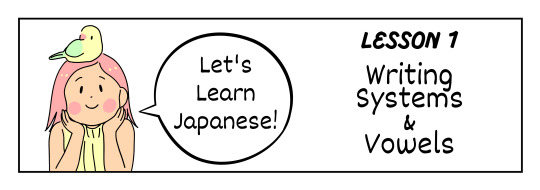
The first step in learning any new language is the alphabet. You cannot read or speak any language without knowing the alphabet. Did you know that the Japanese language has three alphabets? If you’re looking to start your language journey with Japanese, this post is a great place to start. Let’s learn Japanese! In Lesson 1, we will cover the three Japanese writing systems and vowels.
Why does the Japanese language have three different writing systems? Well, each alphabet has a different purpose. Hiragana is considered the “basic” alphabet in Japanese. Each symbol represents a specific sound, just like the English alphabet. You must master Hiragana before you can learn the other writing systems, Katakana and Kanji. Basic Hiragana contains 46 symbols. The first five symbols are vowels, which we will discuss later in this post. The other symbols are created by combining a consonant with a vowel.
Katakana contains the same sounds as Hiragana; however, the symbols look different than Hiragana. It contains 46 basic symbols too. Katakana is typically used to bring foreign words into the Japanese language. Because of this, it is not used very often.
The most difficult of all three writing systems is Kanji. Kanji uses a single symbol to represent a combination of sounds. These single symbols represent can represent a word, multiple words, or a concept. Something cool about Kanji is that, often times, the symbol looks like the word it represents. This is the Kanji for tree: 木 (See the tree?). Kanji contains over 50,000 symbols, but only 2,000 symbols are regularly used.
The sheer number of “letters” in Japanese to memorize might seem overwhelming. That’s why we’re starting with the very basics. Let’s learn the vowels in Hiragana. The five vowels in Hiragana are A, I, U, E, and O.
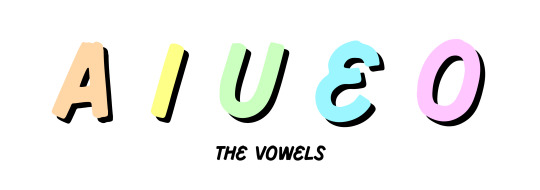
Notice: The Japanese vowels (A, I, U, E, O) are ordered different than English Vowels (A, E, I, O, U).
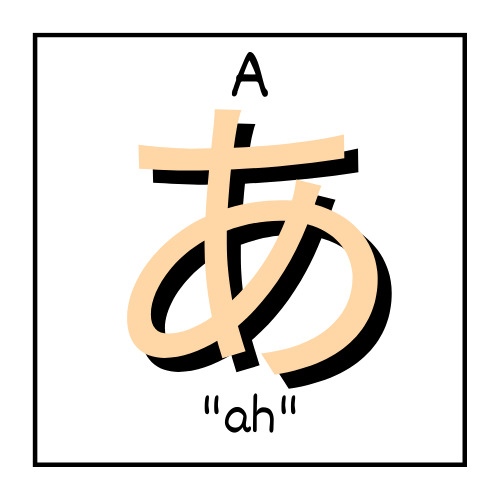
The first Hiragana vowel is A. Think about the pronunciation of apple. あ is pronounced “ah.”
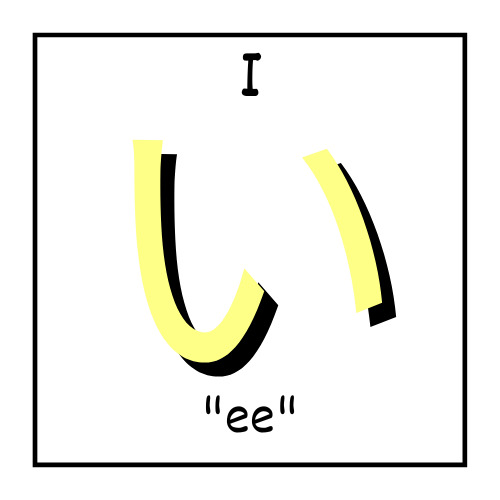
The next vowel is I. The Japanese I is not pronounced the same way as the English I. Think about the pronunciation of eagle. い is pronounced “ee.”
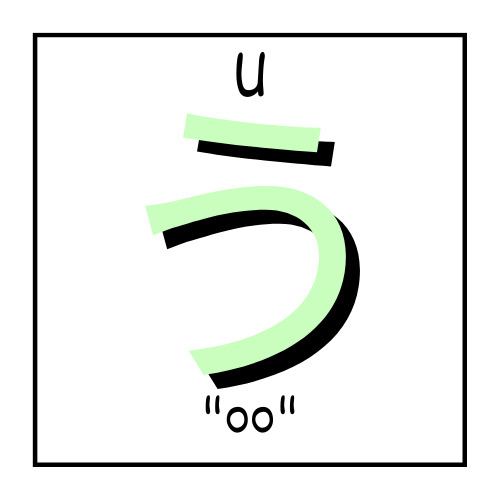
Just like い, U is pronounced a little differently than English. Think about the word woo. The double-o sound of “oo” represents う. However, when you pronounce う, it is the same length as a single vowel rather than two.
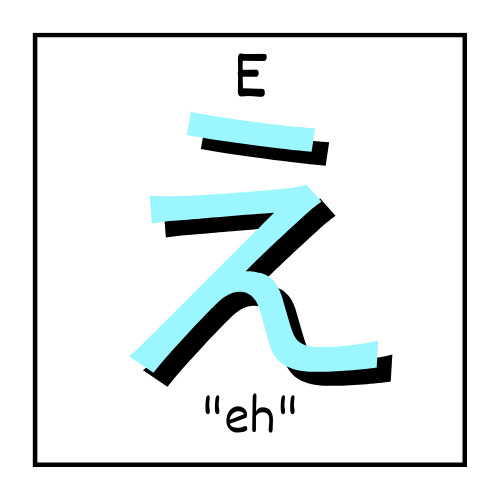
Our fourth Japanese vowel is E. To remember the pronunciation, I think about the word egg. え is pronounced “eh.”
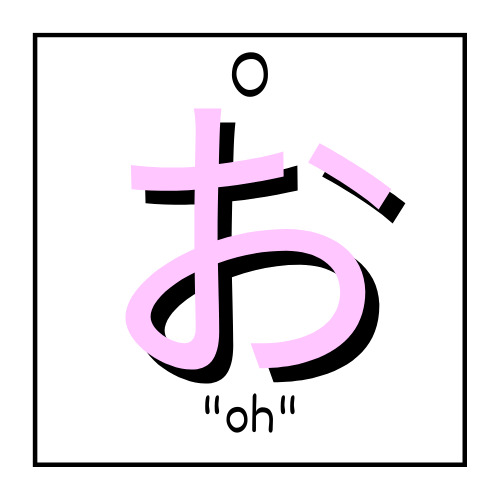
The final Japanese vowel is O. Think about how you say the word open. お is pronounced “oh.”
Practice is key to learning a new language. Say these vowels to yourself out loud each day until you have them down pat. Think you’ve got it? Test yourself! Match the Hiragana character with the correct English letter.
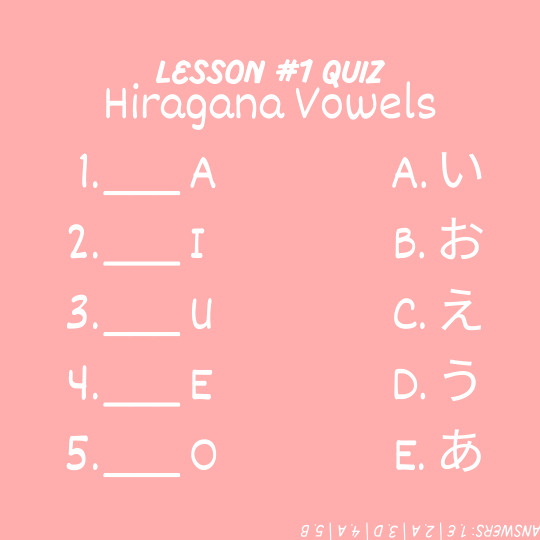
Good job! You’re on your way to speaking Japanese in no time.
Want to study more? Here are some helpful videos about the writing systems and Hiragana vowels:
How to Write Hiragana Vowels
Perfect Pronunciation of the 5 Hiragana Vowels
Hiragana Song
Another Hiragana Song
What is Hiragana, Katakana, and Kanji?
#language#languages#language learning#japanese#hiragana#learning japa#langblr#language blog#japaneseblr
18 notes
·
View notes
Text
Alrightttt, I’m on a roll so we’re going onto chappy five 🥳🥳🥳😎😎

I know the movies made the Capitol — re: basically only Effie and maybe Caesar — have those ridiculous made up accents but .... I actually feel like the description of the Capitol accent in the book is supposed to be like the Kardashians or Paris Hilton’s voice. 🤷🏼♀️
“Why do these people speak in such a high pitch? Why do their jaws barely open when they talk? Why do the ends of their sentences go up as if they're asking a question? Odd vowels, clipped words, and always a hiss on the letter s. no wonder it's impossible not to mimic them.” Like this is a pretty good description of how Kim Kardashian and her sisters talk. And Suzzy C did say she was inspired by the juxtaposition between war news footage and ridiculous reality television shows so... I think my theory of the Capitol all talking like they’re on the Real Housewives of LA is pretty valid.
Just imagine Paris Hilton as Effie and Nicole Richie as one of her preps
Lolololol this whole section of waxing is reminding me to go get my legs waxed 😭😭😭 straight up calling me out here, Suzanne
I like how Katniss says her stylist “apparently has no interest in seeing her until the prep team has addressed obvious problems.” Like you can tell from her narration she was expecting to feel the same was about Cinna that she does about Effie and her prep team.
The “gritty loam that takes off dirt and three layers of skin” is probably just a strong exfoliator 😭😭😭 my girl knows nothing about quality skincare 🤧🤧 someone build a Panem Sephora
She mentioned them waxing her underarms.... girl, did you have hairy armpits before this? Idk why this revelation is new to me
“Grease her down!” Just sounds wrong 😅😅😅😅 I need to stop being annoying omg I’m like a twelve year old
Hmm it’s funny to me that Katniss refers to Octavia as plump. You’d think in a place like the Capitol body image and weight would be very important. Unless it’s like back in the old, old days when being overweight was a sign of wealth. Which would make more sense so this was an unnecessary thought process curtesy of Samantha
Katniss faking a smile and thanking her prep team shows she does know how to play the game and fake it better than she says.
So ... okay, hear me out, I’m not trying to get over the top or make this into something it’s not but ... the whole stylists / Cinna coming into the room and staring at her naked is a little weird. Especially considering Cinna isn’t Lenny Kravitz who’s like a bit older than her but actually like a twenty-something year old dude.
But okay, here’s the thing I was getting at ... Cinna’s one of the best people in this series and you can’t deny that. Even if you find him boring, he’s still one of Katniss’ closest people. Also he’s probably gay. But like ... what about the other stylists? I don’t wanna be that person who makes everything more than it is, but like, this scene just sounds like a perfect opportunity for some Capitol creep to assault a teenager idk I’m probably making a mountain out of a molehill just ignore Samantha okay.
That’s nice that he complimented her mama though 🥰🥰🥰
So Katniss calls District Twelve the least desirable district but ... doesn’t District Eleven suck too? Like she also later says District Twelve is the smallest and the poorest but doesn’t she also say Rue is worse off than her and Prim? Make up your mind, Suz.
Cinna claims he asked for District Twelve but did he really get an option? 😅 If it’s his first year and Katniss claims the newbies get them anyway 🤷🏼♀️ Samantha is once again, reading too much into this.
Awww, Katniss is thinking about how long it would take for her to assemble this fancy meal at home 🤧🤧🤧 it would take her days and the Capitol just has the necessary resources at their disposal and they just takes it for granted. And yes, I’m aware this is supposed to be calling all us readers out who take so much for granted I know. We’re the Capitol.
“How would I spend the hours I now commit to combing the woods for sustenance if it were so easy to come by?” It’s honestly so sad but so vital to her character that Katniss has zero hobbies or real free time. Her life is about surviving. She doesn’t get to live or enjoy very much of her time. She dedicates everything to keeping Prim — and her mother — alive, sacrificing everything a teenage girl should be doing. Sacrificing even the things the other girls in her world get to do. She mentions the merchant girls and the Seam girls who are more experienced romantically and sexually and socially than her. Because she doesn’t get to be a kid or innocent or even happy, in order to focus on her and her family’s survival. And the things she does enjoy, like spending time with Gale or dancing with Prim (mentioned in Mockingjay) she downplays in case they’re taken away, because nothing good is secure in her eyes. 🥺🥺🥺
Okay but what did Katniss’ facial expression give away that Cinna knew exactly what she was thinking? Or is she just less emotionless than she and Haymitch both claim? Ironically I think they’re the only people who call her emotionless which can easily be chalked up to their self-hate and terrible self-esteems.
Katniss is so afraid they’re gonna make her be naked for the parade 😭. Honestly though they’re children that’s so creepy that they’re even allowed to make 15/16/17 year olds be naked in a parade. I mean I know they kill kids every year but isn’t there like child pornography laws in Panem? 😭
“You’re not afraid of fire, are you, Katniss?” Is so foreshadowing 😭😂😅😎 Caesar Flickerman’s voice “Katniss Everdeen, the girl on fire!”
Honestly though Cinna is smart to make Katniss recognizable in the arena by leaving her with simple makeup. I know and the sky is blue we all know this already beating the dead horses until the farmer comes home.
“It crosses my mind that Cinna's calm and normal demeanor masks a complete madman.” It’s true though 😅😅😅😭😭 he was always a rebel. I actually think he may have asked for District Twelve after Katniss volunteered, because he saw the potential in her. Poor Peeta. Baby, I’m rooting you for even if no one else is.
Also I always found it a bit .... curious? That Peeta had a female stylist and Katniss had a male one? Not just because of the required nudity, you’d just think men would do better as a boy’s stylist and a woman would make a better girl’s stylist. So yes, my whole Cinna was interested in District Twelve because Katniss seemed like a good symbol for a rebellion idea seems very plausible.
I know I know I know I read wayyy too much into this stuff sometimes a cigarette 🚬 is just a cigarette 🚬
Katniss being relieved when Peeta shows up 😭😭😭 because even if she won’t admit it and even if she won’t let herself trust him, she still sees him unconsciously and completely against her will as a comfort because they’re in this thing together in a way, even if they’re supposed to try and kill each other
And honestly, it’s such a like... relatable feeling? To feel alone and nervous and uptight and then someone who you recognize — even if you maybe aren’t even friends with but you at least know — shows up and you just instantly feel less alone. I’m totally looking at this through shipper goggles and I’m not even ashamed you all knew who’s blogging you were reading ight? 😂🤣🤷🏼♀️
“He should know about fire, being a baker's son and all.” And he’s gonna learn a lot more about it when he falls in love — for real, falls in love, not a childhood infatuation — with the girl on fire. 🥰🥰🥰
But also, I love this particular line on a reread because it totally is an indicator towards their future. Like Peeta knows about fire, he’s experienced with how to handle it, and later on, he becomes the only person who truly comes to understand Katniss, who represents fire, in a way that no one else could ever imagine.
Hmmm, Katniss’ point of view here, talking about how Portia and Peeta’s team seem all giddy and air-headed and it’s only Cinna who seems reserved makes me rethink my previous imaginings of Peeta’s stylist. Maybe she’s just a Capitolite idiot and nothing like Cinna. And my baby got a raw deal here then too. Good thing Haymitch loves him more. Just kidding 😅😅😅
But also I wanna know why Cinna is hesitant to accept congratulations for his and Portia’s idea? Wasn’t he at least lowkey excited about it when he pitched it a page ago?
Their horses are coal black 🐴 😅. I like that they went the whole nine yards with the theme. Nothing but the best for the kids on Death Row.
Aww Katniss asking Peeta what he thinks about being set on fire is so sweet and pure for some reason. I just find their commodore here cute ok
“I'll rip off your cape if you'll rip off mine” this is literally their first friend type of interaction and it’s so pure y’all leave me be I’m emotional for them
🙃 Also lowkey reminds me of “I’ll show you mine if you show me yours.” Everyone look away ok I’m sorry
Peeta’s shady/annoyed Haymitch comment and Katniss’ joke at his expense 🤣🤣😂🤣😂😂🥲🥲☺️🥲🥲 they’re bonding it’s so presh
“And suddenly we're both laughing.” I hope they laugh a lot together post-canon 🥲🥲🥲. If they can make the other laugh during their terrible circumstances, then they can make the other laugh anywhere. 🤧 Except in Thirteen because he’s hijacked and she’s certifiable and they’re both so used and abused and 🥺🥺🥺🥺
Okay I have to say, Suzanne Collins really builds up a lot for certain events and then just like grazes over the actual action of said event? Like she builds towards the tribute parade but then kind of rushes through off the actual event itself? It’s a common theme in her writing. And I don’t like it at all ngl.
Oh wait she doesn’t actually rush the parade events the paragraph before just looked like she was about to I jumped the gun 🤣😂🤭 but what I said is still completely true for many events in these books sorry not sorry
I’m definitely reading too much into it but the fact that District One — the favorite of the Capitol — gets snow white horses and District Twelve gets coal black horsies kind of ... seems to imply something .... 🤭
Cinna just lets out a sigh of relief “it worked” like ... way to fill your tributes with hope, dude. “Yeah, you’re totally safe, don’t be scared-OH THANK GOD THAT WORKED I wasn’t actually sure you wouldn’t blow up.” But actually this answers my previous inquiry about why he seemed hesitant I guess he wasn’t even sure this wouldn’t burn them up that’s nice 🤭🙃
It’s a literal trial by fire *cue drum hit* 🥁 aww, I just cracked myself up 😭
“Then he gently tucks a hand under my chin. "Remember, heads high. Smiles. They're going to love you!" This is caught halfway between being very Capitol-y and very father-brotherly and idk which way to take it but it’s kind of cute 🤭
“For the first time, I look at him and realize that ablaze with the fake flames, he is dazzling.” This is such a significant line because Katniss isn’t saying Peeta is technically good looking (like when Haymitch said they were decently attractive) or someone else thinks he’s good looking (i.e Gale, her mother and lowkey Finnick) but she’s saying she herself thinks he’s attractive. Girl, your crush is showing.
"I think he said for us to hold hands," says Peeta.” I’m sure Cinna actually did say that but this just seems like a very good opportunity for Peeta to hold the hand of the girl he has a massive crush on. 😭😭😭
Okay Cinna gave a thumbs up so he actually was saying that but can you imagine Peeta’s excitement right now?
I mean, yeahhhh, there’s the certain death looming over him too but like live in the moment, babe. 🥰😘🤗👌🏻
I like that Katniss says the crowd is at first like 😳😳😳 before they start cheering like they’re thinking “what are these backwoods, hillbilly kids doing this year?”
“At first, I'm frozen, but then I catch sight of us on a large television screen and am floored by how breathtaking we look. In the deepening twilight, the firelight illuminates our faces” okay they both have to be pretty naturally attractive people objectively, because you illuminate my face without much makeup and no one is gonna be cheering.
“Remember, heads high. Smiles. They're going to love you! I hear Cinna's voice in my head. I lift my chin a bit higher, put on my most winning smile, and wave with my free hand.” I wonder what the true difference is for Katniss between Cinna and Effie saying this to her? Maybe it’s that Effie is just outright mean to her sometimes whereas Cinna shows her nothing but kindness from the start and expresses sympathy and understanding? It’s probably that he’s already earning her trust versus Effie who’s just cruel I’m not over her comments on the train ok
“I'm glad now I have Peeta to clutch for balance, he is so steady, solid as a rock.” Right from the start, Katniss refers to Peeta as solid and steady. Idk, I feel like this is something that the movies really misses along the way. Katniss wasn’t always strong or confident at all and Peeta, at least publicly, exuded those qualities pretty well. Samantha’s complaining again ™️ 💁🏼♀️🤦🏼♀️
Also this is just outright foreshadowing how Peeta will eventually become her rock. Or that he will be soon painted a rock ... pick and choose which way you wanna go with this. 🤷🏼♀️💁🏼♀️😅🤣
“As I gain confidence, I actually blow a few kisses to the crowd.” Okay, see I feel like Peeta really gives Katniss confidence in herself. If he’d been there in District Thirteen and they’d done propos together, she probably would have been a thousand times better.
But also this makes me think Katniss actually has it in her to be a charismatic, confident, alluring celebrity. She just chooses not to. 🤗🤗🤗
But this also reminds me of “She has no idea the effect she can have” okay imma move on and stop focusing on every little detail
I say that every chapter 🤧😅
“The pounding music, the cheers, the admiration work their way into my blood, and I can't suppress my excitement.” Say whatever you want, Katniss is still such a girl underneath it all. She gets excited over people liking her and cheering her on. And I know it’s because it increases her chances of getting sponsors but still
Honestly Peeta trying to showcase Katniss and let her take the spotlight is so selfless and indicative of his ultimate plan to help her win but also ... I can see how Katniss would believe it’s too good to be true and he’s messing with her. That he’s just playing the game to earn her trust, get her guard down and manipulate her later.
See, Peeta is actually framed at the start like the typical, standard YA love interest turned villain. In majority of YA books, at this point the boy is kind and sweet and helpful to the girl until she trusts him completely and then he turns on her and uses everything she gave him to destroy her. But the difference is, Katniss refuses to truly trust him and she is guessing his game incorrectly at every step. And then it’s revealed that it was never a game and he truly isn’t messing with her and everything he’s done that’s seem too good to be true and not even remotely plausible has actually been genuine and heartfelt and that, my friends, is why Peeta is above all other YA love interests. Because Everlark is actually the foil to many of the cliches. That was a long speech over some incoherent thoughts I’m so sorry if you suffered through that.
“It's not until we enter the City Circle that I realize I must have completely stopped the circulation in Peeta's hand. That's how tightly I've been holding it.” Awww he is her rock 😭🤧🥺
"No, don't let go of me," he says. The firelight flickers off his blue eyes. "Please. I might fall out of this thing." Okay this part is so cute and so blatantly setting Peeta up as her main love interest omg 😅 this isn’t the least bit subtle or disguised. But first off, the fact that Katniss is also Peeta’s stability here too 😭😭😭 and second of all, she takes time to notice his blue eyes against the firelight? She was attracted to him from the very start, y’all. That’s indisputable. 👌🏻😎🤧
“It's not really fair to present us as a team and then lock us into the arena to kill each other.” I agree with you, baby, it’s not fair at all. But you two take care of that situation nicely. Or not. Y’all do start a dang war. 🤭🤭🙃🙃
It’s rather ... ironic that it’s District Twelve’s chariot of them all that is pulled up and stopped directly in front of President Snow’s mansion. I know it’s a book, certain details like this are definitively contrived, I know get over it. 🤦🏼♀️💁🏼♀️
So uh. Snow is a small thin man? Why do I suddenly imagine Danny Devito as Snow 😅😅😅😅🤣🤣🤣🤣 y’all know he’d kill the role
“The darker it becomes, the more difficult it is to take your eyes off our flickering.” Okay, this is such a great line and it’s so significant to the rest of the series? The fact that Katniss — and Peeta, let’s not forget our boy — became symbols of the revolution. Like this line is deep if you think about it. The worse things in Panem got, the more the civilians looked towards Katniss and Peeta for hope 🥺🥺🥺🥺🥰🥰🥰🥰
Omg now after Songbirds and Snakes, we know the national anthem. I’m sorry, babies, that you have to endure that I’ll get you out of there 🙉🙉🙉
I feel like in part, the Capitol camera crew — Cressida, Pollux .... Pollux’s brother... is that you here???? — put so much attention on District Twelve because it would create some resentment and competition between them and the careers 🤭🤗
“I notice a lot of the other tributes are shooting us dirty looks, which confirms what I've suspected, we've literally outshone them all.” Insert Gretchen Wieners “I can’t help that I’m popular!” 😅😅😅😅😅
“I realize I'm still glued to Peeta and force my stiff fingers to open. We both massage our hands.” — they were hanging on so tight 😭😭😭😭
“Thanks for keeping hold of me.” He’s so sweet ☺️☺️☺️ I love him even if he’s kind of an idiot sometimes but so is Katniss so let’s not point fingers
“I'm sure they didn't notice anything but you. [...] And then he gives me a smile that seems so genuinely sweet with just the right touch of shyness” Omg I know Katniss views this as him trying to manipulate her but the fact that he’s actually just admitting the way he’s felt for years is so 😭😭😭😭 if only you’d spit it out sooner, Bready
“he gives me a smile that seems so genuinely sweet with just the right touch of shyness that unexpected warmth rushes through me.” She literally has a crush on her fellow tribute and her first line of defense is to decide he out to get her for making her feel this way 🤣😭🙃
“The more likable he is, the more deadly he is.” The more my crush grows, the more deadly he becomes. I know I’m reading this with shipper goggles but guess what? I’m unashamed. 🤷🏼♀️🤷🏼♀️🤷🏼♀️🤷🏼♀️ who feels guilty for reading this book with an Everlark bias not this girl right here 🙋🏼♀️🙋🏼♀️🙋🏼♀️
“I stand on tiptoe and kiss his cheek. Right on his bruise.” Okay first off, she says cheek here but according to a chapter ago, she claimed the mark was on his jaw... so in other words, she’s incredibly short. If a medium height guy has a bruise on his jaw and she has to stand on her tip toe to reach it... well... hashtag LittleKatniss
And second off.... can you even imagine how Peeta must feel. He genuinely complimented her here, the girl he has had a crush on forever, and she responds by kissing his cheek. He was probably really happy at this moment. And also this probably played further into his buying into her false display in the arena. That here we have her clutching his hand, smiling and laughing with him and kissing his cheek. Idk what I was trying to say necessarily but I made myself sad wow way to go me 🥺🥺🥺🥺🤧🤧🤧
Anyways! Those are my very over the top and too detailed thoughts! Hope you enjoyed if you read this! 🤣🤣🤣🤣🤣🥳🥳🥳🥳🥳🥳🥳😎😎😎😎😎😎😎🥰🥰🥰🥰🥰🥰🥰🥰
#thgagain#once again the Jen gifs are still headlining these posts 🥳🥳🥳#this isn’t as funny as my others so I’m sorry y’all#but I like nice commentary on these posts makes me feel less alone so feel free
38 notes
·
View notes
Text
i watched the dallas theater company les mis and here are my observations part TWO
i recently watched a modern adaptation of les mis from 2014! i took hella notes bc les mis being set in modern day has a LOT MORE than you would think! i just posted my act one notes, so here are the ones from act two. enjoy! :D
ACT TWO
(Building The Barricade)
oh javert,,,you and your red beret-scarf combo
everyone shakes hands the same way?? they all like. half bro hug. young people ig 🤷♀️
oh on my own is gonna hurt me huh
éponine has her hands up when she goes to take the letter to cosette that’s an interesting take
jvj looks so done lmao “really bruh just give me the letter i’ll give it to cosette it’s FINE”
omg first time i’ve ever seen éponine not take the money after the letter!! that actually makes so much sense bc she doesn’t take marius’ money when he asks her to find cosette’s house either. that,,,yes that’s good
the modern era begs the question... why didn’t marius just ask for cosette’s number?? i’d assume it’s just a thing that jvj doesn’t allow her to have a phone bc The Cops, but. maybe marius and cosette are the straight version of cottagecore lesbians they just write letters for ~The Aesthetic~
(On My Own)
i was right on my own was gonna hurt me
first time i’ve ever seen an éponine disguise where she actually passes as a boy lmao
FINALLY A VERSION OF OMO WHERE ITS NOT JUST FORLORN SELF-CARESSING THANK YOU
surprisingly i have less notes here that’s fun i thought i’d have more
(Javert at the Barricades)
WOAHHHHH THEY DID NOT SKIMP ON BARRICADE SET PIECES THAT SHIT IS COOOOOL
oh the barricade scenes are already hitting too hard
cops are in riot gear cops. are in. riot gear.
oh the javert spy thing that also hits funny because obviously
gavroche is armed with a bat i love you son
FULL VERSION OF LITTLE PEOPLE AT THE BARRICADE AYEEEEE
(A Little Fall Of Rain)
wait hold on why is marius not,,,singing to éponine on “why have you come back here?” he’s like. scolding someone,,, huh??
oh enj goes to help marius with ép!! and he calls over who i assume would be joly i STAN
MARIUS CRIES AFTER ÉP DIES KILL MEEEE
(The First Attack)
i like how jvj does the second confrontation here. he looks less angry and more like,,,compassionate and that MAKES SENSE bc yk. he’s telling javert he’s wrong but he’s not doing it out of spite he’s doing it bc this guy NEEDS to know what he does as a cop and realize that being a cop isn’t just enforcing rules, and it never was just that.
i do love the exasperated “gO” from jvj that’s kinda great ngl
(Drink With Me)
i’m very sad that there won’t be any exr from these boys
v e r y sad here
i do see grantaire looking PRETTY sad though
bold of y’all to assume that the modern day amis would all be straight
okay i can tell that grantaire really is going hard on the Existential Singing like,,,sure he’s just standing there but like. damn bro
SO THERE A R E LADIES ON THE BARRICADE WHY TF ARENT THEY FIGHTING
BETTER SEE SOME CHANGE THERE
i just realized that the cockades are buttons that is the BEST
(Bring Him Home)
jvj actually looks kinda happy in BHH and tbh i kinda like it?? it’s only on the “he’s like the son i might have known” line but i like it
oh those vowels oh boy they TALL
(The Final Battle)
enjolras is for some reason, still angry...why...why bro....
the staging for gavroche’s death is INTERESTING bc he’s reaching up at the sniper on the tower. hm. i dont hate it
OH SOMEONE ON THE BARRICADE IS RECORDING I THINK!!! GOOD ADDITION!!
i can’t imagine how many blood packs they went through
oh enjolras’s death okay so. he’s in a like. No Man’s Land almost, and the riot cops come in after him. it’s an interesting take because it almost mirrors the scene in the book, except obvs grantaire isn’t here. they also have an added scene after he dies where cops are checking out and using radios that is. that is EERIE.
jvj walks over to enjolras’s body 🥺
HE ALSO FUCKIN S C R E A M S WHEN HE SEES MARIUS ON THE GROUND GODDAMN MAN O U C H
thenardier steals combeferre’s glasses wow thanks for that added pain
thenardier and jvj have a mini fight oh that’s kinda cool hm
(Javert’s Soliliquy)
javert opens his soliloquy with some SPICY SADNESS OH B O Y he sounds broken already!! start strong!!
emotions go broken - anger - confusion? - mAJOR confusion - hopelessness
javert can FLY! no legit he’s on ropes
(Turning)
turning is. turning is almost a funeral.
OH THEYRE N U N S !
nuns are visiting the barricade 🥺
OH DAMN “what’s the use of praying if there’s nobody who hears?” THAT CERTAINLY HAS WEIGHT NOW THAT THEY ARE N U N S
it has just occurred to me that people have been dead on the floor for like. a solid five minutes
(Empty Chairs At Empty Tables)
“now my friends. are dead. and gone” he pauses like he’s realizing it just then oh OUCHIE
wait is marius,,,at the barricades? is he legit singing to his friends dead bodies? oh shit oh NO
OH N O OH NONONO THIS IS WORSE
THE BARRICADE BOYS RISE UP FROM THE FLOOR OH N O OUCH OUCH
they group up and salute him and wALK OFF NO OWWWW
*cosette and marius kiss* jvj: *COUGH COUGH*
marius and valjean’s lil conversation is interesting in the way valjean seems to ask marius “who am i?” rather than ask himself. he phrases it in a way that makes me think he’s like. quizzing marius lmao
(The Wedding)
omg i think baby cosette and éponine are flower girls 🥺🥺
“go away thenardier” *madame mouths ‘dammit!’*
thenardier your boat shoes hurt me
madame: “get up! get up!” thenardier: “stop—STOP IT!”
TWO GUYS ARE DANCING TOGETHER AND WAVE AT THENARDIER ON “this ones a queer, but what can you do”
yeah i think i found my new favorite thenardiers thank you dallas theater company
fantine sits on the bench when cosette comes by, cosette sits on bench next to her, and fantine tries to touch her but can’t 🥺
jvj just gave a hand-over-heart head nod to cosette but fantine gave it back i,,,ouch
ENJOLRAS AND GAVROCHE ARE WITH FANTINE AND ÉPONINE FOR JVJ’S DEATH
the chain gang is in the epilogue i repeat the cHAIN GANG IS IN THE EPILOGUE
the orchestra rests on the last “say do you hear the distant drums” and that was the coolest thing i’ve ever heard
that final harmony is MONEYYYY and i want to cry
OVERALL NOTES:
this javert has the most interesting interpretation because up until his FINAL SCENE he is the stone cold police officer, and he plays it SO WELL. like i have never been truly angry at a javert up until this guy, and whether that was because it was modern and resonates A LOT in 2020 or he just looks like a cop i want to punch, I DON’T KNOW but he plays it SO WELL and i love it so much!!
these thenardiers are the fucking BEST NGL they are the perfect mix of funny and cruel. madame t is also funny as HELL and i wish i had her talent lmao
i said it before but the police costumes in this show are. woosh. kudos to the costumer i took one look at those guys and was like “haha, no!.” vaguely related to that, i think this was the first time i nearly cried at Look Down like. the first song at the show, simply because of the convict getting the SHIT beat out of him on the floor. that hurt me and i hate that it is completely accurate to what happens in prisons today.
lovely ladies was,,,a LOT and tbh, i feel like it didn’t need to be. obviously it does show how horrible it is for sex workers, but that is why the music is there. the music and lyrics is there to tell what you don’t show visually. (though i do love the male prostitute lmao he took no shit)
i also said this before but the fact that there wasn’t bigger of a relationship between enjolras and grantaire kind of annoys me simply because they are revolutionaries in the present day. you can’t tell me that ALL OF THEM WERE STRAIGHT. with how many people i know now that identify under the queer and trans umbrella, and also how queer they are (to me) in the brick, the absence of any exr in a modern interpretation hurts a little.
in conclusion, this show was fucking FANTASTIC and even though i’m six years late, it still resonates hard given the time we live in today. i think i nearly screamed when i saw the cops in riot gear on the barricade because that is LITERALLY HAPPENING RIGHT NOW. this just reminds me how timeless the story of les mis is because you had to change LITERALLY NOTHING from the story to make it make sense in the modern age, and that is really the lesson you should learn from les mis; these things happen everywhere, and they need to be fixed.
thank you for listening to my rambling, i am sure i forgot something because there was just so damn much but i hope you enjoyed otherwise! not-a christmas-tree out! :)
#les mis#les miserables#les amis#les amis de l'abc#dallas theater company#jean valjean#javert#fantine#cosette#marius#enjolras#grantaire
62 notes
·
View notes
Text
Transcript Episode 44: Schwa, the most versatile English vowel
This is a transcript for Lingthusiasm Episode 44: Schwa, the most versatile English vowel. It’s been lightly edited for readability. Listen to the episode here or wherever you get your podcasts. Links to studies mentioned and further reading can be found on the Episode 44 show notes page.
[Music]
Lauren: Welcome to Lingthusiasm, a podcast that’s enthusiastic about linguistics! I’m Lauren Gawne.
Gretchen: I’m Gretchen McCulloch. Today, we’re getting enthusiastic about schwa and stress. First, we made our LingComm grant goal! We’re now giving out three grants to linguistics communication projects. The deadline for those applications is the 1st of June wherever you are, which is very soon, so make sure to get those applications in. That’s 2020, in case you’re listening from the future.
Lauren: We’re actually giving out four. We are giving out more than we originally planned, thanks to Claire Bowern funding a fourth LingComm grant on a project that looks at minoritised languages.
Gretchen: Those grant applications are due on June 1st, 2020. If you’re interested in applying for that, go to the website lingcomm.org. That’s “comm” with two Ms. You’ll see all the details there.
Lauren: If you’re listening to this deep in the future, you can go to lingcomm.org to see what great projects we funded.
Gretchen: Indeed you can.
Lauren: We now have new Lingthusiasm merch. We have little badges for you to wear through Redbubble, which is really exciting. They’re super cute.
Gretchen: Interesting! I think I would call those “pins” or maybe “buttons.” Whatever you call them, they are round circular things that you can pin on your clothes or backpacks that say fun linguistics things on them.
Lauren: Hm. I’d call them “button badges” as well.
Gretchen: I think “buttons” is kind of ambiguous because you don’t know if that’s a kind of button you use that you sew into your clothing or that you pin into your clothing. Maybe I like “pins”? Anyway, you can get these at lingthusiasm.com/merch along with more sticker designs and other Lingthusiasm merch like scarves with the International Phonetic Alphabet on them and other fun things like that.
Lauren: This month’s Patreon bonus episode is about numbers. We look at different counting systems, different number systems, and what using your fingers to count says about you. You can get access to this and 38 other bonus episodes at patreon.com/lingthusiasm.
[Music]
Gretchen: Okay. I have a puzzle for us.
Lauren: Awesome. I love a puzzle.
Gretchen: I’m gonna give you a few words, then you can tell me what they have in common. Our words are “about.”
Lauren: “About.”
Gretchen: “Broken.”
Lauren: “Broken.”
Gretchen: And “council.”
Lauren: “Council.”
Gretchen: Any thoughts for what they have in common?
Lauren: My immediate thought was I’m sad we don’t have Lingthusiasm think time music.
Gretchen: We do have theme music. Maybe we could play it a bit again.
Lauren: Hm. Ah. “About, broken, council” – they all start with different letters. They all have different letters in them. I’m assuming it’s not something about what they mean. They’re all two syllables long.
Gretchen: That’s true. I should give you a couple more examples that also have this thing in common to see if that helps.
Lauren: Okay.
Gretchen: We have “about, broken, council, potato,” and “support.”
Lauren: Oh, “potato.” The goes my two-syllable theory. Definitely nothing semantic about their meaning. They still all have completely different letters. You’ve actually made it harder with more data, Gretchen. Harder. That’s not useful.
Gretchen: The thing we wanna think about is not just what letters are in them but what sounds are in them.
Lauren: Right.
Gretchen: Is there any sound that all five of these words have in common?
Lauren: If I look at the spelling, they all have completely different vowels. They don’t even have the same vowels. But if I listen to how they’re spoken, think about “about, broken,” and “council,” [Gasp] “potato,” and “support,” they all have schwa.
Gretchen: They all have schwa, which I know is your favourite vowel. I have created this quiz just for you.
Lauren: Excellent. Thank you so much. They all have this /ə/ sound. It’s the coolest little letter that doesn’t exist as a written letter in English. It’s one of the coolest sounds in English. I love it. We’re doing a whole episode. It’s schwa time.
Gretchen: It’s schwa time. So, /əbɑʊt/ has that /ə/ in the first syllable. /bɹoʊkən/ has that /ə/ in the second syllable. /kɑʊnsəl/ has that /ə/ there – /pətɛɪtoʊ/ /səpoɹt/. There’s the /ə/ going all the way through. Here’s your second quiz. There’s a special thing about this particular set of five words. They all have schwa in them, but they all have something else that’s different about them.
Lauren: They’re all spelt with the actual different vowels. When I learnt that schwa was the sound that hid across all of the vowels – it doesn’t matter what one you write, if it’s in an unstressed syllable, and we’ll talk about that, it becomes a schwa – it explained to me why I find writing some words so difficult. If you don’t know how to spell “potato” and someone says /pətɛɪtoʊ/, that could be a P-A, that could be a P-U. It’s really hard to tell. But all of those are written with different vowels but sound the same in speech.
Gretchen: Yeah! You get words like /dɛfənɪtli/, which was one of these words that I didn’t know how to spell for the longest time. It would give me this red underline and I was like, “Why? This looks totally reasonable to me!” Then, I had to learn that the schwa – /dɛfənɪtli/ – the schwa there wasn’t spelled with an A, it was spelled with an I. You really can’t tell in English because every single vowel letter can represent this particular vowel sound, which is really frustrating when you’re a kid learning how to spell and yet is really cool when you’re a linguist because it’s one of these mysterious things that once you notice it, it’s everywhere. Yet, you can go your whole life without noticing it.
Lauren: We talked about all the vowels back in Episode 17 with vowel gymnastics and how, unlike consonants, vowels exist in this space and they all shift around like a multi-dimensional slide trombone. I guess that’s why we went with “gymnastics” as an analogy instead of “multi-dimensional trombones.”
Gretchen: I mean, if someone wants to design a multi-dimensional trombone for me, I’ll take it.
Lauren: We talked a teeny bit about schwa in that episode, but I have been wanting to do an episode all about schwa for ages. Here we are. Exciting times.
Gretchen: I think we should also mention what schwa looks like when it’s written in the International Phonetic Alphabet because it is part of your icon or your whole icon on various different websites, is it not?
Lauren: Yes. If you’ve ever seen the upside-down E looking thing that is the Superlinguo logo, that is the sch – so schwa is interesting in that it has a name. It also has, like all of the vowels, a representation in the International Phonetic Alphabet. That representation looks like an upside-down E. I’m not normally one of these people that has lots of opinions about fonts, but when it comes to how it’s written, it is not an upside-down E. This is something I’m very fussy about.
Gretchen: What is the difference between a schwa and an upside-down lowercase E? Please tell the class because I don’t know.
Lauren: If you turn it back up the other way, it looks really unproportioned. It’s like the top of the E is just way too high up. It looks all weirdly stretched.
Gretchen: So, the thicknesses of the letters and so on are weirdly stretched? Is that the thing?
Lauren: Yeah. The height of that little loopy bit of the E, if you turn it back the other way and try and use it as an E, looks a bit – it just makes it look like the E is gonna fall over. It’s really wobbly.
Gretchen: Okay. I feel like we need to point this out that you know this because you made schwa cookie cutters.
Lauren: Yes. I designed and 3-D printed a schwa cookie cutter a few years ago for Christmas gingerbread.
Gretchen: Then, a very helpful person on the internet said, “Couldn’t you just have used an E cookie cutter and turned the cookies upside-down?” and you were like, “No, no, no, because the thickness is different.”
Lauren: No. You absolutely cannot.
Gretchen: I feel like, historically speaking, it probably was an upside-down E though because I know a lot of the IPA symbols are upside-down versions or rotated versions of existing letters because that way they didn’t have to typeset new letters back in the metal printing days. But I believe you that, now that we have digital formats, schwa can have slightly different line thicknesses.
Lauren: Yes. It has its own representation. It has a name that not many other vowels have names. Technically, it’s a mid-central vowel, which just means it’s just in the centre. It’s not high. It’s not low. It’s not front. It’s not back. It’s not any of these dimensions that we talk about. It’s just the most /ə/ vowel that exists, which is why everything ends up going towards it when it’s not stressed because it’s the least exciting thing to do with your mouth. There’s actually a Wikipedia entry for the mid-central vowel – that /ə/ vowel – but schwa is so iconic there’s also a separate Wikipedia page just to talk about it as “schwa.” This is how strong its brand is.
Gretchen: Schwa’s brand is strong. Especially for the vowels, normally if we talk about vowels, we talk about /i/ or /ɛ/ or /ʊ/. You just say the name of the vowel – or sometimes people say the name of the symbol. Like, “small cap I” or –
Lauren: “Open O.”
Gretchen: “Open O” or something like this. Schwa has got this name that doesn’t refer to the shape of its symbol, it’s got its own name. The thing that’s always tormented me about the name “schwa” is, like, it’s a cool name. I will grant you this. But it doesn’t have schwa itself in the name.
Lauren: This is true and very disappointing.
Gretchen: Other symbols, like “theta” – /θɛɪtʌ/ has a theta in it. Great. We’re doing a great job. Good job, theta. Schwa does not have a schwa in it, and I find that kind of disappointing.
Lauren: Disappointing.
Gretchen: However, I looked up the history of the name “schwa.” Apparently, “schwa” used to have a schwa in it and then it stopped, which I now think is even better. The word “schwa” is from the Hebrew /ʃva/ for which the classical pronunciation was apparently /ʃəwa/.
Lauren: Ah, so before modern Hebrew, it had a schwa in it. It was like /ʃəwa/?
Gretchen: Exactly. /ʃwa/, /ʃəwa/ – maybe we should start calling it /ʃəwa/ because then it would have a /ʃəwa/ in it.
Lauren: Amazing. I think one of the things I like about the name of schwa is that the name itself encapsulates its history.
Gretchen: Yeah. Initially /ʃva/ or /ʃəwa/ is the name of one of the sets of dots that indicates this sound – because Hebrew writing, along with Arabic, are normally written with just the consonants. Then, if you want to indicate what the vowels are, you can add these extra little dots and bits above and below the consonants which, most of the time, aren’t used but are sometimes used for children or for contexts where you wanna be super precise. One of the names of these sets of dots indicating the vowels is /ʃəwa/, which was used to indicate either the /ə/ sound, the schwa sound itself, or /ɛɪ/, which in most languages the /ɛɪ/ sound is written with what English calls a letter E. If you think of the /ɛː/ as in /kæfɛɪ/ or /foɹtɛɪ/, those Es are that /ɛɪ/ sound. This kind of explains to me why it’s an upside-down E and not an upside-down literally any other vowel because every vowel letter can become a schwa sound because in this origin it could be used for either one of these two sounds.
Lauren: Nifty. Even though it’s pronounced /ʃva/ in modern Hebrew, the spelling of “schwa” itself is actually from the German spelling for it. I think this was one of the reasons I like the name “schwa” is that it encapsulates its history being borrowed from Hebrew orthography. Then, in the 19th Century, a lot of German linguists used it for that sound. That S-C-H spelling is the German spelling rather than any other language. Most satisfyingly, it was first used by a guy called Schmeller who has his name spelt S-C-H as well.
Gretchen: Johann Andreas Schmeller, who also used the schwa. Maybe that’s why he liked it.
Lauren: It became big in the 19th Century and definitely by the end of the 19th Century/Early 20th Century it was being used in texts to represent that sound.
Gretchen: Schwa is also very common in German. A lot of words that end in E in German have that E pronounced as a schwa. The name what in English would be Gabe – the German name /gaːbə/ – that /ə/ at the end is also a schwa.
Lauren: It definitely pops up in a lot of languages because it’s quite efficient.
Gretchen: You also get this optional schwa sound with Es at the end of the word in French. You can have /lɔ̃ːg/ but also /lɔ̃ːgə/, which is the word for “long.” There’s an E there that can be optionally pronounced. When it is pronounced, it’s pronounced kind of like schwa. This gets to something interesting because German and French have these schwas that are spelled with the letter E at the end of a lot of their words. English, instead, has these completely silent Es at the end of a lot of its words.
Lauren: The bane of all children learning to read in English – the silent E.
Gretchen: Oooh, “bane.” There’s an example! Words like “bane” and “fame” and “fine” and “bone” and “meme” – that one is not one that I learned when I was in Grade 4 spelling class. There’re all these words that end in silent E in English. The rule that I learned when I was in Grade 5 spelling class was the silent E makes the vowel say its own name.
Lauren: Oh, I like that. I never learnt that. That’s very handy, trying to get your head around the rules of reading English.
Gretchen: Yeah. It’s really nice.
Lauren: I’m really jealous that I never learnt that very efficient way of thinking about what E was doing.
Gretchen: But it’s a rule that’s kind of unsatisfying to me as a linguist now because why should adding an extra vowel to the end of the word change how the vowel in the middle of the word is being pronounced? That’s something that I found unsatisfying as a budding linguist. What sort of process is that?
Lauren: I am going – I mean, I know the answer. But if I had not known the answer, I would’ve taken a wild guess at it being retrospectively attempting to make sense of a historical process by pretending that there’s some kind of reason for it.
Gretchen: I mean, that’s not not what’s going on.
Lauren: The reason why they had to retrospectively come up with this rule is because the E used to be pronounced. It used to be pronounced as our friend schwa. They weren’t just one syllable words. The were two syllable words. It was /banə/ – “bane” – and /famə/ and /hamə/.
Gretchen: Oh, so the schwa actually used to be pronounced there. You’d get, instead of “fine,” like /fɪnə/. Instead of “fame,” /famə/. Instead of “home,” /hoʊmə/ or something like that.
Lauren: Yes. You had two syllables instead of one syllable that we have now for “fine,” “fame,” “home.” Those syllables started with a consonant, ended with a vowel. Then, over time, that schwa comes off at the end. It’s not as easy to always pronounce it – a bit like with the French example. In French at the moment, you can pronounce it, or you don’t have to. It’s starting to erode away at the end of a word. That was the process that happened in English.
Gretchen: Right. This is really interesting because in English and in other Germanic languages as well there’s a difference between the kinds of vowels that you can have in a syllable where there’s a consonant at the end and in a syllable where there isn’t. We have English words “hid” and “hide,” which have /ɪ/ and /ɑɪ/ in them both between H and D. But there’s a word like “hi,” but there isn’t a word in English /hɪ/ or /fɪ/ or /kɪ/ or /mɪ/ even though all of these can be perfectly good as long as there’s another consonant in them.
Lauren: This is where the rules of English syllables interact with the rules of what sounds can go into them. We used to have two syllables in words like “fine” and “fame,” and now we have one. That little E sits there to remind us as a written fossil even though we don’t pronounce it anymore.
Gretchen: It reminds us that the vowel that’s in this first syllable, which is now the only syllable, is the kind that can exist without a consonant after it. Because we can have a word like /hɑɪ/ and not a word like /hɪ/, if there’s that E at the end – you have /hɑɪd/ or something – then that reminds us – and by “us” I mean people who know this history, which is not most modern contemporary English speakers – that this is the kind of word that has the vowel that can exist in open syllables.
Lauren: For the rest of us, it’s just a handy way to spell properly.
Gretchen: There was a special reason why it was schwa that was so easily lost at the end of all of these words like “fine” and “home” and “hide.” That’s because schwa is what’s known as a “reduced vowel.” It’s physically produced for a shorter amount of time than a full vowel like /ɑɪ/ or /i/ or even /ɪ/.
Lauren: It’s what allows us to just sneak it in really quickly in syllables that we’re not really focusing on.
Gretchen: If we produce some syllables faster or quieter than other ones, those faster or quieter symbols tend to also have schwas.
Lauren: This is why schwa crops up in all of these words regardless of what vowel they’re spelt with. I’m pretty sure Lauren who really struggled to spell words because she couldn’t distinguish the vowel because it was being pronounced with schwa when she was learning to spell would’ve said, “Why don’t we just spell all the words with schwa and be done with it?” That wouldn’t be the most practical solution.
Gretchen: The problem is, if we respell English to be consistent and every time we say schwa we write schwa, it works in the short term because we have this transparent relationship between the sound and spelling, which is nice. But the annoying thing – this fact that you can write any English vowel letter for the sound schwa – is also a fact about the structure of English. There are all these words that are related to each other where we can see that relationship more clearly based on the spelling than we can sometimes with the pronunciation. The spelling can help us notice when words are related to each other. If we take up a word pair like “acid” and “acidity” –
Lauren: “Acid” and “acidity.” Well, that -ity bit on the end of “acid” that turns it into “acidity” also changes the vowel to a schwa.
Gretchen: Yeah. /æsɪd/ and /əsɪdəti/ – in the first one we have /æ/ as the first vowel and in the second one we have /ə/. Yet, it still seems pretty intuitive that these words are related to each other. It’s just that when we do have this -ity on the end, we pronounce the main word – instead of /æsɪd/, we say /əsɪd/.
Lauren: It would be inconvenient in the even medium turn to lose the relationship between, say, “courage” and “courageous” just because we have that -ous on the end of “courageous.”
Gretchen: It’s the same thing there. /kʌɹəd͡ʒ/ – the second syllable -age, there’s a schwa. But /kʌɹɛɪd͡ʒəs/ – now there’s a different vowel there. It’s just because we’ve added the -ous on the end. Yet, it’s nice that these two words that are very clearly related to each other still look the same.
Lauren: I guess it’s particularly true as well of those word pairs in English that only differ because of stress. Like /ˈɹɛˌkəɹd/ and /ˌɹəˈkoɹd/ – only different because of stress. Then, we’d be spelling them differently because each one has a schwa in the opposite place.
Gretchen: /ˈɹɛˌkəɹd/ – the schwa is in the /-əɹd/. /ˌɹəˈkoɹd/ – your schwa is in the /ɹə-/. You’d have to /ʃwap/ the – swap the [stutters] /ʃwaz/ – /ʃwap/ the /ʃwʌz/? Wow. That’s really hard to say. Swap the schwas. You wouldn’t know what vowel to recover from the syllable once you started stressing it. It’s the same thing with -ity and -ous. When you make “acid” into “acidity” and “courage” into “courageous,” instead of stressing the /æ/ and the /kəɹ/, you’re stressing the /ɪd/ and the /æd͡ʒ/, if you will.
Lauren: Adding the extra bit to the word shifts where the stress is.
Gretchen: It’s these unstressed syllables where schwa – not every unstressed syllable in English is a schwa, but a heck of a lot of them are.
Lauren: I think we’ll keep the spelling system as it is.
Gretchen: This was something that always used to come up for me back when I used to teach Intro to Linguistics. People would be trying to write things in the International Phonetic Alphabet for the very first time, so they’d go through each word, and they’d say it really slowly and carefully. What that would mean is that instead of saying /əsɪdəti/, they’d say something like /æsɪdɪti/. Okay. Or, instead of saying /kʌɹəd͡ʒ/, /kʌɹɛɪd͡ʒəs/, they’d have /kʌɹɛɪd͡ʒʌs/, /kʌɹɹɛd͡ʒ/.
Lauren: They’ve gone back to stressing every syllable, so the schwas evaporate.
Gretchen: Right! They’d write these words and they’d have no schwas in them all over the place. You’d have to say, “You can say this word like this -- if you’re really saying it slowly and carefully, and you were saying each syllable at once maybe to help someone spell it, you do have the full vowel there some level,” psychologically, for a lot of people, especially because of the spelling that’s influencing you to tell you it’s there. But in normal speech at a regular pace, most of the time you do say schwas a lot. It’s an interesting tension where many of our schwas actually represent a sound that we could recover if you say the word slowly and carefully enough, which is also a reason to keep the spelling where it is because there is some psychological reality to the non-schwa version as well.
Lauren: This discussion is very English-focused, I should say, because it’s something that English seems to do in particular in terms of having this kind of stress and this reducing to schwa on unstressed syllables. In fact, it’s a fairly prominent feature of the English accent. I imagine it’s something that gets transferred when English speakers are learning to speak other languages. It’s probably the closest I’ve come to having the ability to understand what the English accent in other languages must sound like to native speakers of those languages. They must just think that we’re failing to hear vowels all over the place.
Gretchen: “Why do all of your vowels become the same vowel?” I think the inverse is also the case is that it’s one of the trickiest things for people who are learning English from a language that doesn’t do this, which is most of them, to do is be constantly trying to hit this vowel that I don’t even have. “Don’t you want your vowels to all be very distinct from each other?” Schwa or not schwa is this very English thing. The stress part about it being very important which syllable’s stressed and which part of which word is stressed – that’s also a very English thing. I find the most interesting place to notice how important stress is in English is when it comes to poetry.
Lauren: Sure. Because a lot of poetry relies on having certain numbers of syllables. Using stress is one way to explore the rhythm of a poem or a poetic construction.
Gretchen: Right. Some of the oldest English Mother Goose rhymes, nursery rhymes, have a consistent number of stressed bits per line rather than a consistent number of syllables. If you have something like “Hickory dickory dock, the mouse ran up the clock.” There’s three stress bits per line, but the number of syllables is quite different. The same thing with limericks in English, it’s not that there’s the same number of syllables in each line, it’s that the stress pattern is you have to have three stressed syllables, three stressed syllables, two stress, two stress, three stress. You can do that with a varying number of actual syllables in it. Something like, “There once was a man from Nantucket,” three stresses – “once,” “man,” “tuck.” Nine syllables. But “A tutor who tooted the flute,” also three stress – “tu,” “too,” “flute.” That’s eight syllables. And “A wonderful bird is the pelican,” ten syllables but still three stresses.
Lauren: It’s funny. My brain is so tuned to listening to the stress in these, I actually found it hard to count the syllables as you were going because I was so tuned into the limerick structure of stress.
Gretchen: A lot of very English-y poetry styles, as long as you get the stress right, you can really mess with the syllables because English pays a lot of attention to the stress. Whereas, in French, they don’t have this individual, unpredictable stress at the word level the way English does at all. There’s no /ˈɹɛˌkəɹd/ versus /ˌɹəˈkoɹd/ in French. Everything just gets a bit of stress at the end of the phrase or sentence or utterance or whatever you’re saying. You might say something like “Bonjour,” but you could also say, “Bonjour, comment ça va?” and you just stress the “jour” or the “va.” You don’t have to go anywhere in between and stress anything else. This means that French poetry can’t do this stress counting thing because there’s no stresses for them to count.
Lauren: Ah. Normally, I spend a lot of time going, “Oh, poor English speakers. They’re missing out.” But poor French speakers! They’re missing out on limericks.
Gretchen: I really don’t know how you do a limerick in French. I think you’d have to pick a number of syllables that is approximately equivalent and just do that.
Lauren: We talked about this schwa-syllable relationship being very English-focused for this episode, but it’s not the only language in which schwa appears and is a little bit easy to drop once you have reduced the pronunciation of schwa. French was one example you had. In Indo-Aryan languages as well – these are the languages of the same Into-European family as English but they’re over on the Indian subcontinent, so Hindi. I know about this because I had to learn Nepali. They have schwa as a vowel. A bit like the Hebrew writing system, for this vowel in particular, they just don’t write it down. You have to know when to pronounce this vowel by memorising. For some languages in the family it’s just gone altogether. It’s another example of how schwa in some languages can be really eroded. But not in all languages.
Gretchen: This is actually true in Miꞌkmaq as well, which is an Algonquian language spoken in Eastern Canada. In their writing system they use the apostrophe to represent the schwa sound, but the apostrophe is only added when the schwa is quote-unquote “unpredictable.” If you can predict the schwa, then you just put in the schwa where you know it’s supposed to go because as a speaker you say it. Of course, I am not very good – I don’t speak Miꞌkmaq so I’m not particularly good at predicting where it goes.
Lauren: Unpredictable schwa is almost cooler than unstressed schwa.
Gretchen: You can kind of predict it. Speakers actually know how to do it properly, but it’s not always represented in the writing system which is, I guess, something it has in common with Nepali.
Lauren: Schwa has so many cheeky personalities.
Gretchen: Schwa also shows up in English – speaking of being cheeky – as the vowel sound that people end up producing, if you’re an English speaker, when you’re trying not to make any vowel sound at all. If you’re trying to say the sound that the letter B makes, but you don’t wanna say B, you just wanna say that sound by itself, you probably end up with /bə/, which is still a vowel, it’s just schwa. Because that’s the least vowel you can make.
Lauren: Just adding a little bit so you can get that /bə/ across.
Gretchen: Yeah. It also shows up sometimes in people’s names. I knew somebody called /ksɛnjə/ and a lot of English speakers couldn’t pronounce that /ksə/, the KS, at the beginning of her name, so a lot of people ended up saying /kəsɛnjə/ by inserting a little schwa between because that was how they were able to keep both the K and the S.
Lauren: Very handy. Although, I like unpredictable schwa in Miꞌkmaq, one of the best things about schwa popping up in the particular context of unstressed syllables in English means that schwa is set up for being just a really great source of jokes because, when it comes to English, schwa is never stressed. I think that’s a life motto we can all get behind.
Gretchen: This means that there are people who’ve made t-shirts saying, “I want to be a schwa, it’s never stressed.”
Lauren: There’s a great photo from Sandy Abuadas who has made cookies for her students with schwa on them so that her students’ finals will be stressless.
Gretchen: I love it! It’s so good.
Lauren: It was very cute.
Gretchen: I think the stress part – in the technical sense, there’s this very tempting pun with the stress part in the vernacular sense.
Lauren: I think because it’s a sound that is everywhere and ubiquitous but, until you study linguistics, you don’t know that it is all around you. Not only is it around you, but it has its own symbol and it has its own name. I think that’s why it’s a classic linguist iconography to have fun with.
Gretchen: I hope that learning about schwa has not been stressful!
[Music]
Lauren: For more Lingthusiasm and links to all the things mentioned in this episode, go to lingthusiasm.com. You can listen to us on Apple Podcasts, Google Podcasts, Spotify, SoundCloud, or wherever else you get your podcasts. You can follow @Lingthusiasm on Twitter, Facebook, Instagram, and Tumblr. You can get IPA scarves, IPA ties, and other Lingthusiasm merch at lingthusiasm.com/merch. I tweet and blog as Superlinguo.
Gretchen: I can be found at @GretchenAMcC on Twitter, my blog is AllThingsLinguistic.com, and my book about internet language is called Because Internet. Have you listened to all the Lingthusiasm episodes and you wish there were more? You can get access to over 30 bonus episodes to listen to right now at patreon.com/lingthusiasm or follow the links from our website. Patrons also get access to our Discord chatroom to talk with other linguistics fans and other rewards. Recent bonus episodes include synaesthesia, numbers, teaching linguistics, and a robo-generated episode of Lingthusiasm. Can’t afford to pledge? That’s okay, too. We also really appreciate it if you could recommend Lingthusiasm to anyone who needs a little more linguistics in their life.
Lauren: Lingthusiasm is created and produced by Gretchen McCulloch and Lauren Gawne. Our senior producer is Claire Gawne, our editorial producer is Sarah Dopierala, and our music is “Ancient City” by The Triangles.
Gretchen: Stay lingthusiastic!
[Music]

This work is licensed under a Creative Commons Attribution-NonCommercial-ShareAlike 4.0 International License.
#lingthusiasm#language#linguistics#episode 44#transcripts#podcast#schwa#IPA#International Phonetic Alphabet#stress#merch#never stressed
82 notes
·
View notes
Text
German in English
wie as
ich I
seine his
dass that
er he
war was
für for
auf on
sind are
mit with
sie they
sein be
bei at
ein one
haben have
dies this
aus from
durch by
heiß hot
Wort word
aber but
was what
einige some
ist is
es it
Sie you
oder or
hatte had
die the
von of
zu to
und and
ein a
bei in
wir we
können can
aus out
andere other
waren were
die which
tun do
ihre their
Zeit time
wenn if
werden will
wie how
sagte said
ein an
jeder each
sagen tell
tut does
Satz set
drei three
wollen want
Luft air
gut well
auch also
spielen play
klein small
Ende end
setzen put
Zuhause home
lesen read
seits hand
Hafen port
groß large
buchstabieren spell
hinzufügen add
auch even
Lande land
hier here
muss must
groß big
hoch high
so such
folgen follow
Akt act
warum why
fragen ask
Männer men
Veränderung change
ging went
Licht light
Art kind
aus off
müssen need
Haus house
Bild picture
versuchen try
uns us
wieder again
Tier animal
Punkt point
Mutter mother
Welt world
in der Nähe von near
bauen build
selbst self
Erde earth
Vater father
jeder any
neu new
Arbeit work
Teil part
nehmen take
erhalten get
Ort place
gemacht made
leben live
wo where
nach after
zurück back
wenig little
nur only
Runde round
Mann man
Jahr year
kam came
zeigen show
jeder every
gut good
mir me
geben give
unsere our
unter under
Name name
sehr very
durch through
nur just
Formular form
Satz sentence
groß great
denken think
sagen say
Hilfe help
niedrig low
Linie line
abweichen differ
wiederum turn
Ursache cause
viel much
bedeuten mean
vor before
Umzug move
Recht right
Junge boy
alt old
zu too
gleich same
sie she
alle all
da there
wenn when
nach oben up
Verwendung use
Ihre your
Weg way
über about
viele many
dann then
sie them
schreiben write
würde would
wie like
so so
diese these
sie her
lange long
machen make
Sache thing
sehen see
ihm him
zwei two
hat has
suchen look
mehr more
Tag day
könnte could
gehen go
kommen come
tat did
Anzahl number
klingen sound
nicht no
am meisten most
Menschen people
meine my
über over
wissen know
Wasser water
als than
Anruf call
erste first
die who
können may
nach unten down
Seite side
gewesen been
jetzt now
finden find
Kopf head
stehen stand
besitzen own
Seite page
sollte should
Land country
gefunden found
Antwort answer
Schule school
wachsen grow
Studie study
noch still
lernen learn
Anlage plant
Abdeckung cover
Lebensmittel food
Sonne sun
vier four
zwischen between
Zustand state
halten keep
Auge eye
nie never
letzte last
lassen let
Gedanken thought
Stadt city
Baum tree
überqueren cross
Bauernhof farm
schwer hard
Beginn start
Macht might
Geschichte story
Säge saw
weit far
Meer sea
ziehen draw
links left
spät late
laufen run
unterlassen Sie don’t
während while
Presse press
Schließen close
Nacht night
realen real
Leben life
wenige few
Norden north
Buch book
tragen carry
nahm took
Wissenschaft science
essen eat
Zimmer room
Freund friend
begann began
Idee idea
Fisch fish
berg mountain
Stopp stop
einmal once
Basis base
hören hear
Pferd horse
Schnitt cut
sicher sure
beobachten watch
Farbe color
Gesicht face
Holz wood
Haupt- main
geöffnet open
scheinen seem
zusammen together
nächste next
weiß white
Kinder children
Start begin
bekam got
gehen walk
Beispiel example
erleichtern ease
Papier paper
Gruppe group
immer always
Musik music
diejenigen those
beide both
Marke mark
oft often
Schreiben letter
bis until
Meile mile
Fluss river
Auto car
Füße feet
Pflege care
zweite second
genug enough
Ebene plain
Mädchen girl
üblich usual
jung young
bereit ready
oben above
je ever
rot red
Liste list
obwohl though
fühlen feel
Vortrag talk
Vogel bird
bald soon
Körper body
Hund dog
Familie family
direkt direct
Pose pose
verlassen leave
Lied song
messen measure
Tür door
Produkt product
schwarz black
kurz short
Zahl numeral
Klasse class
Wind wind
Frage question
passieren happen
vollständig complete
Schiff ship
Bereich area
Hälfte half
Stein rock
bestellen order
Feuer fire
Süden south
Problem problem
Stück piece
sagte told
wusste knew
passieren pass
seit since
obere top
ganze whole
König king
Straße street
Zoll inch
multiplizieren multiply
nichts nothing
Kurs course
bleiben stay
Rad wheel
voll full
Kraft force
blau blue
Objekt object
entscheiden decide
Oberfläche surface
tief deep
Mond moon
Insel island
Fuß foot
System system
beschäftigt busy
Prüfung test
Rekord record
Boot boat
gemeinsam common
goldenen gold
möglich possible
Flugzeug plane
statt stead
trocken dry
Wunder wonder
Lachen laugh
tausend thousand
vor ago
lief ran
überprüfen check
Spiel game
Form shape
gleichsetzen equate
heiß hot
Fehl miss
gebracht brought
Wärme heat
Schnee snow
Reifen tire
bringen bring
ja yes
entfernt distant
füllen fill
Osten east
malen paint
Sprache language
unter among
Einheit unit
Macht power
Stadt town
fein fine
sicher certain
fliegen fly
fallen fall
führen lead
Schrei cry
dunkel dark
Maschine machine
note note
warten wait
Plan plan
Abbildung figure
Stern star
Kasten box
Nomen noun
Feld field
Rest rest
richtig correct
fähig able
Pfund pound
getan done
Schönheit beauty
Antriebs drive
stand stood
enthalten contain
Front front
lehren teach
Woche week
Finale final
gab gave
grün green
oh oh
schnell quick
entwickeln develop
Ozean ocean
warme warm
kostenlos free
Minute minute
stark strong
besondere special
Geist mind
hinter behind
klar clear
Schwanz tail
produzieren produce
Tatsache fact
Raum space
gehört heard
beste best
Stunde hour
besser better
wahr true
während during
hundert hundred
fünf five
merken remember
Schritt step
früh early
halten hold
Westen west
Boden ground
Interesse interest
erreichen reach
schnell fast
Verbum verb
singen sing
hören listen
sechs six
Tabelle table
Reise travel
weniger less
Morgen morning
zehn ten
einfach simple
mehrere several
Vokal vowel
auf toward
Krieg war
legen lay
gegen against
Muster pattern
schleppend slow
Zentrum center
Liebe love
Person person
Geld money
dienen serve
erscheinen appear
Straße road
Karte map
regen rain
Regel rule
regieren govern
ziehen pull
Kälte cold
Hinweis notice
Stimme voice
Energie energy
Jagd hunt
wahrscheinlich probable
Bett bed
Bruder brother
Ei egg
Fahrt ride
Zelle cell
glauben believe
vielleicht perhaps
pflücken pick
plötzlich sudden
zählen count
Platz square
Grund reason
Dauer length
vertreten represent
Kunst art
Thema subject
Region region
Größe size
variieren vary
regeln settle
sprechen speak
Gewicht weight
allgemein general
Eis ice
Materie matter
Kreis circle
Paar pair
umfassen include
Kluft divide
Silbe syllable
Filz felt
groß grand
Kugel ball
noch yet
Welle wave
fallen drop
Herz heart
Uhr am
vorhanden present
schwer heavy
Tanz dance
Motor engine
Position position
Arm arm
breit wide
Segel sail
Material material
Fraktion fraction
Wald forest
sitzen sit
Rennen race
Fenster window
Speicher store
Sommer summer
Zug train
Schlaf sleep
beweisen prove
einsam lone
Bein leg
Übung exercise
Wand wall
Fang catch
Berg mount
wünschen wish
Himmel sky
Board board
Freude joy
Winter winter
sa sat
geschrieben written
wilden wild
Instrument instrument
gehalten kept
Glas glass
Gras grass
Kuh cow
Arbeit job
Rand edge
Zeichen sign
Besuch visit
Vergangenheit past
weich soft
Spaß fun
hell bright
Gases gas
Wetter weather
Monat month
Million million
tragen bear
Finish finish
glücklich happy
hoffen hope
blume flower
kleiden clothe
seltsam strange
Vorbei gone
Handel trade
Melodie melody
Reise trip
Büro office
empfangen receive
Reihe row
Mund mouth
genau exact
Zeichen symbol
sterben die
am wenigsten least
Ärger trouble
Schrei shout
außer except
schrieb wrote
Samen seed
Ton tone
beitreten join
vorschlagen suggest
sauber clean
Pause break
Dame lady
Hof yard
steigen rise
schlecht bad
Schlag blow
Öl oil
Blut blood
berühren touch
wuchs grew
Cent cent
mischen mix
Mannschaft team
Draht wire
Kosten cost
verloren lost
braun brown
tragen wear
Garten garden
gleich equal
gesendet sent
wählen choose
fiel fell
passen fit
fließen flow
Messe fair
Bank bank
sammeln collect
sparen save
Kontrolle control
dezimal decimal
Ohr ear
sonst else
ganz quite
pleite broke
Fall case
Mitte middle
töten kill
Sohn son
See lake
Moment moment
Maßstab scale
laut loud
Frühling spring
beobachten observe
Kind child
gerade straight
Konsonant consonant
Nation nation
Wörterbuch dictionary
milch milk
Geschwindigkeit speed
Verfahren method
Orgel organ
zahlen pay
Alter age
Abschnitt section
Kleid dress
Wolke cloud
Überraschung surprise
ruhig quiet
Stein stone
winzig tiny
Aufstieg climb
kühlen cool
Entwurf design
arm poor
Menge lot
Versuch experiment
Boden bottom
Schlüssel key
Eisen iron
Einzel single
Stick stick
Wohnung flat
zwanzig twenty
Haut skin
Lächeln smile
Falte crease
Loch hole
springen jump
Kind baby
acht eight
Dorf village
treffen meet
Wurzel root
kaufen buy
erhöhen raise
lösen solve
Metall metal
ob whether
drücken push
sieben seven
Absatz paragraph
dritte third
wird shall
Hand held
Haar hair
beschreiben describe
Koch cook
Boden floor
entweder either
Ergebnis result
brennen burn
Hügel hill
sicher safe
Katze cat
Jahrhundert century
betrachten consider
Typ type
Gesetz law
Bit bit
Küste coast
Kopie copy
Ausdruck phrase
still silent
hoch tall
Sand sand
Boden soil
Rolle roll
Temperatur temperature
Finger finger
Industrie industry
Wert value
Kampf fight
Lüge lie
schlagen beat
begeistern excite
natürlich natural
Blick view
Sinn sense
Hauptstadt capital
wird nicht won’t
Stuhl chair
Achtung danger
Obst fruit
reich rich
dick thick
Soldat soldier
Prozess process
betreiben operate
Praxis practice
trennen separate
schwierig difficult
Arzt doctor
Bitte please
schützen protect
Mittag noon
Ernte crop
modernen modern
Elementes element
treffen hit
Schüler student
Ecke corner
Partei party
Versorgung supply
deren whose
lokalisieren locate
Rings ring
Charakter character
insekt insect
gefangen caught
Zeit period
zeigen indicate
Funk radio
Speiche spoke
Atom atom
Mensch human
Geschichte history
Wirkung effect
elektrisch electric
erwarten expect
Knochen bone
Schiene rail
vorstellen imagine
bieten provide
zustimmen agree
so thus
sanft gentle
Frau woman
Kapitän captain
erraten guess
erforderlich necessary
scharf sharp
Flügel wing
schaffen create
Nachbar neighbor
Wasch wash
Fledermaus bat
eher rather
Menge crowd
mais corn
vergleichen compare
Gedicht poem
Schnur string
Glocke bell
abhängen depend
Fleisch meat
einreiben rub
Rohr tube
berühmt famous
Dollar dollar
Strom stream
Angst fear
Blick sight
dünn thin
Dreieck triangle
Erde planet
Eile hurry
Chef chief
Kolonie colony
Uhr clock
Mine mine
Krawatte tie
eingeben enter
Dur major
frisch fresh
Suche search
senden send
gelb yellow
Pistole gun
erlauben allow
Druck print
tot dead
Stelle spot
Wüste desert
Anzug suit
Strom current
Aufzug lift
stiegen rose
ankommen arrive
Stamm master
Spur track
Elternteil parent
Ufer shore
Teilung division
Blatt sheet
Substanz substance
begünstigen favor
verbinden connect
nach post
verbringen spend
Akkord chord
Fett fat
froh glad
Original original
Aktie share
Station station
Papa dad
Brot bread
aufladen charge
richtig proper
Leiste bar
Angebot offer
Segment segment
Sklave slave
ente duck
Augenblick instant
Markt market
Grad degree
besiedeln populate
küken chick
liebe dear
Feind enemy
antworten reply
Getränk drink
auftreten occur
Unterstützung support
Rede speech
Natur nature
Angebot range
Dampf steam
Bewegung motion
Weg path
Flüssigkeit liquid
protokollieren log
gemeint meant
Quotient quotient
Gebiss teeth
Schale shell
Hals neck
Sauerstoff oxygen
Zucker sugar
Tod death
ziemlich pretty
Geschicklichkeit skill
Frauen women
Saison season
Lösung solution
Magnet magnet
Silber silver
danken thank
Zweig branch
Spiel match
Suffix suffix
insbesondere especially
Feige fig
ängstlich afraid
riesig huge
Schwester sister
Stahl steel
diskutieren discuss
vorwärts forward
ähnlich similar
führen guide
Erfahrung experience
Partitur score
apfel apple
gekauft bought
geführt led
Tonhöhe pitch
Mantel coat
Masse mass
Karte card
Band band
Seil rope
Rutsch slip
gewinnen win
träumen dream
Abend evening
Zustand condition
Futtermittel feed
Werkzeug tool
gesamt total
Basis basic
Geruch smell
Tal valley
noch nor
doppelt double
Sitz seat
fortsetzen continue
Block block
Tabelle chart
Hut hat
verkaufen sell
Erfolg success
Firma company
subtrahieren subtract
Veranstaltung event
besondere particular
viel deal
schwimmen swim
Begriff term
Gegenteil opposite
Frau wife
Schuh shoe
Schulter shoulder
Verbreitung spread
arrangieren arrange
Lager camp
erfinden invent
Baumwolle cotton
geboren born
bestimmen determine
Quart quart
neun nine
Lastwagen truck
Lärm noise
Ebene level
Chance chance
sammeln gather
Geschäft shop
Stretch stretch
werfen throw
Glanz shine
Immobilien property
Spalte column
Molekül molecule
wählen select
falsch wrong
grau gray
Wiederholung repeat
erfordern require
breit broad
vorbereiten prepare
Salz salt
Nase nose
mehreren plural
Zorn anger
Anspruch claim
Kontinent continent
10 notes
·
View notes
Text
Meant to Be
happy birthday @tthomascresswell !!! (this is a day late but i hope you enjoy!!!!) love you lots :)
kaaron coffee shop au
read on ao3
~
Katelyn had nearly finished wiping down the counters and straightening the cups by the register when the door jingled with the arrival of a new customer. The flow of customers in and out of the store had been steady that day, what with it being warm outside, the sun shining cheerily through the wide windows of the coffee shop. College students needed their caffeine fix, whether it was hot outside or not. Katelyn greeted the new customer as he walked up to the counter, the sun behind him lighting his blonde hair like a flame.
“Medium caramel iced coffee with extra caramel,” he said without preamble.
Unfazed by the customer’s lack of niceties – really, she was used to it after working at the shop for three months – Katelyn smiled and grabbed a medium from the stack next to her. “Name?” she asked, uncapping her black sharpie marker she kept tucked in her apron.
“Aaron,” he grunted. Before Katelyn even had time to write out his name, Aaron had his phone out in front of him, his attention elsewhere. Katelyn hitched an eyebrow and jotted down Aron partially to spite him, but mostly because Aaron was a stupid name anyway. (Aaron, she told herself, had no business hogging all the vowels.)
Katelyn sent the cup with the order down the line to Marissa and jabbed the screen with her finger. “That’ll be $3.25.”
Aaron paid with cash and disappeared to the back on the café to wait for his drink. When Marissa called out his name, shooting an amused look towards Katelyn, Katelyn watched from the corner of her eyes. Aaron’s brow scrunched when he read his misspelled name, his eyes flickering from the cup to Katelyn. Katelyn met his confused scowl with a mischievous smile of her own.
~
It didn’t take long for Aaron to become a regular at the coffee shop. He usually came in a couple times a week near the end of her shift – not that Katelyn was keeping track. They established a routine; Aaron would tell her his name and Katelyn would spell it within the new parameter he set each time. It’s spelled with two A’s, he would say. Katelyn would spell it Aran.
The two A’s are in the beginning. Aarin.
There’s supposed to be an O. Araon.
Katelyn was surprised he hadn’t outright told her how to spell his name letter by letter after the “Aaorn” incident, but if the smile twitching at the corner of his mouth was anything to go by, he didn’t seem to mind all that much.
The bell above the door jingled and Katelyn felt her stomach do a little flip. She hadn’t been waiting for Aaron all day, she was simply excited to be done with her shift for the day. It had to be some sort of Pavlovian response.
Marissa leaned over the counter from where she was organizing the display of cookies and scones with a smirk. “It’s your boyfriend,” she teased in a whisper. Katelyn swatted her away with a shush. She felt her face heat up, something Katelyn desperately hoped Aaron wouldn’t notice.
Aaron’s face split into a small smile when he saw Katelyn at the counter. Her stomach did another somersault, twisting all into knots. Katelyn smoothed her hands down her apron, doing her best to hide the redness in her cheeks.
“Hey,” Aaron said. “Just a medium caramel iced coffee.”
“Extra caramel?” Katelyn asked.
“Three pumps.”
“Rough day, huh?”
“Hardly,” Aaron said, eyes shifting to the counter. Did Katelyn imagine the nervous twitch of his hands? “Just could use some courage, is all.”
“Hmm,” Katelyn hummed. She considered the cup in her hands, the felt-marker tip poised about it. Airin, she decided to write. She passed the cup to Jonathon at the coffee machines and looked up to see Aaron watching her. Katelyn smiled again, nervous at the attention. Did Aaron always have that smattering of freckles across the bridge of his nose?
“$3.25,” she said. Aaron paid with a five and Katelyn gave him his change, her fingers brushing his in the barest touch. It was ridiculous that such a small touch could make butterflies explode in her stomach.
“Thanks,” Aaron said. Katelyn expected him to retreat to the tables at the back of the café like he usually did, but today he lingered. Katelyn thought perhaps he wanted to order something else and thought about recommending the macadamia nut cookies. They were her favorites, and fresh out of the oven.
“I was wondering,” Aaron began, not meeting Katelyn’s eyes, “if you wanted to get lunch sometime?”
Katelyn grinned. “Not coffee?”
Aaron looked up at her teasing tone and huffed a laugh. “Thought you might be a little sick of it. And I know a place on campus that’s pretty nice.”
“That sounds great. I get out of class at one tomorrow if you’re free then?”
“That works for me. I’ll meet you here?”
Katelyn nodded.
“Cool,” Aaron said, shoving his hands in his pockets. He still had that little smile tugging at the corner of his lips. “See you then.”
Aaron began to walk away, heading for the door. “Aaron wait!” Katelyn called after him. Aaron spun around. “You forgot your drink.”
“Oh.” Aaron cleared his throat. “Right. Thanks.”
Aaron grabbed his coffee and left with an awkward half wave. Katelyn watched the door close behind him, and turned to see Marissa and Jonathon smirking at her. Marissa swooned and Jonathon caught her, both of them laughing as Katelyn brushed past them to hide behind the cookie display.
“Not funny,” Katelyn muttered.
“Pretty funny,” Marissa replied.
~
Aaron was waiting outside the coffee shop when Katelyn arrived. He wore a nice blue t-shirt and jeans, but Katelyn was pleased to see he hadn’t really done anything with his hair. She hadn’t noticed how much she liked the way the blond strands curled softly around his ears. He was leaned up against the window, looking in the opposite direction so he didn’t see Katelyn until she was right next to him.
“Hey.” Aaron straightened when he saw Katelyn’s approach. He was still a couple inches shorter than Katelyn, but Katelyn didn’t mind, she liked being the tall one for once.
“Hey.” Katelyn smiled and bumped his shoulder with her own. “After you.”
They chatted idly on the way to the little sandwich place tucked in the corner of Palmetto’s campus. Katelyn had never been, but she’d seen it every time she passed by on her way to her biology class. Turns out, Aaron had the same biology class, they just sat on opposite sides of the room. Katelyn mentioned being on the cheer team with her coworker, Marissa, and Aaron explained he was a backliner on the Exy team.
Talking to him was amazingly easy. They rarely exchanged words after Aaron ordered and paid for his coffee, and a part of Katelyn was scared the entire lunch date would be stilted and awkward, but Aaron was content to let Katelyn talk, listening intently and adding little comments here and there. It was surprisingly refreshing.
“How haven’t we met sooner?” Katelyn wondered out loud when they were seated in a small booth at the sandwich place. The light spilled out on the table in front of her, making little dappled patterns on the mahogany wood. Aaron, she noticed, looked golden in the lighting. “We share majors and we see each other at every game. We should have run into each other by now.”
Aaron took a considering sip of his water. “Maybe we have and just didn’t realized it.”
“True.” Katelyn dragged her finger through the condensation on the table. “Maybe it’s fate.”
The waitress placed their plates of sandwiches between them. Katelyn moved her cup out of the way and thanked her. Aaron was staring at the line of water on the table that Katelyn had been pushing around. “Fate,” he mused, a curious look on his face.
~
More dates came after that, and more times Aaron came to the coffee shop. Sometimes he stayed after he collected his drink and chatted with Katelyn when it wasn’t busy. On her lunch breaks she would sit at the table where Aaron had scattered his textbooks and homework and tried to see how many jokes it took to get him to crack a smile. Sometimes they went to the library or Katelyn’s dorm room to study for an upcoming test or help each other out with their homework.
Sometimes they snuck behind the back of the café and exchanged quick kisses in between Katelyn’s breaks and Aaron’s study sessions.
It was during one such escapade that Aaron took Katelyn’s hands between his own and asked her to be his girlfriend. Katelyn had never been happier to say yes to anything before in her life. Except for maybe when she accepted her enrollment to Palmetto State University. Maybe.
“Acoelomate,” Katelyn read from the notecard, her head pillowed in Aaron’s lap. Her roommates were out, leaving the dorm room quiet and perfect for studying. It had been months since their first date, and she and Aaron had fallen into a comfortable routine. She was almost lulled to sleep by the rhythm of Aaron’s gentle fingers carding through her hair. She kept herself awake with the thought that the test was next week and they still had fifty notecards to go through. “Aaron.”
“Hmm?” Aaron hummed. Katelyn looked up to find him staring off into space. She wiggled around until she was half-sitting and half-slumped in Aaron’s lap.
“You okay?” she asked. “You’re distracted.”
Aaron ran his thumb over her cheek, her eyebrow, back to her hair. “I’m good.”
Katelyn waited. She often found that waiting for Aaron prompted him to say more. Aaron’s eyes settled on her face. She was relieved to find him relaxed, his face open and warm. “Do you remember when we were talking about fate?” he asked.
Katelyn sat up all the way and turned to face Aaron. He shifted so they were both sitting cross-legged, facing each other on the couch. “On our first date,” she said. “Why?”
“Do you believe in it?” Aaron asked. “Do you think it’s real?”
Katelyn chewed on her lip, her notecards long forgotten. “I think so. Do you?”
“I don’t know. I’ve never really thought about it before, but I’d like to think that it’s real. That it’s what brought us together.”
Katelyn felt a smile pulling at her lips. She slipped her arms around Aaron’s neck and pulled him closer. “Yeah?” she said in the crook of his neck. “You think we’re meant to be?”
“Isn’t that what fate means?” Aaron said. He dragged his hands down Katelyn’s back and maneuvered them so that she was pressed to the soft cushions of the couch underneath her, Aaron holding himself just a couple inches above her. Dapples of light played across his fair skin, lighting the sharp cut of his cheekbones and showcasing the edge of his jaw, the setting sun caressing his features one last time before it dipped below the horizon.
Katelyn placed kisses to the dip of his cheek, the hollow of his throat, and caught his lips and drew him into a deep kiss. Her heart played a drum-beat rhythm in her chest. Closer, it whispered. She splayed her hands across Aaron’s back and pulled him down, down down.
Everything was perfect.
~
Everything was perfect until Aaron didn’t answer his phone for the second day in a row. Katelyn didn’t see him in class, and he didn’t come to the coffee shop, either. She started to get worried when she called Aaron’s phone and it went straight to voicemail for the third time that day.
“Did he say anything?” Jenny asked. Katelyn shook her head, her legs drawn up to her chest and her chin resting on her knees.
“No, everything was fine and then he just – ”
“Dropped off the face of the earth?” Liz supplied. Katelyn frowned.
It was fine a week ago, when their studying was interrupted with kisses and Aaron staying the night. Heat rushed to Katelyn’s cheeks when she thought about it, what they did. She pushed the warm memories away. Totally not helping. Aaron hadn’t said anything about needing space, or about this, that not being what he wanted.
“I guess he seemed a bit distant last time we hung out. But I just assumed he was tired or stressed or something.”
Jenny and Liz exchanged a look. “Do you think he might be seeing someone behind your back?” Jenny said in a conspiratorial whisper.
Katelyn startled. “What? No – ”
“What if he just wanted to get in your pants and now that he has, he decided to dip?” Liz said.
“I don’t think – ”
“What if he’s just not ready for the commitment?” Jenny said, covering her mouth with her hand. Her eyes were wide as saucers.
“Girls!” Katelyn interrupted. “Not helping!”
Jenny and Liz quieted down. Katelyn rubbed at her eyes and shook her head. She felt a migraine coming on, starting in her temples. “Maybe I should just go talk to him.”
Liz and Jenny exchanged another look. Liz was suddenly focused on her nails and Jenny seemed to find something in her hair.
“What?” Katelyn asked.
Liz said, “Well, you don’t want to come off too clingy. You’ll just scare him away even more.”
Has Katelyn scared Aaron away? Katelyn shook her head again. “That doesn’t even make sense. Aaron is my boyfriend, I should be able to talk to him without being scared of being ‘too clingy’.”
Katelyn left them in the living room, with Jenny pursing her lips and Liz shooting her looks.
~
Katelyn checked her phone before she left the dorm. Aaron still hadn’t texted her, but the last message she sent over two hours ago showed that he read it. Katelyn sighed. Something was clearly wrong if Aaron was ignoring her completely. She texted another quick message to tell him she was coming over and stowed her phone away.
The sun had completely set by the time Katelyn made it to Fox Tower. She didn’t have a key fob to let her in, but a couple football players were returning from the gym and held the door open for her. Katelyn thanked them and took the stairs, content to let the football players have the elevator.
She had only been here a couple times before; usually she and Aaron studied at the library or went to Katelyn’s dorm for some alone time. When she knocked on the door, the it swung open to reveal a bored-looking Aaron cloaked in black. His stare was heavy on her, unblinking and unnerving. So not Aaron, then. She’d never met Aaron’s twin brother in person, but Aaron had mentioned him a couple times when she asked about his family.
“Hey, Andrew? I’m Katelyn, Aaron’s – ”
Andrew waved his hand at her to shut up. “I don’t care.”
When Katelyn opened her mouth to respond, nothing came out. She blinked, trying to regroup when Andrew rolled his eyes and opened the door wider. “He’s in the bedroom being all pathetic.”
“Uh,” Katelyn said, still at a loss for words. Andrew sighed in exasperation and checked his phone.
“I’ll be back in two hours. Be gone by then.” With that, Andrew slid past her and closed the door once Katelyn was inside. Katelyn stared at the door. That was so not how she envisioned meeting Aaron’s family.
“Okay then…” Katelyn whispered to herself and ventured into the apartment.
The bedroom door was unlocked when Katelyn tried the handle. Gently, she pushed it open. The room was gloomy with the curtains drawn and the lights off. Katelyn could just make out a lump in the middle of one of the beds.
“I said I don’t want you around, And – ” Aaron said, throwing the blankets off. His face blanked when he saw Katelyn standing in the doorway, the light from the hallway throwing her in stark relief.
“Kate?” he asked weakly. His face was pale and drawn in the low light. He looked like he hadn’t slept at all since Katelyn last saw him.
“Hi,” Katelyn said.
“What are you doing here?”
“You weren’t answering your phone. I was worried.”
Aaron looked away. His fists clenched in the blanket and Katelyn saw his jaw tighten. His glare would have burned a hole through the mattress if it could. “Aaron, what’s going on?”
Aaron’s expression shuddered. Katelyn just wanted him to look at her. She sat next to himm on the edge of the mattress, careful to keep some space between them. Aaron didn’t react.
“I failed,” he said, after minutes had already passed.
“What?”
“The test we took on Tuesday. I failed it.”
Katelyn frowned. “It was just one test. You’ll do better in the next one.”
Aaron shook his head, his lips pulling back in a sneer. “It’s not just a test. One test turns to two tests, then I’ve failed the course. If I keep failing then I’ll never be a doctor and I’ll be stuck in this stupid fucking cycle.”
“Aaron – ”
“You asked me if I believed in fate and I said I didn’t know,” Aaron said. Katelyn could only see his profile, a thin outline in the darkness.
“You’re not making any sense,” Katelyn said. She reached for Aaron’s arm and Aaron jerked away from her. Despite herself, Katelyn felt tears well up in her eyes. Her throat started to close.
“Maybe fate is real. Maybe it’s not. All I know is that I’m ‘destined’ or whatever-the-fuck to fuck this up like I always do.” Aaron’s voice cracked. It was then that Katelyn realized he had been crying.
“I was just going to mess it all up. With you, with school.” Aaron sniffed and rubbed his cheek with the heel of his hand. “I don’t want to mess it up.”
“So you, what? Decided to ghost me?” Katelyn asked. She kept her voice even, but she could hear the anger, the hurt. Aaron flinched. His chest heaved.
“Better do it now then wait until I screw it all up again.”
“That’s not fair, Aaron.”
“Life’s not fucking fair!” Aaron jumped up from the bed and paced the room. He dragged his hand through his hair, sending the curls into disarray. Katelyn pursed her lips. “If it were fair, I wouldn’t be like this. I wouldn’t – You would – ”
Aaron cut off, his breath drawn and uneven. He stopped pacing and faced the wall, his back turned to Katelyn. His shoulders shook and something in Katelyn broke at the fragility of it all.
“Hey,” Katelyn said, catching Aaron’s hand in her own. She pulled him to her until they met in the middle of the room. He didn’t look at her, instead his eyes flicked to each corner of the room, like he could avoid her forever. “Hey, look at me. Look at me.”
Katelyn placed her hand on Aaron’s cheek and turned his head to her. She waited until Aaron met her eyes. “People make mistakes. That doesn’t mean they don’t deserve to have good things. You’re not going to mess this up, Aaron.”
“It’s not just that.” Aaron’s breath hitched. “I’m messed up. I don’t know how to do this.”
“And you think I do?” Katelyn laughed, but it wasn’t at all funny. “This is new for me too. But we’re supposed to do this together.”
Aaron let out a shuddery breath. “I don’t know why I get like this. Sometimes I just feel all bad, all wrong. It’s like everything’s messed up in my head. I don’t know.”
Katelyn cupped his face and drew gentle circles in his cheek. “I’m here, okay? I don’t need a perfect boyfriend and I don’t want one either, I want you.” Katelyn tilted Aaron’s head up. His brow was furrowed, unsure. “I want you, okay? We’ll figure this out together.”
Finally, finally, Aaron’s arms circled her waist and pulled her into a hesitant hug. Katelyn rested her chin atop Aaron’s head and ran soothing fingers up and down his spine, him tucked up against her.
“I’m sorry,” he whispered. She kissed his forehead.
“It’s okay,” Katelyn said. Aaron shook his head. “We’ll talk about it later,” she amended and pulled him to the bed.
Aaron scooted to the side until Katelyn could lay down with him on the mattress. It was a tight fit, but neither of them seemed to mind. Katelyn wrapped her arms around him and Aaron fit nicely against her like a puzzle, tucked against her chest. It wasn’t perfect, but it worked, and Katelyn didn’t want anything else.
“I met your brother by the way. He seems like a real charmer.”
Aaron groaned. “Wait ‘til you meet his boyfriend.
~
The door jingled with the arrival of a new customer and Katelyn felt herself smile. Marissa slipped behind her and nudged her in the back with an elbow. “Your boyfriend’s here,” she said as she passed by Katelyn.
Katelyn set down the mug she was polishing and leaned over the counter so Aaron could greet her with a kiss on her cheek. He pushed a paper bag from their favorite sandwich place over the counter. “I brought you lunch,” he said.
“Thanks.” Katelyn slipped the sandwiches under the counter and reminded herself to save an extra chocolate chip cookie to share with Aaron on her break. “How was your session with Betsy?”
Aaron shrugged. “Alright.” Katelyn waited him out.
He sighed. “I think we’re starting to get somewhere.”
“Good,” Katelyn said, and brushed her lips over Aaron’s knuckles. She saw her boss poke his head out from the back room and quickly hid behind the coffee machines. “I have to go. I’ll talk to you on my break, okay?”
“Talk to me now.” Aaron grinned. “I’m a paying customer.”
Katelyn returned his smile. “Caramel iced coffee?”
“Extra caramel.”
Katelyn grabbed a medium cup and uncapped her marker. She glanced at Aaron, a mischievous glint in her eye, to find him watching her with a soft smile. Grinning, she wrote, Airon and passed the cup down the line.
#aftg#all for the game#the foxhole court#tfc#aaron minyard#katelyn aftg#katelyn#jersey tag#i had a lot of fun writing this :)
57 notes
·
View notes
Text
Lesson1 - 500 most common English words
the
of
to
and
a
in
is
it
you
that
he
was
for
on
are
with
as
I
his
they
be
at
one
have
this
from
or
had
by
hot
but
some
what
there
we
can
out
other
were
all
your
when
up
use
word
how
said
an
each
50. she
which
do
their
time
if
will
way
about
many
then
them
would
write
like
so
these
her
long
make
thing
see
him
two
has
look
more
day
could
go
come
did
my
sound
no
most
number
who
over
know
water
than
call
first
people
may
down
side
been
now
100.find
any
new
work
part
take
get
place
made
live
where
after
back
little
only
round
man
year
came
show
every
good
me
give
our
under
name
very
through
just
form
much
great
think
say
help
low
line
before
turn
cause
same
mean
differ
move
right
boy
old
too
does
tell
sentence
set
three
want
air
well
also
play
small
end
put
home
read
hand
port
large
spell
add
even
land
here
must
big
high
such
follow
act
why
ask
men
change
went
light
kind
off
need
house
picture
try
us
again
animal
point
mother
world
near
build
self
earth
200.father
head
stand
own
page
should
country
found
answer
school
grow
study
still
learn
plant
cover
food
sun
four
thought
let
keep
eye
never
last
door
between
city
tree
cross
since
hard
start
might
story
saw
far
sea
draw
left
late
run
don't
while
press
close
night
real
life
few
stop
open
seem
together
next
white
children
begin
got
walk
example
ease
paper
often
always
music
those
both
mark
book
letter
until
mile
river
car
feet
care
second
group
carry
took
rain
eat
room
friend
began
idea
fish
mountain
north
once
base
hear
horse
cut
sure
watch
color
face
wood
300.main
enough
plain
girl
usual
young
ready
above
ever
red
list
though
feel
talk
bird
soon
body
dog
family
direct
pose
leave
song
measure
state
product
black
short
numeral
class
wind
question
happen
complete
ship
area
half
rock
order
fire
south
problem
piece
told
knew
pass
farm
top
whole
king
size
heard
best
hour
better
TRUE
during
hundred
am
remember
step
early
hold
west
ground
interest
reach
fast
five
sing
listen
six
table
travel
less
morning
ten
simple
several
vowel
toward
war
lay
against
pattern
slow
center
love
person
money
serve
appear
road
map
science
rule
govern
pull
cold
notice
400.voice
fall
power
town
fine
certain
fly
unit
lead
cry
dark
machine
note
wait
plan
figure
star
box
noun
field
rest
correct
able
pound
done
beauty
drive
stood
contain
front
teach
week
final
gave
green
oh
quick
develop
sleep
warm
free
minute
strong
special
mind
behind
clear
tail
produce
fact
street
inch
lot
nothing
course
stay
wheel
full
force
blue
object
decide
surface
deep
moon
island
foot
yet
busy
test
record
boat
common
gold
possible
plane
age
dry
wonder
laugh
thousand
ago
ran
check
game
shape
yes
hot
miss
brought
heat
snow
bed
bring
sit
perhaps
fill
east
weight
language
500. among
source: http://www.vocabularybuilding.org/500-most-commonly-used-english-words.html
1 note
·
View note
Text
Your Under A-rest!

Fun fact! The action expressed above by Eddie Redmayne is actually a part of a vocal warm-up and technique. By grabbing your tongue, you are forcing the muscle to drop at the back of your throat; and in turn, releasing tension in your soft-palette. Once you do this action enough, it will become muscle memory to sing with a relaxed throat, and you will strain your vocal cords to a lesser degree.
Boom. One easy vocal technique learned.
(Make sure your hands are clean when you do this one though, lol)
Now as great as puns and vocal techniques are, it is best to apply them after you do a fairly decent warm up - which is probably why you are here in the first place.
Worry not, fellow vocalist! For on this post I will be going over:
6 Things to Include in a Vocal Warm-Up!
Now keep in mind, some of these exercises may seem weird, or make you self-conscious when you do them for the first time. But let me tell you this.
I have been doing them for four years now, and they truly work. Just push aside your doubts and go with them. Have fun with them. So without further ado, let us begin!
Number One: Proper Posture.
Proper posture, without a doubt, is one of the most important things to have when you exert yourself vocally. Having a fully supported diaphragm is key to keeping good vocal health, utilizing your breath to it’s fullest, as well as lessening any back problems you may have in the future. (lol)
Let me explain how you can get, and make sure you have, proper posture.
To start, if you’re standing have your feet shoulder-width apart. Have your shoulders back, but relaxed; and have your chest comfortably lifted to allow air into your diaphragm. We aren’t birds, we don’t puff our chests. Make sure your knees aren’t locked (straight), as this may cause your blood to flow improperly and you may pass out.
Most points mentioned above still apply when you sing while sitting - the feet shoulder-width apart, shoulders back, and your chest comfortably lifted - just add into your sitting posture feet flat on the floor and yourself sitting on the edge of your chair, and you’re golden.
To make sure your feet are shoulder width apart, clench your hands into fists. Place your fist together with your thumbs touching, and then place them in the space between your feet. If they fit snugly, then you’re the perfect space apart. If not, adjust yourself.
Number Two: Breathe Support.
Fun fact! Singing is just glorified exhaling; and due to this fact, it is important to learn how to inhale and exhale in a way that utilizes your breath to it’s fullest.
Also breathing is good. You should learn to do it well.
So, I’m going to start by bashing a breathing myth straight in its face. Bouncing bellies does not mean deep breaths.
I was personally taught in elementary that having my stomach move was a sign of deep breathes. A moving chest was bad, and moving shoulders even worst; So it was a shock when my ninth grade vocal teacher straight up told us to forget that lesson within the first week of school.
Turns out, forcing your chest to be tense and your stomach muscles to work when they shouldn’t causes the diaphragm to have less space to open and close. Wow.
It also turns out that its okay for your chest to somewhat lift, as it is your diaphragm that moves it while your lungs expand it.
As shown in the only good gif found below.
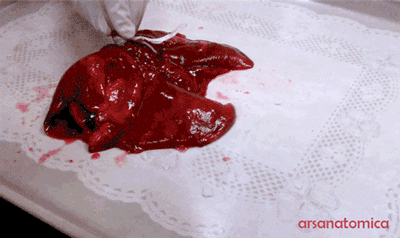
As gross as you may find it, try to watch the lungs as they expand.
At first, it may seem that the muscle swells in all directions; however, if you continue to watch you may find that it doesn’t. In the beginning the lungs swell out, then you can see that they rapidly expand in the front part of the lung, followed by them flopping up in the back.
Thus your stomach shouldn’t move THAT much, it should only move a little - The muscles are still fairly close to one another after all! Same applies with your upper-chest area.
Make sure when you breathe, your chest doesn’t lift too much, and that it’s your back that expands more. That is proof of a proper deep breath.
To make sure you breath deep, sit up straight. Place your finger on the bottom front part of your ribs, and your thumbs on the back; similarly to how one places their hands on their hips. Now take a deep breath, feeling the air on the tip of your tongue to the back of your throat.
Do you feel your thumbs being moved? That’s your lungs expanding fully. If not, try to adjust how you breathe, and where you feel the air. Once you find the perfect position, just breathe like that for a couple of minutes if you wish to commit this breathing pattern to muscle memory.
Some teachers also consider this breathing a warm-up in itself, as it stretches the diaphragm and lungs.
One last thing before we go onto the other warm-ups. Jolting shoulders mean tense and sudden breaths. Try to avoid it.
Now that the basics have been covered, onto the verbal and physical warm-ups!
Number Three: Shake Down
Fun Fact! This exercise is done by both theater people and vocalist!
The shake down is just that, you shaking out multiple parts of your body. You start with one hand and shake it eight times, then shake down your opposite hand eight times; then your one foot and then your other foot. After that you repeat the process starting at seven; then six; then five and so forth.
Now you may be wondering, why exactly this is considered a vocal warm up you should include? Wouldn’t doing proper stretches be just as effective?
Well, you are partially correct. Stretches are super effective, and great for your posture.
I just haven’t explained the vocal aspect of this exercise - you see, we’ll be giving every number a pitch, and descending from do. The best way to explain it to someone new to music, would be to do this exercise on a piano in the key of C major.
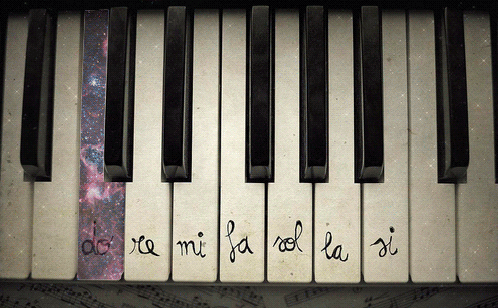
Shown above are all the notes and solfège (do, re, mi, etc.) associated to each note in a C major scale. What this image does not include however, is that the white key beside ti (the last labeled key) is also a do or C.
Fun fact! C always comes before the two black keys, and the notes in music only includes letters A through G.
As to not complicate things, I’ll assign the pitch (letter) to the number you will be singing in a legend below. Starting from left to right of the labeled keys we have:
Do = C (lower) = 1
Re = D = 2
Mi = E = 3
Fa = F = 4
So = G = 5
La = A = 6
Ti = B = 7
Do = C (higher) = 8
Great! Now I want you to play the high C, and try to sing it to the word eight. Find the note is too high or low? Just go to the C above or below!
Remember! When singing, you should always hold the vowel in a word for as long as you can, and only articulate your final consonants at the very end of the word.
Once you’ve sung eight, sing the B on the word seven; the A on the word six; the G on the word five; the F on the word four; the E on the word three; the D on the word two; the C on the word one.
Done? Congratulations! You just sang what is known as a descending scale. All that’s left for you to do is apply the earlier explained hand-foot shaking pattern to the note-number pattern and boom. You have a vocal shake-down as apposed to a theater shake down,
Note! You will be singing the descending scale four times, as you are shaking out four separate limbs; and you will be starting a note lower each time, as you count down from seven, six, five, and so forth. Also, if you want you can remove the numbers and only sing saying the solfa syllables (do, re, mi, etc).
Number Four: Tongue Twisters

Now everyone should be familiar with tongue twister, which are just sentences full of similar sounding vowels and consonants. You may remember doing some more commonly known ones such as Peter Piper, or She Saw Sea-Shells when you were younger; but fun and games aside, these sentences help you with deciding on where to put articulations in a word, or how you should spread the vowel shape. I’m going to share with you two that we commonly do in my class - Maybe My Mummy and A Big Black Bug.
The following tongue twisters go:
Maybe my mummy may go to Miami or maybe my mummy may not.
And
A big black bug bit a big black bear and the big black bear bled blood
Simple, right? lol, maybe not But now that we got the words down, lets get to the notes.
As we previously went over notes in the shake-down warm-up, I’ll be placing the notes on the piano above the words instead of completely typing them out - similarly to how most guitar chord to lyrics guides are. However, I’ll also be adding in timing.
For this to work best, pull up a metronome (on the web if you don’t have one), and set it to be 4/4 time, with a nice 65 BPM. Click play and listen to where the beats fall. Refer to the table below to the timing of each note in connection to the words.
When ever the words or numbers are bold, it means that that word or number lands on a beat.
If there is a dash between the two numbers, it means you hold the word above for that number of counts
The numbers between the beats are what the beats are subdivided into. They are as follows
-“...1 2 3 2...” mean three syllables fall under one beat
- “...1 2 2...” means two syllables fall under one beat
In the case where the count does not start on one, just start from that count and follow the beat to bold pattern given
The final consonants of the final words always go on the end of the last beat
Note! The timing and notes were done on pc, and therefore lines up best on that platform.
I’ll start with the easier one, Maybe My Mummy.
C C C C C C C C C C C C C C C C C C C
May-be my mum-my may go to Mi-a-mi or may-be my mum-my may not.
1 2 3 2 2 3 3 4 1 2 3-4
Yup. The entire thing is one note. Once your done playing that note, you go up to the next note (which in this case is the black key directly beside c), and even remove the metronome are put the BPM to a faster setting.
Note! The distance from one note to the note directly after that is known as a semitone. A whole-tone is made up of two semitones, and a certain pattern of while tones and semitones is used to determine whether a song is major, minor, natural, harmonic, or melodic.
A Big Black Bug is not as easy as Maybe My Mummy, and consists of multiple notes. In C major, it can be sung/played as follows:
C C C C C C C E G G G G G G E C
A big black bug bit a big black bear and the big black bear bled blood
42 1 2 3 4 2 1 2 3 4 2 1 2 3 4 1
Number Five: Bing
Bing is a super beautiful exercise that focuses or vowel shape, proper breath support, and resonance (the way your notes ring in the air).
Note! If you’re warming for more classical pieces (opera and musical theater), you generally want to have a very open registers during this exercise. For something for modern such as pop, focus on having a more nasally sound.
Now like Maybe my Mummy, this entire exercise is sung on one note and you ascend in semi-tones; however, that’s where the similarities end.
For this one we start on the by singing the word Bing on a C; then, without taking a breath or leaving a space (unless you’re about to faint), we transition to sing i, e, a, o, u. The pronunciation of each vowel is given below.
i = [ee]
e = [eh]
a = [ah]
o = [oh]
u = [oo]
Now try it out again, this time focusing on one point of the room your in - or on the gif provided bellow.
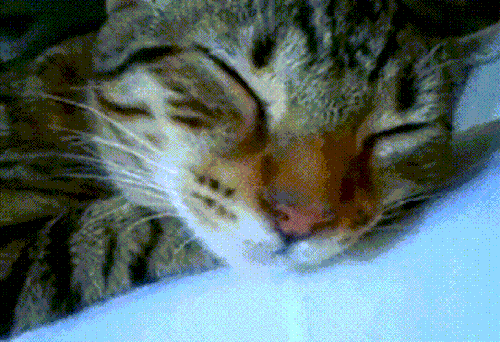
Focus on your point of attention. This time when you sing, gently open the back of your throat, and imagine the sound coming from behind you and over your head, going directly at your point. Shoot the sound it towards it.
Now adjust the way your mouth and throat feels to get a greater ring, and play around withe the placement until you can almost hear the overtones.
But remember! Being resonant doesn’t always mean being loud!
Number: ... Done?
By this point, you should be warmed up nicely enough to do some gentle singing of songs; which will further warm you without other people questioning what’s going on, lol.
I hope you enjoyed this post, and stay tuned for any more I may make!
(also it’s 1am - so peace!)
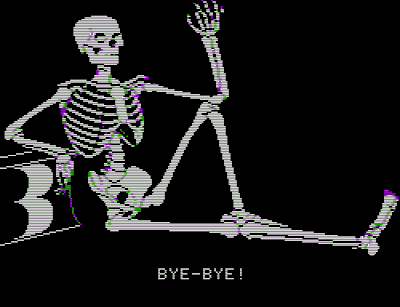
#vocal warmup#warmup#no vocal strain!#hot to#how to warmup#how to warmup vocally#how to do a vocal warmup#How to vocally warm up#how to warm up#how to do a vocal warm up
4 notes
·
View notes
Text
Whisper Game Phrases

Jimmy Fallon Whisper Game Phrases
The Whisper Game Phrases For Adults
Examples Of Chinese Whisper Game Phrases
Phrases For Telephone Game Office
Whisper Game Phrases Clean
You load a wrong way to get here?
…come again?
Ahh, you rode a long way to get here. Gotcha.
Having a hard time understanding your students?
If you, the teacher, can’t understand their ESL pronunciation, you can assume that many others won’t be able to, either.
Try using a tongue twister in a game of Telephone, where each student whispers the phrase to the next. It will become delightfully tangled and you may end up with a whole new twister to use in class. Create your own worksheets so students can dissect the phrases and figure out what they mean. This is great practice for learning that sometimes. Mar 5, 2020 - If you are doing the whisper challenge and you want to make it hard for the other person to guess correctly, try these fun whisper challenge phrases. The facilitator then whispers a message to one neighboring person. The message will now be passed round the circle by whispering to the next person and the next, until it reaches the last person at the other end of the circle (just before the facilitator). Ask the last person to say the sentence aloud.
How do you remedy this problem? With tongue twisters!
These fun phrases can trip up even the most fluent speakers with alliteration and confusing combinations of words. Students of all ages love learning with these phrases, and they can add a whole new level of learning to your class.
The first step to pronunciation mastery? Identify the issues!
Download: This blog post is available as a convenient and portable PDF that you can take anywhere. Click here to get a copy. (Download)
Common Troubles with ESL Pronunciation
The first language a student speaks is the one that will set the tone for their English pronunciation. So you’ll want to watch for languages that don’t have all the same sounds as in English. For example, in Spanish, “b” and “v” sound the same, though both letters technically exist. Likewise, Koreans and Chinese tend to have difficulty with “l” and “r.” Understanding your students’ native language will help you select the areas they need to work on. The trick is to identify the problems caused by the first language, and then you can choose the best tongue twisters to work with.
Some of the more common issues for English students include:
Aspiration: In English, we use a small expulsion of air to enunciate some letters. Try saying “P” or “Ch” or “K” to test this. You’ll notice a puff of air leaves your lips.
Mouth Shape and Tongue Position: Many foreign languages require very different mouth shapes for words. This results in difficulties for those learning English. Make sure your students know where their tongue needs to be and how to shape their mouth.
Throat Vibrations: In English, certain sounds make the throat vibrate. Try saying “g” to feel this for yourself. Now try saying “k.” While your mouth is exactly the same for each of these, they sound different. This can be difficult for students to differentiate.
Want to work from home? Maintain flexible hours? Make a positive impact? Be part of an empowering and collaborative community?
Click here to join our team!
Introducing Tongue Twisters to Your Class
Are you ready for the good fun of everyone tangling their tongues up in knots? These activities can result in rambunctious laughter, so be prepared! They’ll have a blast and so will you. But first…how are you going to set them up?
Listening or Reading?

Whether you’re working on listening skills or reading ability, you can always find tongue twisters to match the weaknesses of your students. However, keep in mind that a combination of both listening and reading practice is necessary for beginners to keep their level balanced. Their understanding of pronunciation will benefit greatly from being able to read the words as they hear them, particularly when there are words that they may not recognize. You might try this by writing a phrase on the board and then asking your students to let you know what they think it says.
While there’s no real reason not to work on the meaning of each word, keep in mind that a lot of these twisters are just for fun and most don’t make a lot of sense. They’re just good practice!
Tip: It’s good idea to practice any tongue twisters yourself before presenting them to the class so you won’t stumble over them. Embarrassing!

Implementing Your Tongue Twisters
Whether you decide to simply say the tongue twister or write it out, there are a ton of great methods for making use of all the the fun.
Try using a tongue twister in a game of Telephone, where each student whispers the phrase to the next. It will become delightfully tangled and you may end up with a whole new twister to use in class.
Create your own worksheets so students can dissect the phrases and figure out what they mean. This is great practice for learning that sometimes, words are just for fun.
Another good idea is to take some time to examine the letter sounds in the twists you use. Have students repeat the difficult sounds (v or b, l or r, etc.) a few times before attempting the whole thing.
Why not hold competitions to see who can fire off a twisted sentence without tripping up? The student with the fewest mistakes wins!
Tips for Pronunciation Success
The majority of the twists shown here are for specific sound types. You’ll want to make sure your students understand how to pronounce each sound, so take a minute before you start to go over the letter sounds you think they’ll find difficult.
For letters that require aspiration, try having students hold something light like a tissue or streamer in front of their face. When they say the letter properly, the item should move as they let out the burst of air.
A mirror can also be very helpful in allowing students to shape their mouths correctly and to see that their tongue is in the correct position. You may also want to draw the correct positions on the board and make sure you form your letter sounds very precisely so students can copy you effectively.
If a twister is less than five words, it’s usually a good idea to have students repeat it three times. This will tend to trip your students up. Start slowly, by pronouncing each word carefully and having them say it after you, then speed things up as they get the hang of it.
While tongue twisters in general are excellent for pronunciation, you can use specific ones to work on specific weaknesses. If your students tend to have problems with consonant blends, for example, you’ll want to use twists that encourage the correct pronunciation of those.
Get your quiet students talking with a few of these beauties!
Consonant Blends
Two consonants that form a blended sound can be hard for new English speakers. Build up their confidence with these:
She sells seashells by the seashore
I saw a kitten eating chicken in the kitchen
I thought I thought of thinking of thanking you
Slim slam slap
A big black bug snoozed on a big black rug
He threw three free throws
Thin sticks, thick bricks
Fred fed Ted bread and Ted fed Fred bread
L vs. R
Some of your students may have difficulty saying L and R. Asian language speakers often confuse the two letter sounds, so these tongue twisters are perfect practice.
Red lorry, yellow lorry
Truly rural
I scream, you scream, we all scream for ice cream
Rolling red wagons
Red blood, bad blood
B vs. V
Spanish speakers frequently pronounce these two letters the same way, making it very hard to hear the difference. These rhymes will get your students speaking clearer.
Blue blurry vines blind
Betty loves the velvet vest best
Barber baby bubbles and a bumblebee
Burnt base, vicious vase
Vivacious Val vacuumed Violet’s very vivid vehicle
Vowels
The correct pronunciation of vowels is essential if your students are going to be fluent in their new language. These tongue twisters will give them plenty of practice with enunciating their vowels. Ilightshow.
Eddie edited Earl’s easy music
Gooey gopher guts
Excited executioner exercising his excising powers excessively
Annie ate eight Arctic apples
An orange oval spooks the odd operative
An awful aardvark and an aching ape ate an antelope
Bonus Twists
These ones can be a good way to fill a little extra time between classes or simply to break the tension in a classroom. Better yet, ask your students to share tongue twisters in their native language, too. Nothing is more entertaining than seeing the teacher attempt a funny twist in another language!
Printed papers under pressure make pens prickle
The poor boar pours batter over his putter
Six sticky skeletons
Thunder sunders thick sticks
If you find success with this pronunciation practice, make sure you always keep an eye out for more twisters to help your class speak as accurately and accessibly as possible.
Everyone loves a good jumble…you can even make your own!
Download: This blog post is available as a convenient and portable PDF that you can take anywhere. Click here to get a copy. (Download)
Oh, and One More Thing…
If you’re excited to teach with these tongue twisters, you’ll love FluentU! FluentU takes real-world videos—like music videos, cartoons, documentaries and more—and turns them into personalized language learning lessons for you and your students.
It’s got a huge collection of authentic English videos that people in the English-speaking world actually watch on the regular.
There are tons of great choices there when you’re looking for songs for in-class activities. You’ll find music videos, musical numbers from cinema and theater, kids’ singalongs, commercial jingles and much, much more.
On FluentU, all the videos are sorted by skill level and are carefully annotated for students. Words come with example sentences and definitions. Students will be able to add them to their own vocabulary lists, and even see how the words are used in other videos.
For example, if a student taps on the word “brought,” they’ll see this:
Plus, these great videos are all accompanied by interactive features and active learning tools for students, like multimedia flashcards and fun games like “fill in the blank.”
It’s perfect for in-class activities, group projects and solo homework assignments. Not to mention, it’s guaranteed to get your students excited about English!
If you liked this post, something tells me that you'll love FluentU, the best way to teach English with real-world videos.
It's that time of year again – time to enjoy a few Christmas party games, buy presents, and of course get together with cherished friends and beloved family.
Christmas games may play an important role in your Christmas party, so you want to make sure you have some crowd favorites as well as some unique games that people may not have played before.
The types of games you choose also depend on your guests – if you're throwing a family Christmas party, you want games people of all ages can enjoy, or you may want to arrange some separate Christmas party activities for the kids to keep them occupied while the adults eat and talk. But of course, there are also plenty of Christmas games for adults.

With the right choice of games you can make your Christmas party one your guests will never forget.
The Gift Wrapping Race
Although there are many classic Christmas party games that have been played around the world for decades, we don't all want to follow the crowd. If you have a fairly off-beat group of friends or family together for Christmas, you might want to try unveiling a unique game they haven't heard of before.
Here's a good one, courtesy of the Moms Who Think website: turn wrapping gifts into a Christmas party game.
You don't need to use actual gifts for this – empty boxes will do the trick. You need the box, wrapping paper, scissors and tape.
Put each of these items at a different place around the room (you need one of each per team – in other words, for two teams you need two rolls of wrapping paper, two pairs of scissors, and two rolls of tape).
The game works as a relay race. There should be one box for everyone competing, as well as one person to referee and judge the competition. The judge says, 'Start,' and then the first person from each team must race to wrap their box. Once the first person finishes wrapping their 'gift,' the next person in the team can begin – until everyone on each team has wrapped a box.
Obviously, the main aim is to wrap all the boxes faster than the other team – but the fastest team doesn't necessarily win. That's what the referee is for.
Points can be won not just for speed, but also for how good each gift looks and any other criteria the judge wants to use, like points for wrapping style, straightness of taping, or how good each team looks with their boxes at the end of the game.
This is a game better played with older guests – rushing around with scissors doesn't work so well for young kids :-)
Christmas Games for Kids - Hilarious Scavenger Hunts
Many of the other Christmas games here can be played with kids, but you just have to simplify them a little bit.
Charades is a good idea – it can work with kids, but if it's too hard they'll get bored straight away.
The problem is, if you make it too easy any adults playing will get bored. That's why it can be good to have separate games for adults and kids to play, so everyone is entertained.
When it comes to kids' games, the sillier the better!
Scavenger hunts are always a big hit with younger kids, and they're perfect when you have a big group of kids that needs to be kept entertained.
Before anyone arrives, hide a whole lot of candy all over your property – not just in the house, but in random places in the back yard and garage as well.
When all the kids have arrived, tell them there's candy hidden all over the place.. they'll keep themselves occupied for quite a while (depending how much candy you put out, of course!).
What's In the Stocking? Christmas Bingo and Christmas Charades
You don't have to buy a bunch of props and extras for great Christmas party games – we all know our finances tend to get stretched to the limit around Christmas time, so here are some suggestions for good free party games to play during Christmas.
One good free game is called What's In The Stocking?
It's very simple – find some random objects from around the house, and get a stocking ready for the game. One person plays at a time. Blindfold the person who is playing and put an object in the stocking – make sure they don't see!
They then have to feel the object through the stocking and try to guess what it is.
This is a great one because it can work with people of all ages.
Obviously the downside is that you have to take turns, so let's look at a free group game.
A popular choice is Christmas Bingo.
It can work with big groups and can be played with guests of any age. Most people know how to play Bingo – the twist with Christmas Bingo is that instead of numbers, everyone has Christmas words on their card. One person can be the game leader, pulling words at random out of a hat.
As each word is called out, the guests note it on their score card (this can be done by placing a button on each word, rather than marking the card, so you can use the cards over and over again). When someone crosses off every word along a column or row on their card they yell out, “Bingo!” and the game is over (until the next round).
Of course, one easy way to find free Christmas party game ideas is to simply take non-Christmas games and give them a Christmas theme.
Christmas Charades
– why not play charades where everything relates to Christmas?
You can watch your friends, coworkers or family members trying to imitate Rudolph the Red-nose Reindeer or try to mime what 'snow' looks like – should be a funny experience!
The same can be done with Pictionary, although you'll have to choose some topics that won't be easily guessed from a simple picture.
Trivial Pursuit with a Christmas Twist and Christmas Whispers
It can be tough to choose the right party games when you have the whole family gathered together, young and old.
Games like charades often don't work very well when you have a group that spans three generations, so it's a good idea to keep a few whole-family games in your back pocket.
If you don't have any very young kids in your group, a good family game is trivial pursuit – with a Christmas twist, of course.
You'll need to do some planning for this, coming up with plenty of questions and answers and writing them on cards. For question ideas, think about common Christmas songs, the story of Santa and Rudolph, and the story of the birth of Jesus.
A good example question could be: 'Who helps Santa make his toys?' (Answer: the elves.)
Obviously, you'll want to tweak the difficulty of the questions depending on your group of guests. If you have very young and very old together, throw in a few questions only they will know the answer to – for instance, a reference to a 1950s Christmas song for the older people, and a reference to a Disney movie for the kids.
Look up some Christmas facts and trivia online to get ideas for tricky questions. A tougher question could be something like: 'The Three Wise Men brought the baby Jesus frankincense, myrrh, and what?'
Christmas Whispers is another good Christmas party game for the whole family
You probably have some idea of how it works: you all sit in a circle, close enough to whisper to each other.
The first person makes up a phrase that has something to do with Christmas – it should be fairly long and complicated.
They tell it to the person on their left, in a quiet whisper, and then person number two tells the next person in the circle, and so on, until the phrase goes all the way around the circle. The last person in line then says the phrase out loud.
The whole idea is that usually the original phrase gets lost in the whispers, and the final phrase is completely different – and often hilarious.
The bigger the group, the better.
Games for Adult Christmas Parties
- Silly Christmas Boat Race and The Dress Up Game
Work parties or gatherings with close friends give you a chance to kick back and relax, and not worry about doing anything 'inappropriate' in front of the kids or grandparents.
So there are quite a few games for adult Christmas parties which are a little more 'risque' than the ones we've talked about so far.
One idea is a bit like the 'boat race' drinking game
There are two props each team is given to play the game: balloons, and a pair of pantyhose. Divide your group into two teams – it can be played with large groups but it's better for smaller parties of eight to ten people.
The aim of the game is to blow up your balloons and stuff them inside the pantyhose until no more can fit. When the pantyhose are full of balloons, one of the team members puts them on their head like a pair of reindeer antlers and yells out, “Rudolph!” You can add some extra fun by having red noses for the two team leader to wear.
Be warned – this game can get very competitive! :-)
Another game we like is known by many names, but let's call it the Dress Up Game
Here's how you prepare for the game: you choose a prize, and put it inside a small box and wrap it up. You then put that wrapped box inside a bigger box, and wrap that. Keep doing this – try to get six or seven layers of boxes.
Now, to play the game itself, you need some props. You can choose and Christmas-related clothes – Santa hats, a coat, even some silly glasses if you like. The most important thing, though, is oven gloves. There needs to be something for people to put on their hands that makes unwrapping the boxes tricky.
You all sit in a circle, with the wrapped up prize in the middle. You roll a dice, and whoever rolls a 6 has to put on every item of clothing and all the props, including the gloves, and start trying to unwrap the prize.
As this is happening, everyone else keeps rolling the dice – until the next person rolls a 6. When that happens, the new 6-roller has to take all the props off the other person, put them on, and start unwrapping the boxes.
Whoever unwraps the prize wins.
This Christmas party game works best when no one knows what the prize is. If you choose the prize, it can be funny to choose something silly and worthless, but talk it up as if it's something really valuable.
Then watch your friends go crazy trying to unwrap it.. only to discover it's actually something lame.
Ideas for Christmas Decorations and Arrangements
Let's look at a few more general Christmas party ideas.
After all, games are important but they don't make a party on their own – good parties need things like food and drinks, comfortable seating arrangements, gifts and so on.
Decorations are one aspect of a good Christmas party that allow you to let your creativity run wild. Your choice of decorations can also link in with the games you choose to play – if you really plan it well, you can create a 'theme within a theme' for your party where the whole party becomes one big game.
It's your Christmas party, you make the rules – literally, you can make up all kinds of crazy rules to do with food, Christmas crackers, giving presents, wearing Santa hats – whatever you can think of.
Obviously, you need to be careful with your arrangements for seating and tables – make sure you have enough room for any food you'll be eating as well as areas cleared for playing games before guests arrive.
Arrange a 'kid's table' if the children will be eating separately from the adults.
This can make the whole affair a lot easier. For decorations themselves, colored lights are always a hit if you have the time and money to put into them. If you're not willing to spend a bunch on ornaments and lighting, you can always make your own simple decorations – some colored paper and creative cutting are often enough to bring the Christmas feel to a dining room or living room. Plastic reindeer or a little Santa Claus make for great front yard ornaments.
Beyond that you'll also want to be selective with food and drinks. If you're planning to put on a whole meal, you might want to enlist a few helpers – arrange Christmas dinner is rarely a one-person job. If it's just a casual party for adults, you can stick with light finger food – but you may want to make sure there's plenty of champagne on hand :-)
Other Christmas Party Activities
- Christmas Tree Decoration and The Secret Santa
Everybody expects activities when they go to a Christmas party, even if it's something basic like pulling Christmas crackers.
Activities are especially important if there will be a few people at your party who don't know each other – Christmas party games are a great ice-breaker and let people relax and enjoy themselves.
But activities don't have to be limited to games – there are plenty of other ways to have fun together around Christmas time.
Christmas carol singing is one example, where a group of you knock on random doors in your neighborhood and sing Christmas songs. Many people appreciate this show of goodwill at Christmas time.
Tree decorating is another great one for the family to participate in. If you have young kids, let them play a part in decorating the tree, and give the littlest one a boost to put the star or angel on top – this is a little thing to grown-ups but it can be a big deal to a kid. As we get older we often forget it's the little things that make Christmas special for children.
The Secret Santa is another fun activity, which is perfect for work places. Everyone gets designated a 'secret Santa' who has to buy them a gift – but no one is allowed to know who is buying for them, even after they receive the gift. This gives you a chance to play an anonymous joke on a work friend, and no one will ever know it was you! (Unless you tell them, of course.)
Where Would You Like to Go Next?
Christmasy Quotes, Sayings, Poems and Greetings
Christmas Greetings - Christmas Quotes & Christmas Poems for Your Christmas Cards
Christmas Quotes to Warm Your Heart and Make You Smile and Laugh
The Best Christmas Quotes and Thoughts: Sweet, Warm and Meaningful Through All of Time
Heartwarming and Funny Quotes about Christmas - plus some Christmas Thoughts
A Big Package of Christmas Sayings and Christmas Thoughts
Funny and Hilarious Christmas Sayings and Provocative, Helpful Christmas Thoughts
Quotescoop's Christmas Poems - from Inspirational to Funny Christmas Poems
12 Funny Christmas Poems - and Humorous Christmas Poems to Chuckle, Chortle and Cackle by
Jimmy Fallon Whisper Game Phrases
Beautiful Cards for Christmas
The Whisper Game Phrases For Adults

A Collection of Free Printable Christmas Cards and Funny & Vintage Christmas Cards & Christmas Card Greetings
Free Christmas Cards to Print - Antique Victorian + Modern Postcards
Humorous Reflections on Christmas
The Big Question: Is Santa Claus Real? Warm Santa Humor and Santa Claus Jokes and Quotes
What Is Christmas Really? Formal, Funny, Friendly and Feisty Answers to the Meaning of Christmas
Fun Games for Christmas
Examples Of Chinese Whisper Game Phrases
Fun Ideas for Christmas Games: Also Printable and Trivia Activities
Funny and Entertaining Christmas Party Ideas and Christmas Party Activities
Funny Mental and Physical Office Christmas Party Activities for the Best Company Christmas Parties
Phrases For Telephone Game Office
Back to the top of this page about Entertaining Christmas Party Games and Ideas for the Whole Family
Whisper Game Phrases Clean
Go to the Quotescoop.com Homepage

0 notes
Text
The Master, Surviving Elemental
As she got nearer, Miranda got a good look at him. He was of average height, and looked very smart in his black suit and pressed shirt. He had neat black hair, greying at the temples and a small, pointed beard. But that wasn’t what Miranda concentrated on – she was struck by his eyes. They were black, but they burned into her, like he could read her mind. Like black lasers.
He smiled, but there was no warmth in it. “Hello, Miranda, my dear. I am the Headmaster.”
[...]
The Doctor was disappointed to find himself in a perfectly ordinary Headmaster’s Office, or at least something doing a very good impression of one.
A large oil painting of the current Headmaster in academic robes glowered down at him as he began a quick search of the room. There was a grandfather clock in one corner… but there was something odd about it. Something wrong with the way it had been made – it didn’t look quite finished.
Opening the desk he found a glowing sphere, the size of a cricket ball. Space twisted around it.
‘A dimensional stabiliser,’ the Doctor heard himself saying. It was responsible for moving the office into the fifth dimension. No-one native to Earth could possibly enter the room while it was active.
He picked it up, found it responding to his thoughts. He could hear it talking to him. Yapping, like a loyal dog.
The Doctor asked it to go into standby mode, then slipped it into his pocket.
He quickly found a set of official school notebooks, like registers. But they were full of mathematics symbols, what looked like Greek writing, and a number of very interesting drawings. One looked remarkably like a scale diagram of a black hole. Another was a spiral, like a five dimensional whirlpool.
The Doctor scowled – he knew he should be able to read this, but he couldn’t. If it had been Greek, it wouldn’t be a problem. And he wasn’t sure he could ever decipher it – very few of the symbols were repeated. If it was an alphabet, it was a huge one.
‘It’s called the omegabet,’ a voice told him. ‘It has a million letters…’
‘…but only five vowels,’ the Doctor completed.
‘So you do remember?’
The Doctor frowned. ‘No…’
Then he turned. The Headmaster was there, covering him with what looked for all the world like a laser pistol. ‘
I knew you’d track me down, my dear Doctor. But you’re in the same boat, aren’t you?’
‘Boat?’
‘Where are you from, Doctor?’
‘I don’t know,’ the Doctor admitted.
‘Not this planet, though?’
‘No…’
‘Neither am I. We’re from the same place. Something’s happened to time. Something’s happened to… to…’ The headmaster squeezed his eyes together, tried to concentrate. ‘Wherever we came from, it’s gone.’
‘Gone?’
‘It never existed. That’s my theory.’
‘Of course it existed. Otherwise, how could we exist?’ ‘It’s paradoxical, it’s mindbending and upsetting. But… it’s exciting. Liberating. Full of potential. We can push things further, how far only depends on us.’
The Doctor looked at this strange man. He wasn’t a tall man, but there was something about him – his bearing, those eyes. He was a born leader.
‘And where do you want to “push things”?’ the Doctor asked, already suspecting what the answer would be.
‘If we don’t take control, someone else will,’ the headmaster insisted. ‘This is a perfect opportunity.’
[...]
The Doctor was edging back towards the door.
‘We can’t do this alone. We have to recruit other… other people like us. We’d also need to root ourselves into this reality. I don’t know how yet, but we don’t have long. I don’t think there are many of us left. It’s why you’re special. It’s why your daughter is so special.’
‘Miranda’s adopted, she’s -’
‘I know who Miranda is, Doctor. I know the truth. There’s no need to hide it from me. I know.’
The Doctor tapped his lip. Until the Headmaster had mentioned Miranda this had been a game. But he was threatening her, now.
‘And you’d be our leader?’
‘We would have a universe, Doctor. A whole universe. The whole of space and time. Even I don’t think I could rule all that alone. We’d need an army, and what better place to raise an army than here on Earth?’
‘Then we’d divide up the universe between the three of us?’
‘Four. There’s another.’
‘Another time traveller?’
‘Someone else like us.’
‘But you said yourself that you don’t know what we are.’ ‘Precisely. But I know what I am not. I’m not a slave, not a servant, not a subject. I was born to rule, as were you. It’s our birthright, Doctor.’
- “The School of Doom,” Lance Parkin
Standing before the iron door – a still definitively and solidly locked iron door – is a dapper, sardonic-looking man dressed in a pristine dinner suit. His jet-black hair is slicked neatly back with oil. He is leaning, nonchalantly, on a silver-handled cane.
‘Who. . . ?’ Anji’s voice falters with a curious mixture of relief and trepidation. ‘What. . . ?’
‘Oh, don’t be ridiculous,’ says the man. ‘You know perfectly well who I am. In a certain sense, anyway. And as to what I did. . . ’ He blows on the nails of his free hand. ‘You know how it is when you have any number of pets. Familiars, chimeras, creatures of hideous, diabolical and slitheringly unutterable evil, that sort of thing. One has to let them out occasionally. One has to keep them fed. It’s a bit of pain, sometimes, to tell you the truth, but it is rather expected of one.’
Abruptly he becomes brisk. ‘Well, I really should be going, for the moment. You’re swimming busily for the surface, I can see, but you still have a way to go yet. Never does to rush these things.’
He essays a formal little bow and shoots out a well-manicured hand. Anji has no time to lurch back in alarm before she realises that he is merely proffering her (as if for her inspection) a small pasteboard card. Still in something of a daze, she takes it.
‘Feel free to drop by,’ the man says. ‘When you feel up to it. Any time at all.’
With that, he lays his cane over his shoulder, slides past her and strolls out of the alley, whistling a complicated little tune that Anji has never heard in her life, and will never hear again – though it strikes a chord somewhere inside her, some part of herself vaguely recalling troop trains and soldiers packing problems into their old kit bags and smiling, smiling, smiling.
- The Slow Empire, Dave Stone
According to Scarlette’s journal – though not Lisa-Beth’s – during the fight one of the male denizens of the tavern edged his way through the violent crowds and quietly seated himself at Scarlette’s table. Though no name is given for the man, Scarlette says that he was ‘a gentleman of distinguished nature’, clean-shaven and dark-haired, and at first she thought he might have been in the market for business. She does note, however, that on the lapel of his black clothing he wore a rosette in blue-and-white. It would have marked him out as a member of the Opposition, but nonetheless he was quite gracious and civil.
[...]
Assembling a picture out of all the accounts, he’s described as a cleanshaved, dark-haired man in distinguished middle age, handsome in some respects even though to some of the British witnesses he came across as ‘swarthy and difficult to place’. He was slim and well turned out, and he made an impression on the island by always dressing in tight, straightforward clothing of prim black. . . apart from the rosette of blue and white which he wore on his lapel. He would often be seen simply standing in the vicinity of the other guests, hands folded behind his back, observing intently without becoming involved in any of the visitors’ many disputes. Whenever people would ask each other about him, in muted whispers, the dark-haired gentleman would simply bow his head to them. His accent was English, although some said they detected a little Latin in his features.
[...]
DOCTOR: Have we met? I’m sorry, my memory isn’t what it was. I shed most of it a long time ago.
THE MAN: Met? Oh, I’d say so. Believe it or not, we used to know each other quite well.
DOCTOR [with recognition?]: Good grief.
THE MAN: Ah. Spoken like the man I used to know.
DOCTOR: You’ve lost that terrible beard, then.
THE MAN: But of course. I have whatever it is you lack. And vice versa. Have you forgotten? Oh, I’m so sorry. You’ve forgotten everything, haven’t you? [Irony?]
DOCTOR: You’re behind all this? No, of course you’re not. Not your style at all.
THE MAN: Here, Doctor, I’m simply a guest. Thank you for the invitation, by the way. Most touching. Admittedly, I would have preferred something more personal. . .
DOCTOR: And would you mind telling me what that rosette’s meant to be?
THE MAN: A sign of my allegiance to the great Whig cause. I’ve become an exponent of democracy.
DOCTOR: Why does that not sound convincing?
THE MAN: My dear Doctor, I’m telling you the truth. I told you. I have to offer the universe whatever you can’t. If you’ve decided to take on the colours of your new sweetheart, then it’s up to me to side with the Opposition. Perhaps one day you’ll consider destroying the universe. Then I’ll be in the awkward position of saving it.
DOCTOR: You don’t expect me to believe that, surely?
THE MAN: Your friend in red came closest to the truth. What does she call you, again? Her ‘elemental champion’? Very perceptive of her. There are only four of us left now, you know. Four of us in all of the universe. We have certain standards to uphold.
DOCTOR: Then I suppose you’re going to say that you don’t want to kill me.
THE MAN: It’s hardly the time for that any more, wouldn’t you agree? While our kind still walked tall, we had the whole of space and time as our battlefield. These days, I’m afraid our little duels would be utterly meaningless. You’ve met Sabbath, of course.
DOCTOR: Yes. He reminds me of you. I think.
THE MAN: How interesting. He reminds me of you. Our replacement, Doctor. The new breed. All our kind in one, and a mere human being, too. We can hardly return to our old routines, with his kind in charge. Can we?
DOCTOR: I’m sick. I’m helpless. You must know that.
THE MAN: I rather think that’s my point. Do your duty Doctor. However tedious it may be. Save the universe. Become King of Time. Go after that irritating black object in the sky. Whatever you think is necessary. Once you’ve done that. . . well, perhaps the universe will be ready for us again, who can say? Then we can set about destroying each other properly. Otherwise, I’m afraid this is hardly our arena any more.
- The Adventuress of Henrietta Street, Lawrence Miles
‘There were four of us left, apparently. You’d be number five.’
Marnal rounded on him. ‘Left after what?’
The Doctor hesitated. ‘I don’t know. Some disaster. I’ve picked up hints, seen the odd vision, but I was never able to follow up on anything.’
Marnal leant over him, sensing a moment of weakness. ‘Weren’t you, now? Not terribly enterprising of you. So you have no idea?’
The Doctor shrugged apologetically. Marnal raised his hand, and the Doctor thought he was going to hit him. Instead, Marnal touched the Doctor’s temple with a fingertip.
‘Contact.’
For the briefest moment, the Doctor saw himself as Marnal saw him. Then back to vice versa. Then rapid alternations between the two viewpoints. It was dizzying.
A man with a sallow face and small, pointed black beard, who wore a blue rosette; a young woman with long blonde hair in an extraordinary piece of haute couture; a tall man with a bent nose wearing a cravat and holding a pair of dice; the Doctor himself with close-cropped hair, sitting on an ornate throne, a newborn baby girl in his arms.
- The Gallifrey Chronicles, Lance Parkin
#Eighth Doctor Adventures#The Slow Empire#The Adventuress of Henrietta Street#The School of Doom#The Gallifrey Chronicles#Lance Parkin#Lawrence Miles#Dave Stone#Anji Kapoor#The Master#The man with the rosette#long post
35 notes
·
View notes
Text
How I Write Baybayin (Handwriting and Straight-cut Nib Calligraphy) Subtitle: This is a freaking long-ass post so be warned now
You can read the entirety of this post as is, or you can go straight to the calligraphy portion. It’s at the end of the post (sorry dunno how to link that portion here).
Writer’s Note: First and foremost, I will advise everyone who reads this somewhat master post that I am not an authority when it comes to how baybayin is written, as what you shall be reading is just based mostly on my own experiences on how the characters are written and comparing them with other writing systems that are based on syllables rather than individual letters, like the Japanese Kana and the Korean Hangul, among others. This is because baybayin are not technically letters (individualized, can’t stand alone, only comes either as vowel or consonant but not both, you get the picture), but rather are syllables (i.e. the consonants have free vowels with them lol) that form words.
Also, as far as I know regarding how the baybayin texts are originally written pre-Hispanic colonization era, some of the written texts in the Philippines (or at least, those that survived, or I remember seeing in old history books) were written from right to left, top to bottom. This also coincides with other writing methods in some parts of Asia that also read from right to left. The technique of writing and reading from left to right may be a Western invention, in my opinion so I just did some of the strokes in the baybayin characters go from right to left, except for the straight-cut nib section. Again, I am no authority so I’m just doing what I think makes sense to me, as there is no existing ANCIENT written rules on the stroke order of the baybayin. Other people may disagree with my stroke orders here due to various reasons, but if you’re into what I did then feel free to learn from them, for free. *heart*
This author’s other notes: I won’t be elaborating the history of baybayin here because that would take around (counts how many years I spent in school) 5ever as it basically intertwines with the “current” history of the Filipino people. I put quotes on “current” because every decade or so, some written histories get re-written based on some evidences or what, and I totally respect that. It’s like in scientific papers: legit today, debunked tomorrow. And it’s completely OK, because THE MORE YOU KNOW~
Also this author’s note: I keep calling baybayin alibata, because that’s what they were called when I was a kid and how it was taught by history teachers before the process called “being politically-correct” became the norm. It’s because alibata was supposedly an incorrect term which signifies that the characters were letters based on Arabic, but apparently it wasn’t so.. Yeah. I’m just saying, so the kiddies would know. And if you’re like me who also refers to baybayin as alibata, let’s get a high-five! (Cause you’re also old, but gold =D) Some biased history FTW lol ok let’s get started.
Handwriting Alibata Baybayin Strokes with a Bamboo pen (or Ballpen, or Pencil, w/e floats your boat)
OK, before I start I would be first putting here the somewhat traditional ordering of the baybayin, which is:
A BA KA DA E GA HA I LA MA NA NGA O PA RA SA TA U WA YA
As well as the borrowed/loan syllables (which correspond to C, F, J, Ñ, Q, V, X, and Z were apparently added some 6-7 years ago, in which I didn’t get the memo x__x)
CA FA JA ÑA QA VA XA ZA
OK, now that’s out of the way, it’s time for the actual stuff. For ease of practice and recall, I’m grouping the letters based on how I write them and in turn, their forms. This would make sense as the pictures move along, don’t worry. The forms are built sequentially, I tried making that a bit obvious in the diagrams, but there are red arrows in case I wasn’t that clear. For those that only have one picture or arrows in the sequence, I would be implying that the form is built on a single stroke.
Group 1: A, MA, PA, YA, FA, JA, VA
OK, let’s start with A:
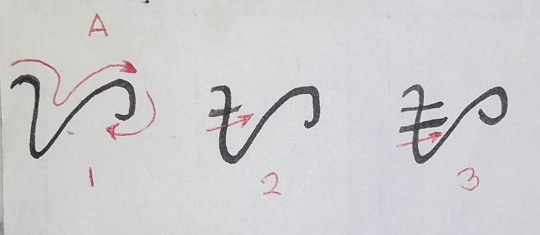
Then MA:
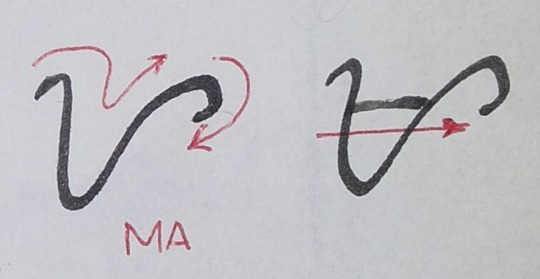
PA:
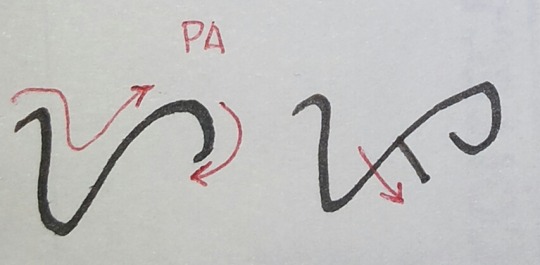
YA:
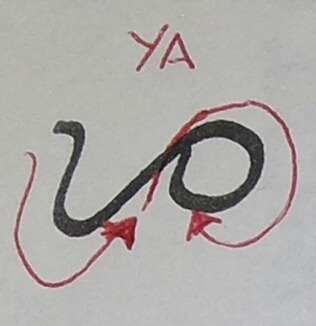
FA:
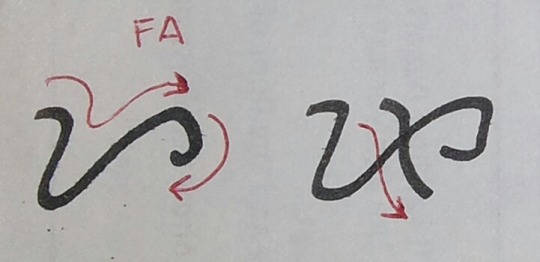
JA:
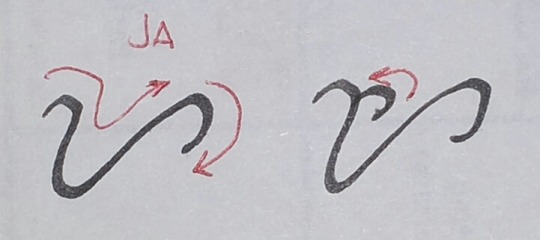
VA:
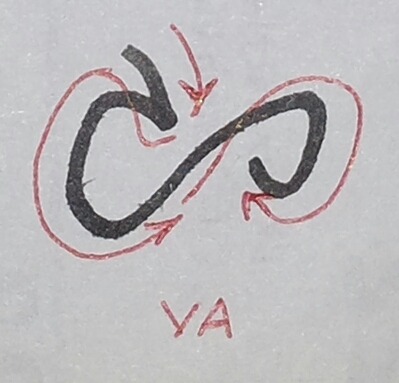
Group 2: E/I (more on that later), KA, DA, HA, RA, CA, QA, XA
I’ll start with HA because it’s a foundational stroke:
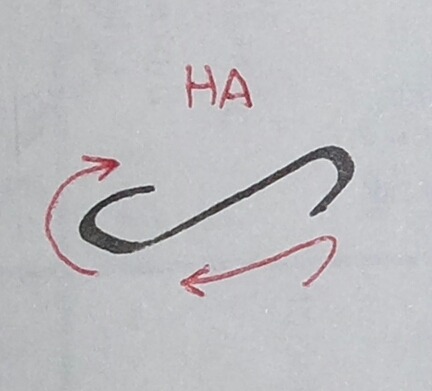
E:
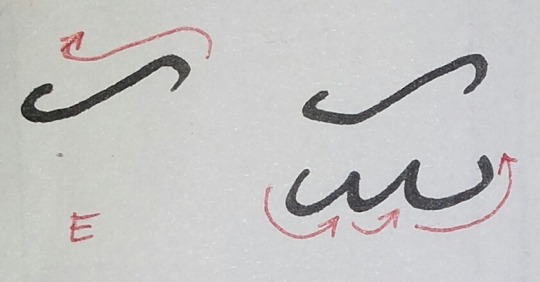
I looks structurally like E, but only with a vertical stroke on its hat.
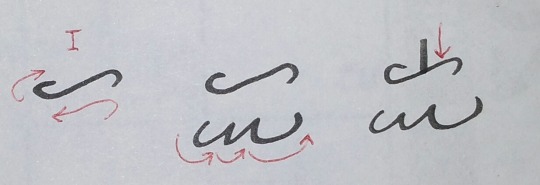
It’s because originally, E and I were the same character and whether it should be read as a syllable from the E or I line depends on how the reader would read it and the dialect used in writing the words, like it’s a fill-in-the-blanks kind of thing. It’s also the same with O and U, so if you see that part yeah they look alike. This is also the reason why revisions on writing the E-I and O-U consonants were made, but that would be for a later part. Just be patient for now. =D
Ok, moving on, we’ll go to KA:
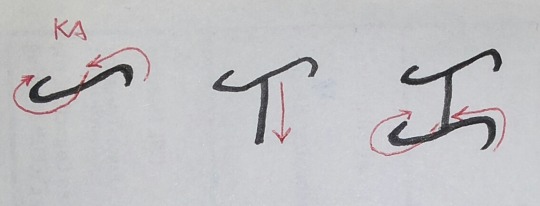
DA:
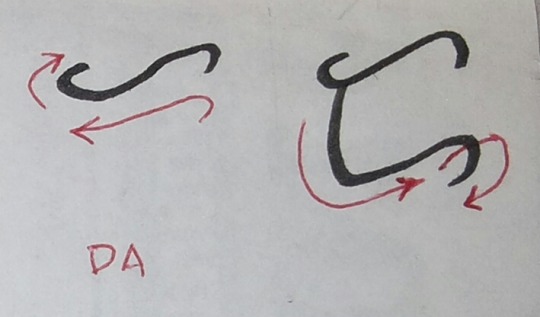
RA:

A short note on DA and RA: In olden times, these two were only one character, and are used interchangeably based on word usage, thus for words such as doon/roon, which both mean way over there one is used for passive and one is used directly (sorry not a speech comm person). This is also the case for marami and ang dami (both meaning “there are many/there is much” but one is active and one is passive. Madami is, IMHO grammatically incorrect. But then again, I’m not a speech comm person so sorry if these are wrong. I’m just saying).
CA:

QA:
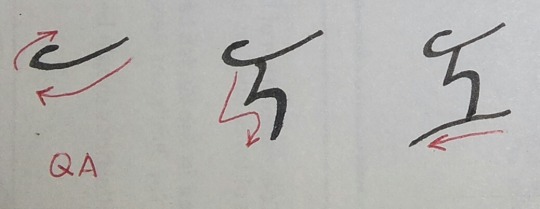
XA:

Group 3: O/U, GA, SA, ZA
Just like in E/I, O and U are also structurally similar. To make an O:
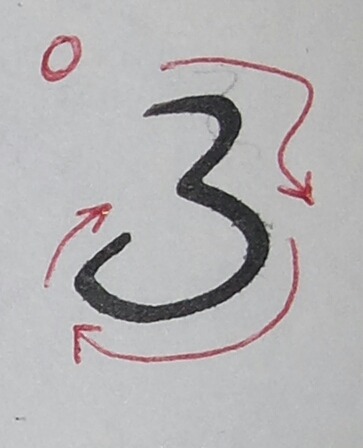
To make it a U, just put a vertical line on the right side:
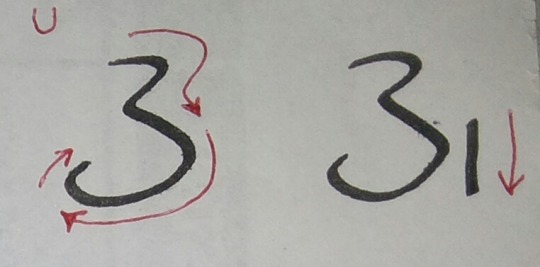
GA:
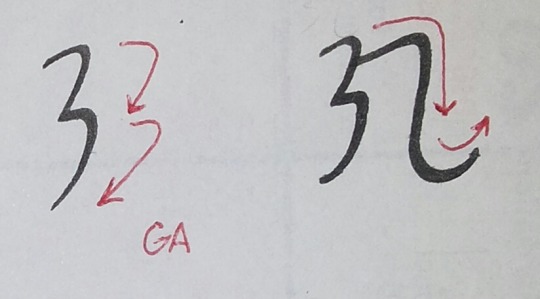
SA:
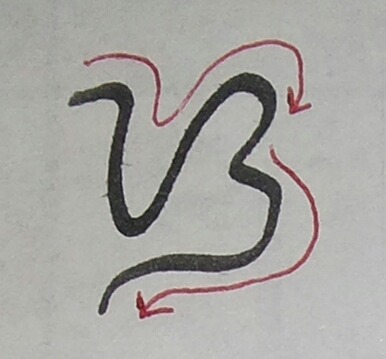
ZA:
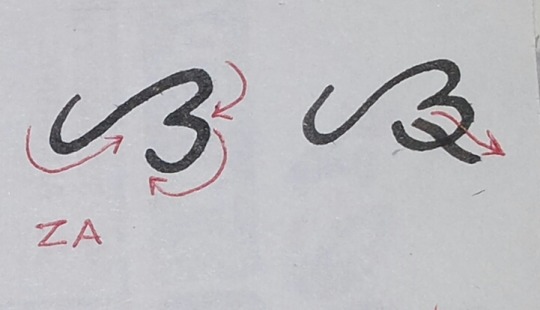
Group 4: LA, NA, TA, ÑA
I grouped this bunch based on having a downward stroke in the middle of the form. The initial strokes are written as a single stroke from left to right, like in the first group.
LA:
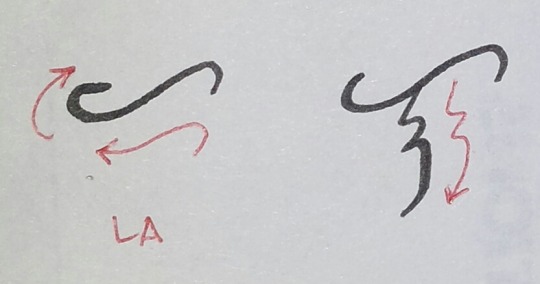
NA:
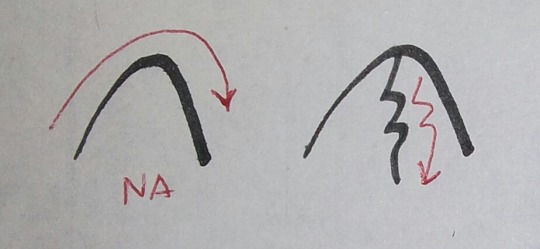
TA:
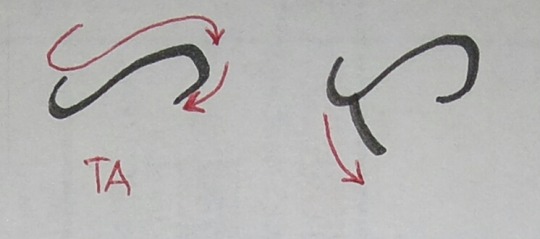
ÑA:
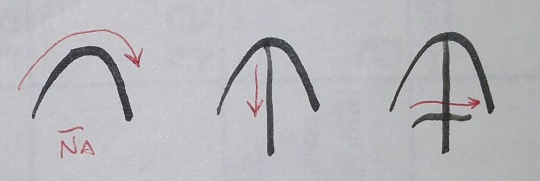
Group 5: I have no idea where to put BA, NGA, and WA so I just made a miscellaneous group lol but they deserve just as much love OK?
BA:
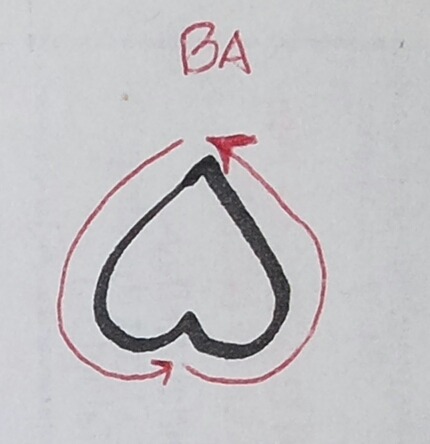
NGA:
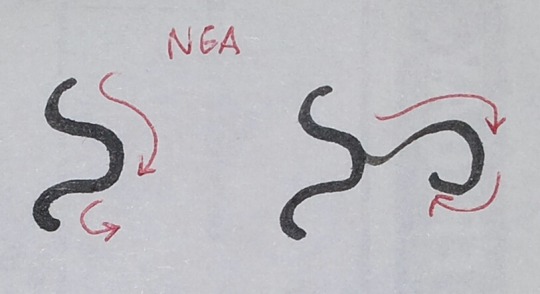
WA:
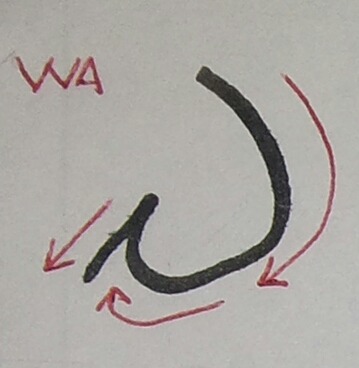
How the E, I, O and U lines are written:
In writing E, I, O and U (as in the case for the example below, which is GE, GI, GO, and GU), the original positions of the additional marks (such as the vertical lines for I and U) were kept but in order to differentiate E from I and O from U, the marks were made to be further distinct. For instance, GE is basically GA which has a horizontal line above it, while GI has a dot above it. As for GO, it has a dot below and GU has a horizontal line.

GI and GO can have either a hollowed dot like in the sample, or can also be filled like the samples below. It’s based on personal preference. Also I used G for the samples because it looks nice, fun to write, and most other examples of alibata on the internet use BA as their examples for this portion. Whoops, I meant, baybayin. XD
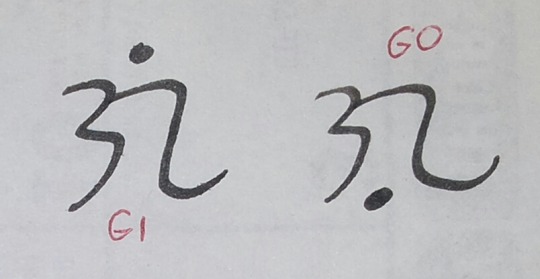
Vowel Killers: Invented by People who Needed It
I’m not entirely sure why vowel killer was the term used but it does tell it exactly what it does: it silences the vowels in the characters (because baybayin is composed of syllables) in order to make separate letters. It was invented by some Spanish friar who couldn’t properly write the native words because words that have consonants at the end were written incompletely. I.E. the word DOON (over there) was written as DO-O in baybayin. It was such a drag that he decided to introduce the Spanish/Latin alphabet by making baybayin characters that acted as alphabets, which is essentially killing all the vowels and leaving the consonant behind. So instead of using dots, the friar made a cross underneath the symbol which they called a kudlit (for obviously non-secular reasons), so that the words with consonant ends can be written and read as they were. As per the revision that was instated a few years ago, in order to make the baybayin a bit more secular, more forms of the vowel killers were made, which in my opinion look better than the original kudlit, because they look more organic with the forms.

As you can see in the pic of the letter G above, the first on the left is the original kudlit, which is shaped like a cross. The next one has an X, or sinawali (it’s literally based on the patterns of hard, woven rattan walls called sawali which look like X’s), the next one is called a kawil (sorry dunno where that came from) and the right-most one has a pamudpod (which may have come from the word “pudpod/pudpud” literally meaning grinding or repeatedly striking something on a hard surface or on a whetting stone till it disappears or becomes flat/dull, so pamudpod is the surface that makes the item pudpod like a used pencil or eraser. Do I even make sense anymore? Oh well, YOLO).
Stringing them All Together
My personal preference is using a kawil on horizontal writing (left to right) and using a pamudpod when writing vertically. I think the overall impact is better. But then again, it’s just my personal idea. Using any of the vowel killers are, like the filled or hollow dots on I and O are personal preferences, as long as there is consistency in usage.

If you can read the above and understand where the reference came from, you probably also call baybayin as alibata, and we should totally get some tea together. XDD It pretty much means “What is there, yonder?” smth idk but yeah, it sounds like that. Old and formal Filipino/Tagalog.
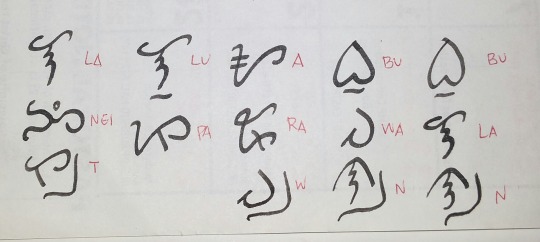
Langit - sky or heaven, Lupa - ground or earth, Araw - sun, and Buwan (or Bulan in Ilokano) - moon
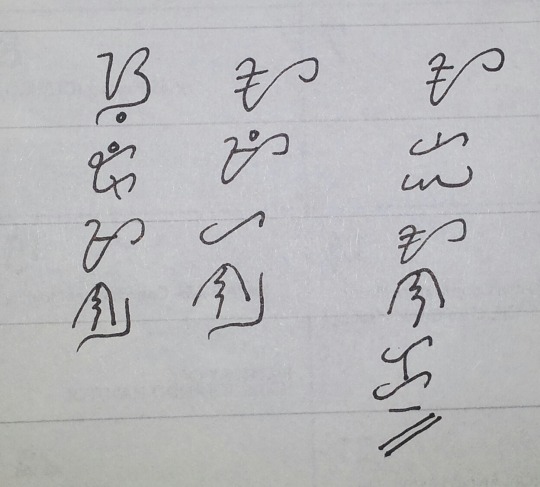
Soliman - A variant of the name Sulaiman/Solomon
Amihan - the northeast monsoon, the nice wind that brings in cool, dry air around November-March. Or if you watched the old and new Encantadia, she’s the protag. XD
The third sampler is a phrase (I ran out of space it was supposed to be a sentence), and vertical double bars are used to end the sentence. I just made them into diagonal slashes to make them look cool. Also I ran out of space. x__x It’s transliterated as a wailing mom looking for her child: Ai anaku (bunga) - Ah, my child (fruit). No space for fruit so it ain’t there.
Author’s extra rant note: Of course, some early Filipinos didn’t wanna use the kudlit due to being comfy with whatever they had at that time, but eventually they gave in. Fast forward to a century later and the baybayin was pretty much dead, as it was for the next 4 centuries or so. Romaji became the norm (except for some of the native tribes that have their own awesome writing systems), but then again some Filipinos didn’t forget it entire time, as many of the revolutionaries’ battle flags had the syllable KA, which is the first syllable of Katipunan, their group which can also be transliterated as “the entire group of the people who meet and come together”. I can’t say more because this is a long-ass post and it’s not about Philippine history. But we can talk about that if you want. Just hit me up with an ask. Warning though: I might just say “thanks for asking but please ask something else” lol j/k XDD
Writing Baybayin using a Straight-cut Calligraphy Pen/ Dip pens with Straight/Oblique Nibs
For this portion of the post, aside from posting pictures of the baybayin in black and white ink I would be pointing out that the techniques I used here are based on Western traditional calligraphy techniques used by scribes of the past, so some of the stroke patterns would be a lot different from the handwritten strokes above. But then again, if you clicked the link to get here straight away instead of reading the previous portions, well you won’t be having that much problems then. Also I will assume you already learned how to write baybayin so I’ll leave you at that. For the black baybayin, I used a calligraphy fountain pen with a 2mm straight-cut nib from the Visual Deck Set – Calligraphy box, not sure where you can buy it online but I bought mine at the National Bookstore because nobody wants to buy it. (Should’ve also bought the other calligraphy set while they’re on sale. LOL Just saying XDD). The surface is just the back of old calendars because I was just testing the strokes. For the white baybayin, I used a Speedball™ C-2 oblique-cut nib and for the ink, it’s glittery silver poster paint from Reeves™ (diluted with dH2O), and the surface is some random paper with nice surface and sizing which my father got from the office. (Apparently you can’t print anything on it so it aged well there until my father disturbed the papers’ sleep and brought them home. Now I ran out of both the calendar and the weird red paper so business is halted for a bit. XDD) Again, these are all based on how I write stuff so it’s pretty much a personal opinion, it’s not absolute but it certainly works for me so here you go.
Group 1
A:


MA:
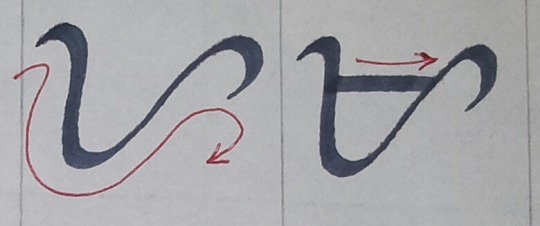
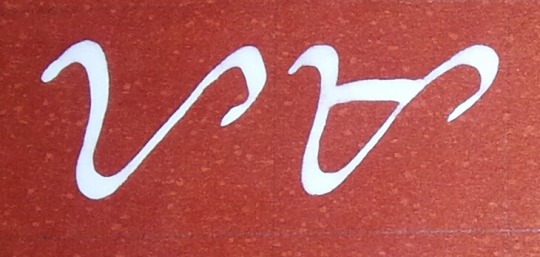
PA:
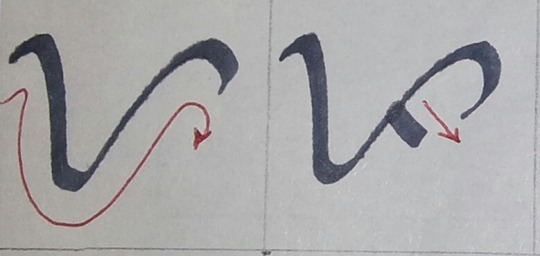
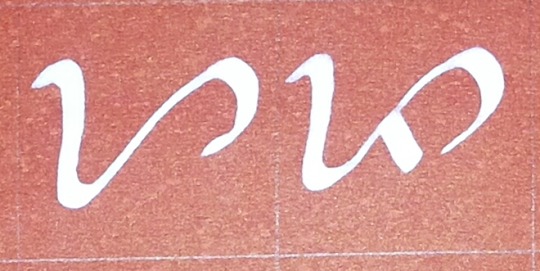
YA:
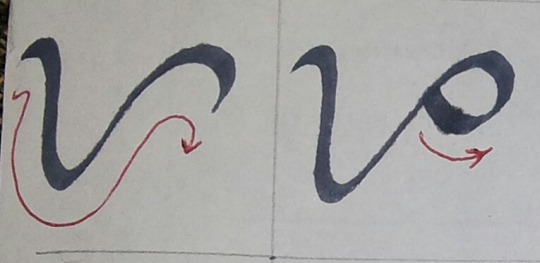
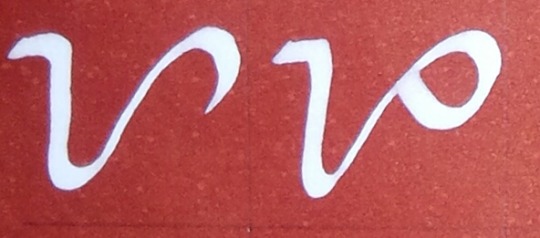
FA:
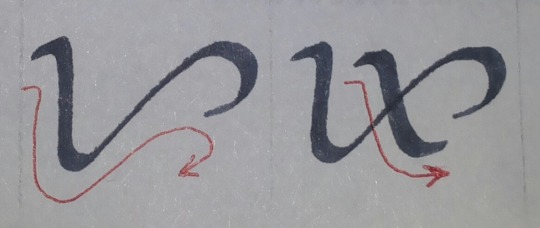
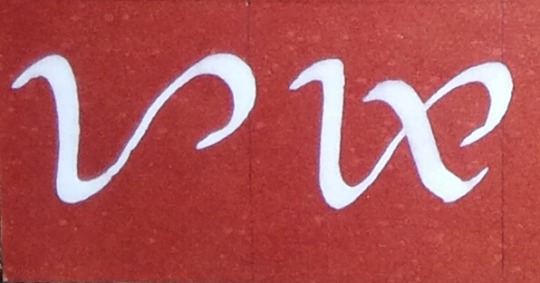
JA:
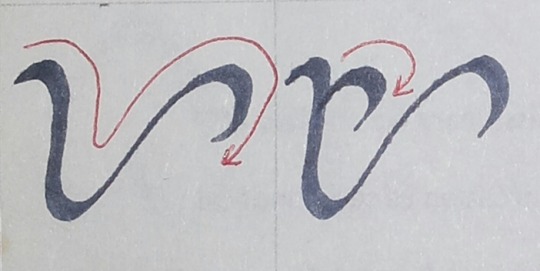
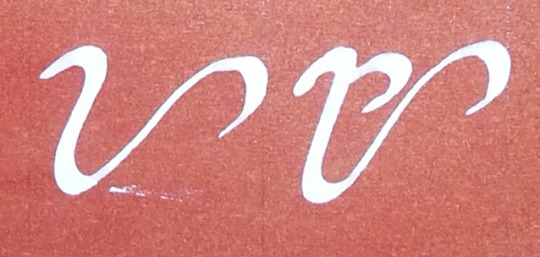
VA:
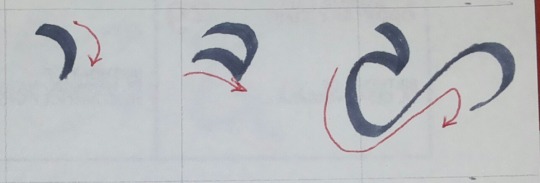
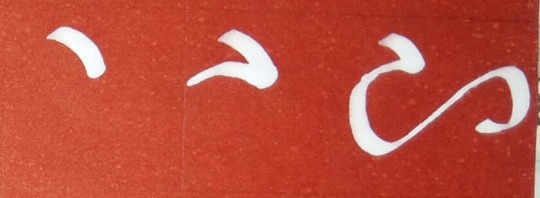
Group 2:
E/I: I’m just putting I here because E and I basically have the same strokes. To make E, just omit the final vertical stroke.


DA:
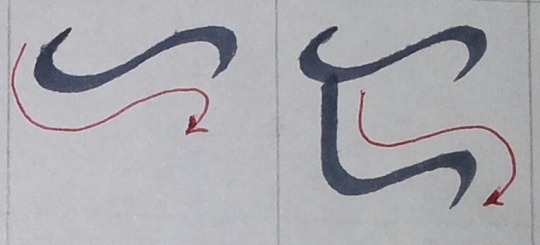
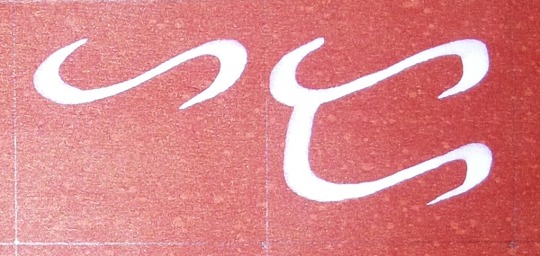
HA:
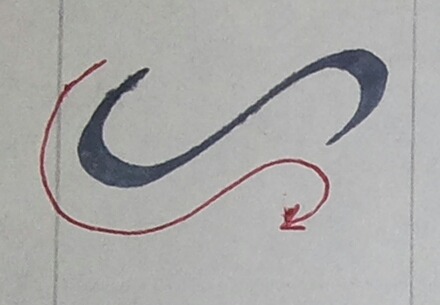
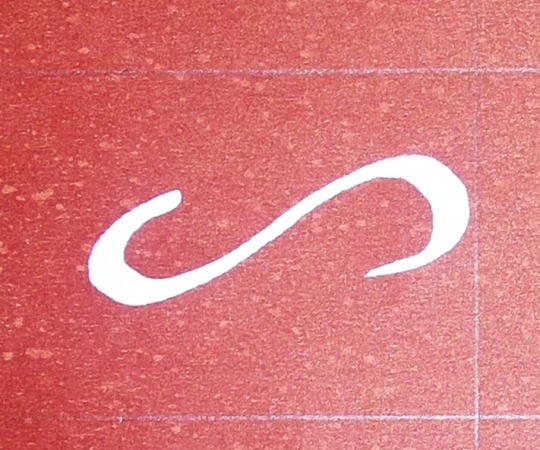
RA:
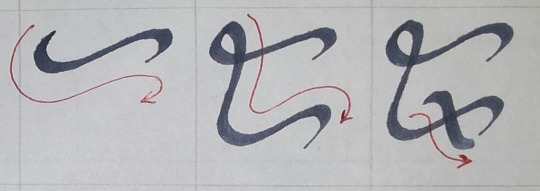
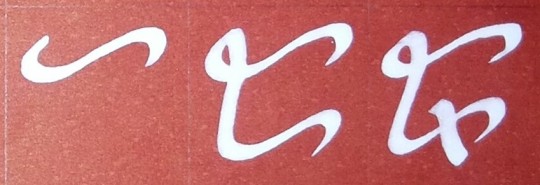
CA:


QA:


XA:


Group 3
O/U: Same with E/I, I just placed U here because O is practically the same, minus the vertical stroke on the right.


GA:
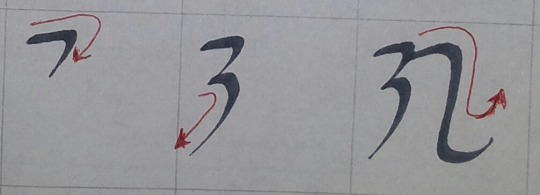

SA:
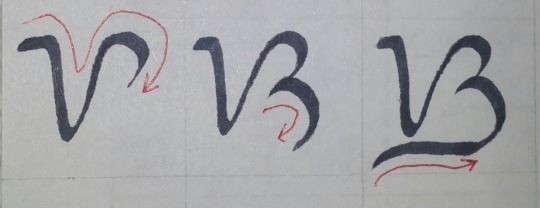
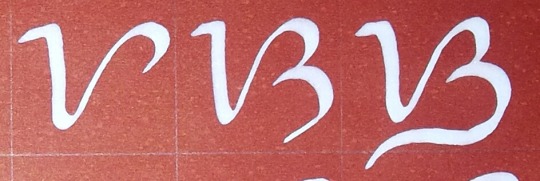
ZA:


Group 4
LA:
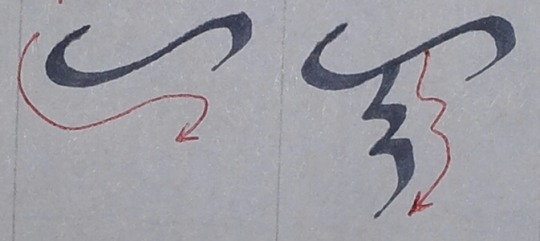
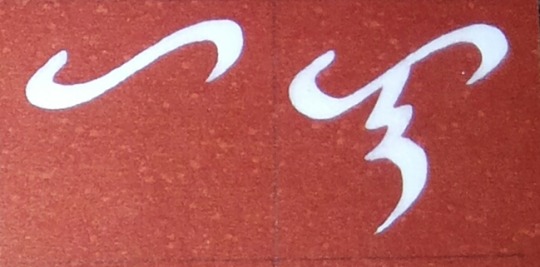
NA:


TA:
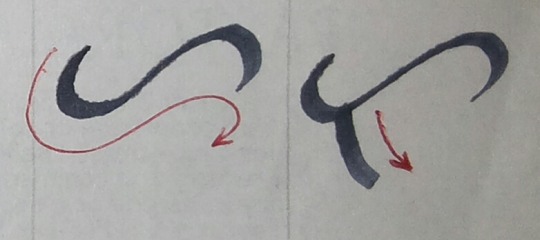

ÑA:


Group 5
BA:
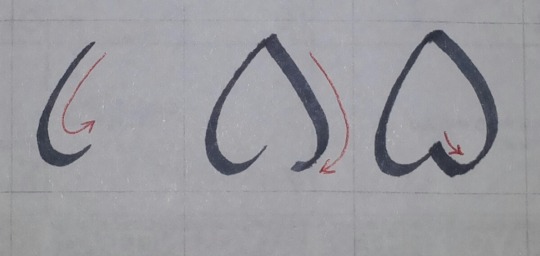

NGA:


WA:

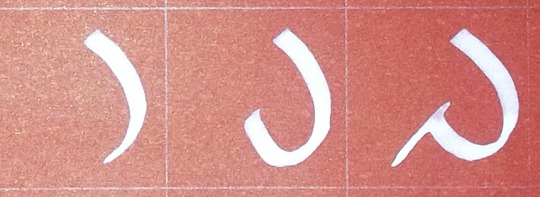
E, I, O, U Lines


Vowel Killers

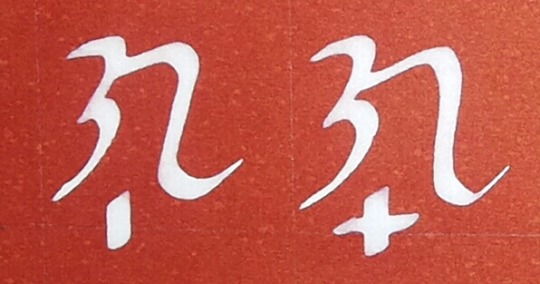
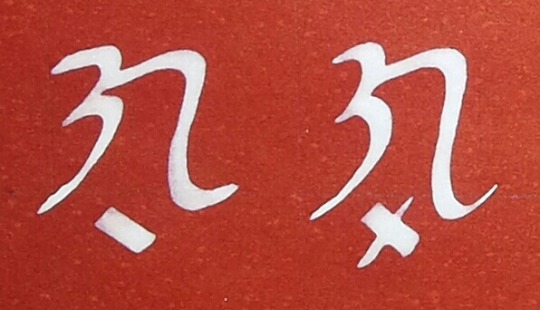
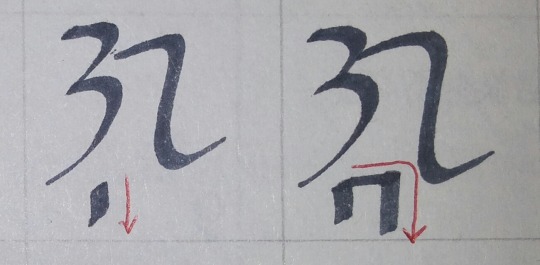
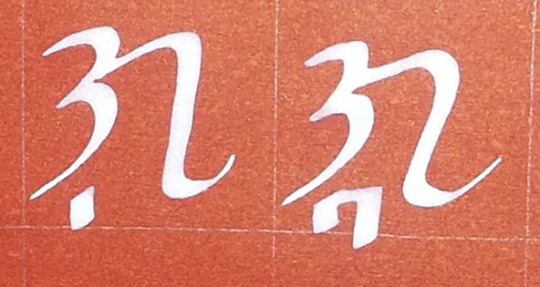
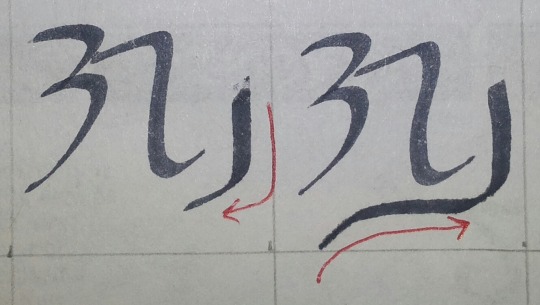
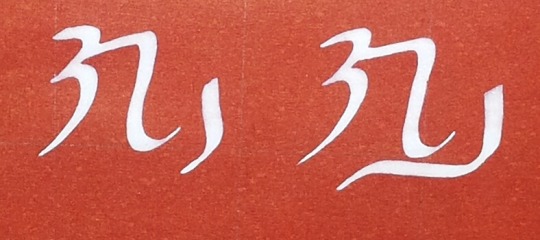
I didn’t make any full sentences or words because I ran out of nice papers, so maybe I’ll post some next time. Sorry. ._.
Author’s final note on writing using baybayin: I’m still on the fence in using the loan letters C, F, J, Ñ, Q, V, X, and Z because in my opinion apart from having redundancies with some other letters, they were just invented to spell out proper nouns that are foreign in origin. I wouldn’t even spell my full name using baybayin, except my nickname and would just rather use the Romaji/Latin Alphabet for ease. As for using baybayin to write foreign words, well, that can be as tricky as using kana to write foreign words. Both methods boil down to localizing a foreign word into how it would be pronounced based on the original language that the writing system belongs to. For instance, the Japanese waifu (as in “My waifu”) is the Japanized form of the English word “wife”, but because their spelling system is a bit different they had to estimate which kana would be suited to approximate how the word would be pronounced and in turn, be spelled. It is also the same case for some Filipino loan words that got Filipinized (and bastardized because long words are hard lol not kidding tho) such as the word istambay which originally came from “standby” and is now shortened to “tambay” which means “just loitering and doing nothing” or in how the young ones use it now: to hang out with friends (and probably just loiter and do nothing lol don’t kill me ok?). Thus, the usage of baybayin (or kana, or hangul, or Arabic because I think their writing is very lovely or whatever writing system you like that works as syllables more than letters) in writing words from another language would take extra steps such as following the rules of the written language or localizing the word first before writing them in whatever letters or syllables that you want. It’s like using what you have then making do with it/winging it out.
The End!!!! No just kidding. But it’s the last part.
To be honest there are a lot of stuff in the internet about baybayin so I’m not that entirely sure if what I have here is pretty much redundant or not. There are a lot of sites so just use your Googling skills to find what you need, although it may be a bit difficult for readers/users who simply try writing and not understanding the entire language so just use with caution. It’s hard to end up with THAT tough guy who has a kanji tattoo that actually spells “poop” instead of whatever it was supposed to be. I actually saw a guy sporting a tattoo that reads FUUBEN in Japanese, which translates to inconvenience. I lol deep inside but the guy seems happy with that so I just let him be.
Well, I hope this long-ass post helped you a lot, or at the very least the stuff made sense to you and it was worth your time reading. Please leave an ask if you have other questions, I’ll try to answer them if and when I can. Have a great day and may the force be with you. =D
#how to write baybayin#how to write alibata#how i write baybayin#baybayin handwriting#baybayin handwriting stroke order#baybayin calligraphy stroke order#baybayin calligraphy
6 notes
·
View notes
Text
K-12 Words
K
dry
wet
shoe
ten
long
stay
yellow
watch
inch
cup
time
words
same
six
bones
black
child
ear
most
page
work
white
five
arms
snow
main
nine
water
head
eggs
rain
test
seven
root
law
fall
cow
red
doctor
baby
feet
room
rule
one
blue
dark
legs
wind
skin
ball
green
two
ever
car
body
box
orange
gave
door
four
europe
picture
wish
purple
ready
try
neck
brown
through
sky
grass
air
sign
whether
dance
pink
eight
drive
too
sat
gray
three
hit
man
love
hand
the
of
and
a
to
in
is
you
that
it
he
was
for
on
are
as
with
his
they
I
at
be
this
have
from
or
had
by
but
not
what
all
were
we
when
your
can
said
there
use
an
each
which
she
do
how
their
if
will
up
other
about
out
many
then
them
these
so
some
her
would
make
like
him
into
has
look
more
write
go
see
number
no
way
could
people
my
than
first
been
called
who
oil
sit
now
find
down
day
did
get
come
made
may
part
1.1
anything
syllables
past
describe
winter
even
also
eleven
moon
fruit
sand
apple
women
nose
solve
Math problem
plus
minus
equals
stone
pants
shirt
starry
thousand
divided
just
train
shall
held
short
lay
dictionary
twelve
suddenly
mind
race
clothes
learn
picked
probably
raised
finished
end
plaid
years
bill
place
hundred
different
drop
came
river
milk
beautiful
square
lake
hole
fingers
flat
sea
type
over
new
sound
take
only
little
work
know
live
me
back
give
most
very
after
things
our
name
good
sentence
man
think
say
great
where
help
through
much
before
line
right
too
means
old
any
same
tell
boy
follow
want
show
around
form
three
small
1.2
interest
job
because
such
think
thirteen
subject
answer
letter
meet
north
length
need
times
divide (by)
times table
edge
soft
months
present
energy
point
sound
log
south
wide
members
exercise
flowers
set
found
things
heart
cause
site
brother
teacher
live
read
billion
another
distance
written
kept
direction
developed
wall
east
happy
million
world
must
house
turn
west
change
well
twenty
felt
put
end
does
large
big
even
here
why
ask
went
men
land
different
home
us
move
try
kind
hand
picture
again
off
dress
play
spell
air
away
animal
page
mother
study
still
learn
should
America
2.1
paragraph
weather
window
third
believe
discovered
simple
gone
paint
new
store
form
cells
matter
follow
perhaps
cannot
good
means
around
line
center
kind
reason
move
forest
sentence
return
instruments
beside
represent
wild
study
back
farmers
sum
difference
product
quotient
remainder
mother
animal
land
region
record
summer
general
caterpillar
scratch
modern
adjust
passenger
promise
equal
creak
almost
croak
book
dainty
song
high
every
near
add
food
between
own
below
country
plant
last
school
father
keep
tree
never
start
city
earth
eyes
light
thought
head
under
story
saw
left
don’t
few
while
along
might
close
something
seem
next
hard
open
example
begin
life
always
those
both
paper
together
got
group
often
run
2.2
misty
poor
caution
pest
phrase
life
startle
squirm
alone
centaur
rise
mountain
above
illustrator
footprint
temperature
decorate
country
sweat
sometimes
hair
smiled
everything
began
thick
compass
themselves
enough
took
although
splendid
crowded
second
act
attach
sly
talk
wonder
let’s
whirl
someone
Africa
borrow
beat
belong
blink
per
fasten
pain
begin
drenched
bed
shell
free
earth
tiny
slippery
count
factors
important
until
children
side
feet
car
mile
night
walk
white
sea
grow
river
four
carry
state
once
book
hear
stop
without
late
miss
idea
eat
face
watch
far
Indian
real
almost
let
girl
mountains
cut
young
soon
list
song
being
leave
family
it’s
3.1
drowsy
bashful
hatch
glad
copy
possible
wicked
grin
sibling
shovel
run
verb
sail
polish
ride
young
steep
case
Indian
laughed
soil
appear
bolts
costume
melody
narrow
behave
howl
example
flee
together
lot
filthy
alarm
spiral
selfish
idea
conductor
fight
rolled
middle
glacier
tree
dizzy
gather
sneaky
already
construct
every
miss
lively
metal
couldn’t
gold
plant
mask
chat
nation
hear
either
bundle
section
near
rescue
face
divide
sob
celebrate
family
loosen
jealous
crash
chimney
daily
own
cozy
ripe
cut
son
natural
serious
carry
care
paper
broken
cue
within
body
music
color
stand
questions
fish
area
mark
horse
birds
problem
complete
room
knew
since
ever
piece
told
usually
didn’t
friends
easy
heard
order
red
door
sure
become
top
ship
across
today
during
short
better
best
however
low
hours
black
products
happened
whole
measure
remember
early
waves
reached
3.2
being
instead
ache
exactly
hard
speed
buy
age
late
artistic
close
affordable
fraction
eyes
appetite
complain
sleep
seem
eat
below
remove
rusty
grow
glum
stormy
trust
enormous
scale
open
add
grab
upset
weed
denied
expensive
story
terrified
lead
jumped
died
basket
side
bear
bend
list
tomb
while
batch
grateful
father
gleaming
dress
light
sprinkle
amount
exclaim
result
yank
leave
cheat
whimper
angle
outside
remain
heap
champion
surprise
dodge
moment
fancy
squeeze
pretend
village
shriek
city
thunder
rapid
iron
striped
don’t
attitude
bell
hat
tug
isn’t
applause
children
honest
cross
spring
freezing
listen
wind
rock
space
covered
fast
several
hold
himself
toward
five
step
morning
passed
vowel
true
hundred
against
pattern
numeral
table
north
expert
slowly
money
map
farm
pulled
draw
voice
seen
cold
cried
plan
notice
south
sing
war
ground
fall
king
town
I’ll
unit
figure
certain
field
travel
wood
fire
upon
4.1
pattern
cave
hope
mile
group
travel
blush
killed
seed
bottom
hide
important
let
ticket
timid
pounds
restart
silent
cranky
keep
real
bright
quite
curved
repeat
trip
without
dart
consonant
mountains
quiet
apologize
roar
grip
groan
bolt
food
injury
century
exhausted
cabin
atmosphere
floor
it’s
scold
transportation
delighted
giant
hill
something
build
fog
method
rough
left
everyone
obey
deserve
speak
therefore
soon
french
switch
until
pushed
state
knob
hobby
between
surround
collect
fire
I’ll
arrive
road
happened
certain
top
order
astronomy
inches
club
catch
farm
nibble
color
yourself
received
connect
told
gaze
check
wear
English
half
ten
fly
gave
box
finally
wait
correct
oh
quickly
person
became
shown
minutes
strong
verb
stars
front
feel
fact
street
decided
contain
course
surface
produce
building
ocean
class
note
nothing
rest
carefully
scientists
inside
wheels
stay
green
known
island
week
less
machine
base
ago
stood
4.2
round
award
crowd
slowly
yet
products, goods, services
vowel
himself
strange
whose
draw
team
hold
feel
flood
sent
save
stood
yard
notice
warn
enemy
deep
please
flap
coast
music
wrote
safe
blast
behind
island
lizard
figure
famous
garden
correct
whisper
listen
joined
clear
share
net
thus
calf
maybe
cried
piece
fold
seen
england
decided
bank
fell
pair
control
clean
telescope
trouble
glass
float
morning
horse
produce
course
hunting
rest
step
statement
contain
shouted
filled
zigzag
accident
cents
instrument
fly
single
express
visit
desert
seeds
chew
dome
experiment
break
gravity
against
branch
size
low
plane
system
ran
boat
game
force
brought
understand
warm
common
bring
explain
dry
though
language
shape
thousands
yes
equation
government
heat
full
hot
check
object
am
rule
among
noun
power
cannot
able
six
dark
ball
material
special
heavy
fine
circle
include
built
5.1
mark
wealthy
row
feeling
across
attention
ran
map
students
inside
design
art
mouth
ring
skill
hot
during
shelter
full
till
log (book)
blossom
discard
bring
quickly
scientists
party
town
covered
wise
early
cram
grain
harm
goal
pause
inform
heal
clue
fame
freeze
badge
pimple
dim
missionary
diet
dumb
rod
march
agree
stick
government
bulb
mall
ban
greed
skiing
poison
stove
image
grew
fact
material
dangerous
flow
gap
ago
stack
explain
didn’t
strong
voice
true
drawing
surface
gift
corner
cloud
since
king
dawn
pulled
dozen
friends
greedy
burning
upon
knew
insect
decimal
nervous
pay
foot
weak
smooth
aware
steady
serve
lost
nonetheless
beach
front
atlas
questions
less
cost
slight
motor
banner
wire
area
carefully
separate
equation
local
minutes
fast
table
plan
fine
waves
fair
sing
dive
suppose
boat
thousands
shape
among
toward
gas
factory
birds
wait
understand
sure
ship
report
captain
human
game
history
reflect
special
brave
bounce
though
else
can’t
matter
square
syllables
perhaps
bill
felt
suddenly
test
direction
center
farmers
ready
anything
divided
general
energy
subject
Europe
moon
region
return
believe
dance
members
picked
simple
cells
paint
mind
love
cause
rain
exercise
eggs
train
blue
wish
drop
developed
window
difference
distance
heart
site
sum
summer
wall
forest
probably
5.2
include
cage
language
base
red
brain
building
feast
better
built
demolish
excess
leap
tower
ocean
plains
cold
claw
information
scholar
climbed
woman
worry
strand
heavy
herd
common
ground
damp
pack
choose
president
least
increase
half
english
invent
class
measure
dash
tremble
object
become
doubt
became
bare
wheels
continued
shiver
engine
core
couple
business
stars
week
peak
numeral
brought
nothing
touch
reached
uncle
symbols
however
rumor
evening
inasmuch (as)
force
curious
heat
career
system
valley
dust
flock
spray
robber
practice
lonely
remember
luxury
warm
heard
calm
rock
frighten
leader
difficulty
best
gum
cheer
key
support
universe
stream
bit
usually
fish
parade
balance
money
note
cliff
stand
proof
you’re
pale
machine
complete
cool
shown
street
today
shy
easy
several
search
unit
war
power
caught
settle
itself
fuel
mention
fresh
planet
plane
straight
period
person
able
direct
space
wood
seal
field
circle
lady
board
besides
hours
passed
known
whole
similar
underline
main
winter
wide
written
length
reason
kept
interest
arms
brother
race
present
beautiful
store
job
edge
past
sign
record
finished
discovered
wild
happy
beside
gone
sky
grass
million
west
lay
weather
root
instruments
meet
third
months
paragraph
raised
represent
soft
whether
clothes
flowers
shall
teacher
held
describe
drive
appreciate
structure
visible
artificial
6.1
afraid
absorb
british
seat
fear
stretched
furniture
sight
oxygen
coward
rope
clever
yellow
albeit
confess
passage
france
fan
cattle
spot
explore
rather
active
death
effect
mine
create
wash
printed
process
origin
rose
swift
woe
planets
doze
gasp
chief
perform
triumph
value
substances
tone
score
predict
property
movement
harsh
tube
settled
defend
reverse
ancient
blood
sharp
border
fierce
plunge
consider
terms
vision
intend
total
schedule
attract
average
intelligent
corn
dead
southern
glide
supply
convince
send
continent
brief
mural
symbol
crew
chance
suffix
habit
insects
entered
nursery
especially
spread
drift
major
fig
diagram
guess
wit
sugar
predator
science
necessary
moisture
park
ordeal
nectar
fortunate
flutter
gun
forward
globe
misery
molecules
arctic
won’t
actually
addition
washington
cling
rare
lie
steel
pastime
soldiers
chill
accordingly
capital
prevent
solution
greek
sensitive
electric
agreed
thin
provide
indicate
northern
volunteer
sell
tied
triangle
action
opposite
shoulder
imitate
steer
wander
except
match
cross
speak
solve
appear
metal
son
either
ice
sleep
village
factors
result
jumped
snow
ride
care
floor
hill
pushed
baby
buy
century
outside
everything
tall
already
instead
phrase
soil
bed
copy
free
hope
spring
case
laughed
nation
quite
type
themselves
temperature
bright
lead
everyone
method
section
lake
iron
within
dictionary
bargain
loyal
resource
struggle
vary
capture
exclaim
gloomy
insist
restless
shallow
shatter
talent
atmosphere
brilliant
endure
glance
precious
unite
certain
clasp
depart
journey
observe
superb
treasure
wisdom
6.2
prepared
journey
trade
delicate
arrived
track
cotton
hoe
furnish
exciting
view
grasp
level
branches
privilege
limit
wrong
enable
ability
various
moreover
spoil
starve
dollars
digest
advice
sense
accuse
pretty
wasn’t
industry
adopt
loyal
suggested
blow
treasure
cook
adjective
doesn’t
wings
tools
crops
loud
smell
frail
wisdom
fit
expect
ahead
lifted
deed
device
weight
gradual
respect
interesting
arrange
particular
compound
examine
cable
climate
division
individual
talent
fatal
entire
advantage
opponent
wouldn’t
elements
column
custom
enjoy
grace
theory
suitable
wife
shoes
determine
allow
marsh
workers
difficult
repeated
thrill
position
born
distant
revive
magnificent
shop
sir
army
struggled
deal
plural
rich
rhythm
rely
poem
company
string
locate
church
mystify
elegant
led
actual
responsible
japanese
huge
fun
meat
observe
swim
office
chart
avoid
factories
block
called
experience
win
crumple
brilliant
located
pole
bought
conditions
sister
details
primary
survey
truck
recall
disease
radio
rate
scatter
decay
signal
approach
launch
hair
age
amount
scale
pounds
although
per
broken
moment
tiny
possible
gold
milk
quiet
natural
lot
stone
act
build
middle
speed
count
consonant
someone
sail
rolled
bear
wonder
smiled
angle
fraction
Africa
killed
melody
bottom
trip
hole
poor
let’s
fight
surprise
French
died
beat
exactly
remain
fingers
clever
coast
explore
imitate
pierce
rare
symbol
triumph
ancient
cling
disturb
expose
perform
remote
timid
bashful
brief
compete
consider
delightful
honor
reflex
remark
brink
chill
conquer
fortunate
fury
intend
pattern
vibrant
wit
7.1
capture
remark
western
outcome
risk
current
bold
compare
resident
ambition
arrest
furthermore
desire
confuse
accurate
disclose
considerable
contribute
calculate
baggage
literacy
noble
era
benefit
orchard
shabby
content
precious
manufacture
dusk
afford
assist
demonstrate
instant
concentrate
sturdy
severe
blend
vacant
weary
carefree
host
limb
pointless
prepare
inspire
shallow
chamber
vast
ease
attentive
source
frantic
lack
recent
distress
basic
permit
threat
analyze
distract
meadow
mistrust
jagged
prefer
sole
envy
hail
reduce
arena
tour
annual
apparent
recognize
captivity
burrow
proceed
develop
humble
resist
peculiar
response
communicate
circular
variety
frequent
reveal
essential
disaster
plead
mature
appropriate
attractive
request
congratulate
address
destructive
fragile
modest
attempt
tradition
ancestor
focus
flexible
conclude
venture
impact
generosity
routine
tragic
crafty
furious
blossom
concern
ascend
awkward
master
queasy
release
portion
plentiful
alert
heroic
extraordinary
frontier
descend
invisible
coax
entrance
capable
peer
terror
mock
outstanding
valiant
typical
competition
hardship
entertain
eager
limp
survive
tidy
antonym
duplicate
abolish
approach
approve
glory
magnificent
meek
prompt
revive
watchful
wreckage
audible
consume
glide
origin
prevent
punctuate
representative
scorn
stout
woe
arch
authentic
clarify
declare
grant
grave
opponent
valid
yearn
admirable
automatic
devotion
distant
dreary
exhaust
kindle
predict
separation
stunt
7.2
evade
debate
dedicate
budge
available
miniature
petrify
pasture
banquet
pedestrian
solitary
decline
reassure
nonchalant
exhibit
realistic
exert
abuse
dictate
minor
monarch
concept
character
strategy
soar
beverage
tropical
withdraw
challenge
kin
navigate
purchase
reliable
mischief
solo
combine
vivid
aroma
spurt
illuminate
narrator
retain
excavate
avalanche
preserve
suspend
accomplish
exasperate
obsolete
occasion
myth
reign
sparse
gorge
intense
revert
antagonist
talon
aggressive
alternate
retire
cautiously
blizzard
require
endanger
luxurious
senseless
portable
sever
compensate
companion
visual
immense
slither
guardian
compassion
escalate
detect
protagonist
oasis
altitude
assume
seldom
courteous
absurd
edible
identical
pardon
approximate
taunt
achievement
homonym
hearty
convert
wilderness
industrious
sluggish
thrifty
deprive
independent
bland
confident
anxious
astound
numerous
resemble
route
access
jubilation
saunter
hazy
impressive
document
moral
crave
gigantic
bungle
prefix
summit
overthrow
perish
visible
translate
comply
intercept
feeble
exult
compose
negative
suffocate
frigid
synonym
appeal
dominate
deplete
abundant
economy
desperate
diligent
commend
boycott
jovial
onset
burden
fixture
objective
siege
barrier
conceive
formal
inquire
penalize
picturesque
predator
privilege
slumber
advantage
ambition
defiant
fearsome
imply
merit
negotiate
purify
revoke
wretched
absorb
amateur
channel
elegant
grace
inspect
lame
tiresome
tranquil
boast
eloquent
glisten
ideal
infectious
invest
locate
ripple
sufficient
uproar
8.1
apprehensive
dialogue
prejudice
marvel
eligible
accommodate
arrogant
distinct
knack
deposit
liberate
cumulative
consequence
strive
salvage
chronological
unique
vow
concise
influence
lure
poverty
priority
legislation
significant
conserve
verdict
leisure
erupt
beacon
stationary
generate
provoke
efficient
campaign
paraphrase
swarm
adhere
eerie
mere
mimic
deteriorate
literal
preliminary
solar
soothe
expanse
ignite
verge
recount
apparel
terrain
ample
quest
composure
majority
collide
prominent
duration
pursue
innovation
omniscient
resolute
unruly
optimist
restrain
agony
convenient
constant
prosper
elaborate
genre
retrieve
exploit
continuous
dissolve
dwell
persecute
abandon
meager
elude
rural
retaliate
primitive
remote
blunder
propel
vital
designate
cultivate
loathe
consent
drastic
fuse
maximum
negotiate
barren
transform
conspicuous
possess
allegiance
beneficial
former
factor
deluge
vibrant
intimidate
idiom
dense
awe
rigorous
manipulate
transport
discretion
hostile
clarity
arid
parody
boisterous
capacity
massive
prosecute
declare
stifle
remorse
refuge
predicament
treacherous
inevitable
ingenious
plummet
adapt
monotonous
accumulate
reinforce
extract
reluctant
vacate
hazardous
inept
diminish
domestic
linger
context
excel
cancel
distribute
document
fragile
myth
reject
scuffle
solitary
temporary
veteran
assault
convert
dispute
impressive
justify
misleading
numerous
productive
shrewd
strategy
villain
bluff
cautious
consist
despise
haven
miniature
monarch
obstacle
postpone
straggle
vivid
aggressive
associate
deceive
emigrate
flexible
glamour
hazy
luxurious
mishap
overwhelm
span
blemish
blunt
capable
conclude
detect
fatigue
festive
hospitality
nomad
supreme
8.2
exclude
civic
compact
painstaking
supplement
habitat
leeway
minute
hoax
contaminate
likeness
migration
commentary
extinct
tangible
originate
urban
unanimous
subordinate
collaborate
obstacle
esteem
encounter
futile
cordial
trait
improvises
superior
exaggerate
anticipate
cope
evolve
eclipse
dissent
anguish
subsequent
sanctuary
formulates
makeshift
controversy
diversity
terminate
precise
equivalent
pamper
prior
potential
obnoxious
radiant
predatory
presume
permanent
pending
simultaneously
tamper
supervise
perceived
vicious
patronize
trickle
stodgy
rant
oration
preview
species
poised
perturb
vista
wince
yearn
persist
shirk
status
tragedy
trivial
snare
vindictive
wrath
recede
peevish
rupture
unscathed
random
toxic
void
orthodox
subtle
resume
sequel
upright
wary
overwhelm
perjury
uncertainty
prowess
utmost
throb
pluck
pique
vengeance
pelt
urgent
substantial
robust
sullen
retort
ponder
whim
saga
sham
reprimand
vocation
assimilate
dub
defect
accord
embark
desist
dialect
chastise
banter
inaugurate
ovation
barter
muse
blasé
stamina
atrocity
deter
principal
liberal
epoch
preposterous
advocate
audacious
dispatch
incense
deplore
institute
deceptive
component
subside
spontaneous
bonanza
ultimate
wrangle
clarify
hindrance
irascible
plausible
profound
infinite
accomplish
apparent
capacity
civilian
conceal
duplicate
keen
provoke
spurt
undoing
vast
withdraw
barrier
calculate
compose
considerable
deputy
industrious
jolt
loot
rejoice
reliable
senseless
shrivel
alternate
demolish
energetic
enforce
feat
hearty
mature
observant
primary
resign
strive
verdict
brisk
cherish
considerate
displace
downfall
estimate
humiliate
identical
improper
poll
soothe
vicinity
abolish
appeal
brittle
condemn
descend
dictator
expand
famine
portable
prey
thrifty
visual
9.1
stance
vie
instill
exceptional
avail
strident
formidable
rebuke
enhance
benign
perspective
tedious
aloof
encroach
memoir
mien
desolate
inventive
prodigy
staple
stint
fallacy
grope
vilify
recur
assail
tirade
antics
recourse
clad
jurisdiction
caption
pseudonym
reception
humane
ornate
sage
ungainly
overt
sedative
amiss
convey
connoisseur
rational
enigma
fortify
servile
fastidious
contagious
elite
disgruntled
eccentric
pioneer
abet
luminous
era
sleek
serene
proficient
rue
articulate
awry
pungent
wage
deploy
anarchy
culminate
inventory
commemorate
muster
adept
durable
foreboding
lucrative
modify
authority
transition
confiscate
pivotal
analogy
avid
flair
ferret
decree
voracious
imperative
grapple
deface
augment
shackle
legendary
trepidation
discern
glut
cache
endeavor
attribute
phenomenon
balmy
bizarre
gullible
loll
rankle
decipher
sublime
rubble
renounce
porous
turbulent
heritage
hover
pithy
allot
minimize
agile
renown
fend
revenue
versa
gaunt
haven
dire
doctrine
intricate
conservative
exotic
facilitate
bountiful
cite
panorama
swelter
foster
indifferent
millennium
gingerly
conscientious
intervene
mercenary
citadel
obviously
rely
supportive
sympathy
weakling
atmosphere
decay
gradual
impact
noticeable
recede
stability
variation
approximately
astronomical
calculation
criterion
diameter
evaluate
orbit
sphere
agricultural
decline
disorder
identify
probable
thrive
expected
widespread
bulletin
contribution
diversity
enlist
intercept
operation
recruit
survival
abruptly
ally
collide
confident
conflict
protective
taunt
adaptation
dormant
forage
frigid
hibernate
insulate
export
glisten
influence
landscape
native
plantation
restore
urge
blare
connection
errand
exchange
9.2
feasible
teem
pang
vice
tycoon
succumb
capacious
onslaught
excerpt
eventful
forfeit
crusade
tract
haggard
susceptible
exemplify
ardent
crucial
excruciating
embargo
disdain
apprehend
surpass
sporadic
flustered
languish
conventional
disposition
theme
plunder
ignore
project
complaint
title
dramatic
delivery
litter
experimental
clinic
arrogance
preparation
remind
atomic
occasional
conscious
deny
maturity
closure
stressed
translator
animate
observation
physical
further
gently
registration
suppress
combination
amazing
constructive
allied
poetry
passion
ecstasy
mystery
cheerful
contribution
spirit
failed
gummy
commerce
prove
disagreement
raid
consume
embarrass
preference
migrant
devour
encouragement
quote
mythology
destined
destination
illuminating
struggle
accent
ungrateful
giggle
approval
confidence
expose
scientist
operation
superstitious
emergency
manners
absolutely
swallow
readily
mutual
bound
crisp
orient
stress
sort
stare
comfort
verbal
heel
challenging
advertisement
envious
sex
scar
astonish
basis
accuracy
enviable
alliance
specific
chef
embarrassed
counter
tolerable
sympathetic
gradually
vanish
informative
amaze
royal
furry
insist
jealousy
simplify
quiver
collaborate
dedicated
flexible
function
mimic
obstacle
technique
archaeologist
fragment
historian
intact
preserve
reconstruct
remnant
commence
deed
exaggeration
heroic
impress
pose
saunter
wring
astound
concealed
inquisitive
interpret
perplexed
precise
reconsider
suspicious
anticipation
defy
entitled
neutral
outspoken
reserved
sought
equal
absorb
affect
circulate
conserve
cycle
necessity
seep
barren
expression
meaningful
plume
focused
genius
perspective
prospect
stunned
superb
transition
assume
guarantee
nominate
10.1
install
reticent
corroborate
regretfully
strength
murder
concise
cunning
intention
holy
satire
query
confused
progression
disillusion
background
mundane
abrupt
multiple
enormously
introduce
emulate
harmful
pragmatic
pity
rebut
liberate
enthusiastic
elucidate
camaraderie
disparage
nature
creep
profitability
impression
racist
sobriety
occupy
autonomy
currently
amiable
reiterate
reproduce
cripple
modest
offer
atom
provincial
augment
ungratefully
expansion
yield
rashly
allude
immigration
silence
epitome
exacerbate
somber
avid
dispute
vindicate
collaborate
manufacturer
embellish
superficial
propaganda
incompetent
objective
diminish
statistics
endure
ambivalent
perpetuate
illuminate
phenomenon
exasperate
originality
restrict
anxiety
anthropology
circumstances
aesthetic
manufacturing
conventional
dubious
vulnerable
reality
precedent
entity
success
term
critical
repair
underscore
stepmother
republican
hesitantly
classic
wary
contents
prediction
immediate
invoke
notorious
implicit
excluding
input
skeptical
foster
element
punish
frank
humanity
profound
dessert
orthodox
substance
disappear
encourage
neighborhood
elder
superfluous
naive
ascertain
complacent
resilient
deafening
military
tend
prudent
glare
acceptance
skillfully
induce
monster
beam
gullible
conciliate
vessel
petty
cantankerous
disclose
archaeology
anecdote
disdain
electronics
substantiate
subjective
tourism
advisable
joyful
incredible
provocative
psychological
ruins
discipline
condone
indifferent
misfortune
judgmental
industrialize
tasty
assume
astute
mission
mar
protective
definitely
escape
oppress
shocked
virtual
zealous
endorse
qualification
hostile
eccentric
abstract
disparate
geographical
scrutinize
generalization
tolerate
activity
claim
dogmatic
influential
obsolete
extol
implausible
subsequent
resource
chronic
benevolent
improve
confidential
ambiguous
seriously
dearth
perplex
hatred
throughout
dine
contemporary
evoke
essentially
economic
flagrant
obscure
alleviate
eloquent
dreaadful
clumsy
sympathy
victim
condemn
vigor
condescend
spontaneous
quell
reprehensible
substantially
sleeve
equivocal
ironic
decry
errand
articulate
progressive
eradicate
refreshments
elicit
aspiration
recently
exemplary
bribery
theoretical
disingenuous
partisan
revere
particle
nostalgia
self-aggrandizement
debunk
tyranny
rhetoric
hierarchy
warning
whimsical
venerate
commend
assert
miserable
awful
vibe
constrain
undermine
explicit
differentiate
compliment
scrupulous
contempt
erroneous
ideal
refute
imply
cynical
rash
presume
insight
revival
vary
delay
renounce
indignant
offensive
temperate
circumstantial
export
peep
logo
advertise
suppress
distort
chunk
convoluted
denounce
overwhelming
fertility
rigorous
acquire
arrogant
university
antagonize
profitable
indulgent
strategic
breathing
idiosyncrasy
profession
frugal
discern
accommodation
adversary
incredulous
disturbance
digress
social
belie
roam
smug
continual
pertinent
voluntarily
elite
subtle
blame
sincerity
lick
horror
censure
involvement
candid
infer
futile
impetuous
exploit
bewilder
sustain
diligent
sincere
protect
sealed
musical
empathy
callous
parenthetical
insure
acorn
sarcasm
seize
sacrificially
allege
emphatic
irrelevant
progress
diplomatic
stunned
improvise
deride
reconcile
meticulous
deject
scientifically
incontrovertible
pressure
justify
gloomy
depict
supplant
endurance
analogous
diary
bolster
slip
contemplate
pesticide
glow
religious
advocate
negligent
creator
lament
fundamental
embrace
throne
inherent
inferior
valuable
thrive
trivial
pretense
reserved
capricious
refresh
refusal
flight
boost
explanation
coherent
prevalent
tenacious
official
royalty
assassin
rub
poach
delete
10.2
warrant
circumscribed
somewhat
explosive
optimistic
mandate
previously
detract
opinion
intuitive
feasible
intimate
persistent
humble
simplicity
tempt
deliberate
painful
unethical
fundamentals
discrepancy
remorse
pessimistic
possibility
conclusion
acknowledge
impregnate
soberly
creation
paralyze
suitability
oblige
tranquil
medal
arbitrate
pacify
illusory
susceptible
vibrate
vengeance
infection
democratic
stressful
grave
speculative
sample
identification
stifle
obligation
revenge
organization
namely
mediocre
practical
scream
weaken
consensus
affectionate
deficient
treacherous
console
isolation
ingenious
memory
melodrama
despair
awestruck
composition
regret
recommendation
celebrity
decision
devoid
opaque
ornamentation
longevity
participate
dread
restore
interrogate
aid
accordingly
mislead
embarrassment
optimism
domestic
apt
funds
virtue
geography
fundamentally
thoroughly
press
despite
horrible
chilling
rental
esteemed
disappointment
innovative
contemplation
assign
popularize
haunt
deafen
serene
percent
estrangement
suffer
extravagant
throng
estimate
comment
priesthood
mass
dreadfully
promote
periphery
animated
saying
relate
clarity
triple
derivative
succeed
distortion
register
suicide
improvement
discreet
inquisition
probable
curative
incident
praise
convenience
baffle
covet
dreadful
genuinely
weary
undisturbed
disgruntled
humility
renown
nonchalant
monopoly
comedy
vague
decisive
inconsequential
announcement
fabricated
nevertheless
vigilant
scarce
neglectful
hushed
attainment
tedious
explode
snatch
pslm
agency
sentimental
tension
adhere
meanwhile
sacred
avert
conformity
likewise
challenger
accessible
responsibility
peril
contact
event
roast
fallible
catastrophic
competitor
violate
resolute
deceive
exaggeration
discredit
intolerable
approve
paste
dimly
novelist
demeanor
norm
politician
satisfaction
obvious
vehicle
reservation
defer
involve
restoration
crush
audible
assistant
backpack
attain
inanimate
commemorate
confrontation
emigration
parasite
disperse
quantitative
laughter
policy
vulgar
occasionally
repay
effective
eulogy
starvation
empty
therapeutic
overall
immortal
encompass
inappropriate
opportune
engagement
illustrate
turmoil
observatory
classification
expression
reminiscence
comedian
invention
depress
remedy
protagonist
gesture
texture
diplomatic
election
prolong
conducive
emotional
invigorate
curiosity
expressive
%
K-12 Words was originally published on PinkWrite
0 notes
Text
Transcript Lingthusiasm Episode 6: All the sounds in all the languages - The International Phonetic Alphabet
This is a transcript for Lingthusiasm Episode 6: All the sounds in all the languages - The International Phonetic Alphabet. It’s been lightly edited for readability. Listen to the episode here or wherever you get your podcasts. Links to studies mentioned and further reading can be found on the Episode 6 show notes page.
[Music]
Gretchen: Welcome to Lingthusiasm, the podcast that's enthusiastic about linguistics. I'm Gretchen McCulloch.
Lauren: and I'm Lauren Gawne. And today we're going to be talking about the International Phonetic Alphabet. But first -- it was International Mother Language Day in February and even though it was a couple of weeks ago now on February the 21st, I think it's still worth saying a belated 'Happy Mother Language Day' to you Gretchen!
Gretchen: Happy Mother Language Day to you! Which we are wishing in our of mother languages of English, which is kind of boring.
Lauren: Both wishing it our mother languages. Do you have any other heritage languages that you wish to acknowledge?
Gretchen: I mean, technically Scottish Gaelic is probably a long time ago a mother language for me, but my ancestors were lowland Scots so it's a really long time ago.
Lauren: Well happy Scots Gaelic day
Gretchen: Do you have any other?
Lauren: My grandmaternal language is Polish and thanks to generally typical Australian attitudes towards non-English speaking in the 1960s that wasn't passed on to any of my mother's generation at all. So yeah it's still a very recent part of our family history. I'm the only grandchild who ever learnt enough Polish to speak with my grandmother in her mother tongue
Gretchen: Oh that's cool
Lauren: Which is cool, I wish I still spoke that much
Gretchen: Well I mean it's cool that you learned it, it's not cool that no one else did
Lauren: It's probably questionable how much Polish I remember today. And yeah, I always like to think of my Nan and my lack of opportunities to learn Polish on February 21st. What have you been up to or what's coming up?
Gretchen: Well, by the time this episode goes out I will have been to South by Southwest, where I will have done a panel with Erin Mckean and Jane Solomon and Ben Zimmer
Lauren: How are you not going to like die of fangirling at people?!
Gretchen: Because I've already met all of them anyway?
Lauren: Awwww I'm so jelly
Gretchen: But they're really cool and I'm really excited to be on a panel with them! We're going to be talking about 'Word curation: Dictionaries, tech, and the future' which will happen by the time you guys get this episode so you can check out the hashtag that I'm sure will have some action on it and we'll link to that in the show notes.
Lauren: I'm really excited for that panel. I'm looking forward to it hopefully - is it going to be recorded? Am I going to be able to see it as a non South by Southwest attendee?
Gretchen: I think there's going to be an audio recording on soundcloud that South by Southwest is going to put up online because they've done that for previous years. So I can't promise that they'll do that again but they seem to like doing it in previous years, I don't know why they wouldn't do it again so we'll link to that if we have it.
Lauren: Yay, excellent!
[Music]
Gretchen: So there's a problem when you learn to spell English, which is that it's really hard to spell English.
Lauren: It's really a lifelong learning process as far as I'm concerned
Gretchen: It's a lifelong learning process. You know, some languages don't have spelling bees because their spelling systems are so consistent they don't need them - we can only wish! So, the English spelling system is especially ridiculous, it's got silent letters, it's got something around 14 vowels but only five letters to write them in.
My favorite demonstration of this is that there's a phrase that has all of the English vowels and the phrase goes - I have to have to say it in a non-rhotic accent because it only works that way - the phrase goes 'Who would know aught of art must learn, act and then take his ease'. And each of those words has a different vowel in it.
Lauren: Cool!
Gretchen: And that's one way of remembering the vowels
Lauren: That's a nifty sentence!
Gretchen: Yeah, but if you try to write that down in English it's hard
Lauren: With the English orthography that we have, or the English writing system - orthography - that we have
Gretchen: And spelling systems are also inconsistent across different languages. Even languages that are consistent in themselves are often inconsistent when you compare them with each other. So, some languages use the letter J for the /dʒ/ sound [as in Jane], some languages use it for the /ʒ/ sound like French [Jean], some languages use it for the 'y' /j/ sound like German as in 'Jan' or 'Johann Sebastian Bach', some languages use it for the /x/ sound as in Spanish like 'Juan'. There's a whole bunch of different sounds you can use the same letter for depending on your language
Lauren: There's a really great tumblr post that kind of encapsulates this variety in the ways different alphabets that are based on the same alphabet English is based on, use their orthographies in different ways which we'll link to. When I first read this I was like oh look someone's just posting in Norwegian or Danish or something, but then if you sit there and read it and you know the orthographic conventions in different languages it says something along the lines of 'I wonder if English speakers will notice that I'm writing this in English but using the spelling conventions of my language'
Gretchen: And yeah a whole bunch of people have certain different versions of it - there's a Finnish one which is pretty good, there's an Irish one which is fantastic
Lauren: It's good, because once you know what the phrase is that gives you a feel for what the conventions are in different languages. For example I found the Polish one really easy to read and then for some of the others I was just basically guessing because I knew what the sentence was, and it really nicely illustrates this problem that we have that we all learn different spelling conventions for different languages
Gretchen: And we're not the first people to have noticed this problem! In fact people have been realizing this problem for quite a long time, as long as people have been writing with different systems. And it became especially apparent as writing systems became standardised in the 1700s and 1800s, when dictionaries are becoming popular and people were starting to write in a standardised sort of way and looking at other languages and realising that their standardisations were converging on something different
Lauren: I really love that historically there was no consistent spelling conventions, and so in Old English text we actually have a good idea of the different common literate dialects of people who lived in Mercia or people who live in Cumbria and because the way that they wrote English really reflected the way their accent worked. Once spelling systems became standardized that stopped being the case
Gretchen: It also became really difficult people for who are trying to learn English because even if you learn the spelling systems, then you pronounce the words the way they look and people look at you like "that's not actually how it's pronounced" and you're like "how was I supposed to remember that?" Various people came up with various proposals for spelling reform for either just like a more phonetic way of writing English in total, or for ways of adapting English words so that it could be used for specialised purposes like people who are learning the language, or people who want to write down specific things and annotate exactly how they're said
Lauren: And some people went for massive 'let's create an entirely new alphabet', some people just wanted some small reforms. So Noah Webster is probably one of the people who had the most impressive effect on English especially on American English. It was Webster who decided to take and consistently use conventions like 'i-z-e' instead of 'i-s-e' and using words like colour without the 'u' instead of with the 'u' as part of this attempt to make English spelling more realistically reflect the language that was being spoken
Gretchen: Yeah and there were other British reformers that were trying to do this, so there was a guy named Henry Sweet who came up with an alphabet called the Romic /ɹomɪk/ alphabet or the Romic /ɹɑmɪk/ alphabet, I'm not actually sure how to pronounce the name of this alphabet, which...
Lauren: If only was written down some where in a consistently pronounceable script!
Gretchen: If only! He didn't seem to actually write the name of his own alphabet anywhere in a consistent script so that's a shame. And that was based on mostly Roman letters but with adaptations for sounds that English had and Latin hadn't. And then there was Alexander Ellis who was apparently the real-life origin of Henry Higgins from 'My Fair Lady'
Lauren: Really?!
Gretchen: I dunno, that's what Wikipedia says!
Lauren: Okay, because I'm going to invoke the supremacy of David Crystal, if that's okay. I don't know if Crystal officially trumps Wikipedia, but in his book called 'Wordsmiths and Warriors' he says if Higgins is anyone it has to be Daniel Jones who is a phonetician who is very influential in terms of like codifying the vowel system. So what we think of is the modern International Phonetic Alphabet vowel space kind of started with Daniel Jones' cardinal vowels
Gretchen: I mean I don't know it could have been a composite or something
Lauren: I think to be honest that the most likely is that there was a genre of gentleman academic at the time who's very interested in these topics. Anyway, there was a lot of work being invested in generating some kind of writing system that accurately reflected speech
Gretchen: Yeah and so they made the International Phonetic Association in the late 1800s, which confusingly enough also has the acronym IPA, and they had some meetings and they were like, “yeah, we need to come up with a system for this”
Lauren: So the IPA is where the IPA was created
Gretchen: Yeah I hope they were all drinking IPA but I can't guarantee that
Lauren: In our reenactment that is definitely what's happening
Gretchen: Yeah, when we when we all get dressed up in historic costume (bagsies Henry Sweet), then we will all drink IPA
Lauren: I'm Daniel Jones apparently - no wait, I'm going to dress up as Cardinal Vowel, I always thought that would be a great linguist costume
Gretchen: Ah that's great! Were cardinal vowels invented yet?
Lauren: Well it was Daniel Jones who did that, I don't know when he was working
Gretchen: Oh ok good
Lauren: I mean we'll have to have a whole episode just talking about vowels and how they work, but that was kind of a thing that was figured out at the time
Gretchen: Yeah and they came up with some principles for future development of this International Phonetic Alphabet and these were: each symbol should have its own distinctive sound and the same symbol should be used for the same sound across all languages
Lauren: So instead of having the J sound sounding like /dʒ/ or /ʒ/ or /j/ or /x/ across different languages, every time that sound was used it would be used for exactly the same sound
Gretchen: Every time that *symbol* was used
Lauren: Yes sorry every time that symbol was used it would be used for the same sound
Gretchen: They also came up with some principles that influenced which symbols ended up being chosen for which sounds. So they decided to use as many ordinary Roman letters as possible and to have a very minimal number of new letters, and to use what they called quote unquote “international” usage to decide the sound for each symbol
Lauren: So they wouldn't like, take the symbol that we have for 's' and decide 'oh we're going to make that the sound for 'l' because we're crazy people'
Gretchen: Yeah, they didn't do that. But the other thing is, so if we look at the vowels, the IPA vowels look kind of weird from an English perspective. So the IPA uses the letter that we think of as 'i' to represent the 'ee' /i/ sound and uses the letter we think of as 'e' to represent the 'eh' /e/ sound and so on. And this doesn't make sense for English, but it does make sense when you look at a whole bunch of other languages like Spanish and Italian, and the way the Roman alphabet has been used for non-European languages generally falls along these principles as well. So they said, “Look, even though we're English speakers we're going to not do the English things”
Lauren: Okay, so they really did go with this kind of international general preference
Gretchen: Yeah, I mean, they're still eurocentric, they're still starting with European languages and kind of working their way outwards, but they were at least not completely Anglo-centric, which is helpful here, because English does some weird stuff with its sounds
Lauren: Yeah and we only have 26 letters in the English alphabet, a few more if we kind of pull everything from across European languages, and there are so many more sounds that the world's languages can make, so once we've run out of kind of standard letters where do we go from there?
Gretchen: Where we are from there is often Greek letters or Latinised looking versions of Greek letters because those were familiar to these creators. Another thing that they did was they would rotate letters. and this was partly because the shapes are still familiar if you do that and partly because this is the 1800s and people were typing with metal bits of type. So if you just take a lowercase 'e' and turn it upside down, you can just print your new character by flipping or rotating an existing metal type bit rather than casting a new one
Lauren: I have a really nice example from Australia, so I was at a workshop the other day and a colleague was showing me a booklet of Kamilaroi, so it's a language from the New England area of New South Wales in Australia, and William Ridley was working on this language in 1856. So this is even before the IPA was codified. And these languages have a sound like an English sound but you may not notice it in English because it's a sound at the end of words like 'sing' or 'bring', that /ŋ/ sound, but that sound can occur anywhere so you can have it at the start of the word as well as at the end. This /ŋ/ sound now has a symbol in the IPA that looks like an 'n' with a little tail and it's called an 'engma'
Gretchen: Yeah kind of like an 'n' with a 'g' tail shoved on it
Lauren: Yeah, and Ridley is one of the first people who adopted this symbol for use in his describing languages work in the 1850s, which was before the 1880s when the IPA was established. But this symbol had begun to be used for this /ŋ/ and it makes sense because it's like an 'n' and a 'g' squashed together. But when he sent it to the typesetters for his booklet they didn't have a /ŋ/ and so they just turned a capital 'G' upside down which sounds a bit crazy and it looks a bit crazy it looks like it's just full of upside down 'G's, but it meant that that was a way that they could represent this /ŋ/ sound. Apparently he sent it to some other journal in Europe and they just turned it all into a 'z'
Gretchen: Wow, a 'z'!
Lauren: Yeeeah
Gretchen: Wow, that's really bad! So I guess that's why it's good that another principle the IPA had was that the look of the new letters should suggest the sound they represent, so once you've learned the kind of basic ones and if you see a couple languages and you have a sense of what's used in other languages then you can often guess fairly accurately what an IPA letter is going to be like. So it's better to have a symbol for /ŋ/'that looks like an 'n' and a 'g' shoved together because that's how it's often written in different languages, a bit like an 'n' sound, a bit like a 'g' sound.
Another one of their principles was that diacritics should be avoided where possible. So adding extra little like accent marks or other types of small bits on top of letters was something that they tried to avoid for their basic sounds. Diacritics were only was supposed to be for if there's a modified version of a sound, but not for basic sounds in general. So in the current IPA, you still get these rotated letters, which must make the IPA very difficult for people who are dyslexic; you get small capitals; you get Greek stuff like the Greek letter theta is used for the 'th' /θ/ sound, and the runic and ultimately Icelandic sound /ð/ -- so the symbol that looks like an 'o' with kind of a cross above it, that’s from Icelandic and it used to be in English before the Normans came, that got borrowed back in -- so borrowing from other established systems. Because then you could just go to Iceland and grab some of their metal type bits, I don't know, or go to Greece and get some from them
Lauren: It's something that was a problem with the original metal type but it's also been a problem for a long time with modern software. So for a long time computers didn't really have fonts that expanded beyond the kind of really basic font set of like English and French and some diacritics and some special things. If you have some older software or if you look at older digital documents you have, y’know, people using capital 'A' for particular vowel sounds, vowel characters in the IPA that are symbols in the IPA that aren't in regular type or y’know schwa would be a capital 'E' for example
Gretchen: Yeah you can even see this on some old websites, people will use a different system that only uses the basic 26, plus capitals to do the extra stuff or maybe some places use like an 'at' sign @ to indicate a schwa, because we've also had a different version of this encoding problem with technology
Lauren: So it's not just the metal type it's also modern computing
Gretchen: It's also the byte! It's the type and the byte!
Lauren: The type and the byte have been a problem, it's getting better
Gretchen: It's getting better thanks to Unicode, thanks Unicode! So yeah the first version from 1887 was designed to work for sounds in English, French, and German because that's what they were doing at the time. It's a bit weird compared to the modern IPA because we're used to seeing it as a chart and they just gave a list of symbols and keywords that stuff was found in for various languages. So they'd say something like okay this 'a' symbol is going to be like the sound in English 'father' or this symbol is going to be like the sound in German 'Bach' and they just give the keywords like sometimes you see in the front of the dictionary. And then later, so they kept on working on it in the late 1800s and then by the year they expanded, published a version that included Arabic and a few other languages’ sounds, that’s when they finally publish it as a table for the first time
Lauren: So why would it be in it table, for people who aren't familiar with the International Phonetic Alphabet?
Gretchen: The cool thing about the table is -- so our English alphabet that you learn as a kid is 'ABCD' in no particular order, that's just the order it is, that's just for historical reasons -- but the table is ordered based on how the sounds are produced. So sounds get produced with constriction in various parts of the mouth and with different degrees of constriction once you're in that place
Lauren: So it's a nice feature based table of all the kind of combination of features in particular places
Gretchen: Yeah, exactly. If you superimpose a mouth onto that table, it looks a bit weird but you can kind of do it and you can see where each of the sounds is produced
Lauren: I have a link somewhere to an audible IPA chart so you can click on the sounds and hear what they sound like, but the ones on the very left side are all produced with just the lips like /p/, and the very front of the mouth. And then the ones at the very right edge are all the way back at the far back of the mouth, and that's things like your velar sounds like /g/ get made with that soft bit there or your uvula like right down in the very far back in the mouth
Gretchen: Yeah, it goes from your lips, through your mouth along the roof of your mouth and back into your throat. And the weird thing about this version from 1900 is that it's a mirror image of that so it has 'p' and 'b', your labial sounds on the right instead of on the left
Lauren: Oh no, that would confuse me so much
Gretchen: You can see an image of it on Wikipedia, it's all like typewritten, we'll link to that
Lauren: Wow, awesome
Gretchen: But it looks really weird, and they also have the vowel chart and the consonant chart on the same chart
Lauren: Right, okay!
Gretchen: They just have like a really wide section where the vowels go
Lauren: How weird!
Gretchen: Yeah, which is something else that changed later
Lauren: So there's now a table for the consonants, there's a few consonants that don't even fit, and then there's a vowel chart that's a separate thing, but it's very similar principle like it starts at the front of the mouth and goes back
Gretchen: Yeah, and what's cool is that the version that we use today is actually very very similar to the version that was solidified in 1932, which was quite a while ago. There were some adjustments made in 1989 and then after that it's just like 'oh well we need to add this one symbol because we found some languages that use it' but pretty much it stays very similar for quite a long time once it's established
Lauren: Nice. So it goes from left to right all the different places in the mouth, and then from top to bottom there are different ways just looking at the consonants, the ways to pronounce different consonants so you have the very plosive sounds like /b/, /k/, /d/, /t/ - we call them stops - along one row and your nasal sounds, so your /m/, /n/, /ŋ/, sounds along another row...
Gretchen: It kind of goes in order of how much you need to drop your jaw. So if you think about the sounds in the top row, your mouth is the most closed when you're making like a 'p' or a 'b'. You have to literally close your mouth for a second, you have to close your lips to make those sounds. Whereas if you're making a sound like 'r' /ɹ/ you don't have to actually close anything you're letting the sounds kinda come through. So the 'r' /ɹ/ sounds are near the bottom, but the /p, b/ sounds are near the top
Lauren: I mean that's the thing I found super neat about it when I was studying the IPA in undergrad was just how elegantly it captures all these different parameters in one table
Gretchen: Yeah, just to realize that someone has thought this through, thinking 'ok what are all the permutations you could put your mouth in and which ones do people actually use and let's organize this'
Lauren: And English just uses one subset of it
Gretchen: Yeah, every language is going to pick some subset of the sounds in this table, or if it doesn't we have to add something. So one of the cool things that you can do with the IPA because it's based on different positions the mouth can be in is adapt it to other mouth stuff. For example, Lauren Ackerman, who has the linguistics blog 'Wug Life', has made a table of emoji with their mouth positions as if they're making sounds in the IPA. So you can look at this table and she has things like the surprised emoji, which has kind of a round mouth and so that's like an 'oo' /u/ sound because you have to round your lips for that, and the 'ee' /i/ is kind of like a smile, and it is completely ludicrous but also great
Lauren: These are the important things that linguists do with their downtime
Gretchen: Yeah and the other cool thing you can do with the IPA is because you can use it to represent mouth sounds is you can write beatboxing in IPA, because beatboxing is done with the mouth
Lauren: Oh yeah, that must look amazing!
Gretchen: It looks so cool! I have a picture of it, of a chart that some beatboxing linguist researchers made
Lauren: That is awesome
Gretchen: So we'll link to that too
Gretchen: I mean we both have a lot of love for the International Phonetic Alphabet, obviously it's something we engage with a lot in all varieties of linguistic work. I think it's worth mentioning though that like, it's not perfect for everything, it can get really annoying sometimes.
Gretchen: Yes!
Lauren: Particularly, as I mentioned in terms of the fact that font encoding on computers is still a problem, you still occasionally will get proofs back from a publisher for a journal article and all the engma, they're all mysteriously like really ugly still, we haven't quite got there with them being part of the font set for every single font
Gretchen: Yeah and it can be hard to write on a normal keyboard
Lauren: Yeah it's also really annoying to write on a normal keyboard sometimes. Also especially in the vowels, like I get a bit of like IPA anxiety when I use IPA and share it with people publicly, especially for long passages of text it's not always that easy to transcribe things
Gretchen: Yeah, and as fluent writers we've gotten used to the Byzantine nature of the English spelling system and we we also know how to talk, but thinking about how you talk in a more conscious way to say 'what sound am I saying here, what sound am I saying there' -- that’s different. So it can be hard to write extended passages in IPA. I know if I make a blog post that has an English sentence or two in IPA, I'll inevitably get some corrections from a linguist or something that says “I think you're probably producing this sound here” and I'm like “Oh yeah you're right” because there's no spellcheck for IPA
Lauren: Yeah and also even if there were a spellcheck, you and I would produce different IPA transcriptions for our own pronunciation of things
Gretchen: Yeah and we're pretty good with understanding people's different pronunciations of things when we're hearing them, because I guess humans have a lot of evolutionary practice at that, but for reading things we have a fairly standardised system. I remember when I was still a young linguist back when John Wells's phonetic blog was active. He's a well-known British linguist who's involved in some of the history of the IPA and he used to keep a blog and he would sometimes write full posts in IPA. And they were really interesting for me to read, to practice but I also found them very difficult because he would be transcribing his own accent. And he was British and so he wouldn't write all these 'r' /ɹ/ after vowels that I would, so I had to figure out where all these /ɹ/ were supposed to be. I'd end up reading his post out loud to myself and hearing the British accent being like “oh yeah this is what he's trying to say”
Lauren: You would be saying it in his accent?
Gretchen: Yeah, I'd be saying it in his accent, because you can write someone's accent, which is the cool thing but also the more challenging thing about reading IPA
Lauren: Linguists also talk about broad IPA and narrow IPA transcription - so like, you can do a kind of rough-and-ready, mostly correct transcription, or actually if you are a phonetician and you're looking really closely at how people actually articulate things, you discover all kinds of things that you need to transcribe to capture the correct and accurate transcription but which people don't hear kind of consciously or would find really weird when you've represented it to them
Gretchen: Yeah or don't notice
Lauren: And there's often like phonological processes, like when you tell people that the vowel that they use in the middle of 'handbag' is actually, for native speakers if they say it quickly, it often becomes 'hambag'
Gretchen: 'hambag', like a ham sandwich
Lauren: Yeah, like a bag-o-ham. If you write it out in IPA, people are like ‘that's incorrect,’ and you're like 'well that's what you said'
Gretchen: There's a fun story about that, so English speakers also often say 'sammich' instead of 'sandwich' because the 'm' the like the nasal sound becomes like the 'w'. Except for Anglo-Italians; so in Canada there's like Italian Torontonians and Italian Montrealers and people who grew up in those communities often have a particular accent. So in that accent they say 'sangwich' instead of sammich' because in Italian the 'w' sound is kind of more velar whereas in English it's more labial and so it like pulls the nasal along with it to be a different sound
Lauren: And when you start transcribing things in really close IPA you can see those distinctions, it's really cool
Gretchen: Yeah and we often just reduce the vowels in words that we’re saying quickly or in the small unimportant function words we often reduce the vowels all to schwa or something like that
Lauren: I still remember in in my undergraduate class learning that English vowels will often change into schwa, this is the /ə/ sound in unstressed syllables and it just made me realize that for a certain set of words, that's why I was really bad at spelling them. Because you sit there and you're like 'is it amu... amuni ammunition?'. I mean, is it ammunitiON or is it ammunitiAN? That’s not a great word to use as an example but it's the first one that came to mind. For certain vowels, because it's unstressed and it's a schwa, it’s possible that any of the vowel letters could be used to spell it. So you just have to memorize what the spelling is because your pronunciation doesn't help you. And that's why I tell people I'm bad at English spelling - it’s not my fault, it's the fault of my stress system and orthography!
Gretchen: The other thing is, is sometimes English orthography gives you useful cues to distinguish between certain words or when a suffix who's added sometimes the stress changes and you have to recover vowels that are kind of there but had turned into schwa. So if you take a word like 'electric' which becomes 'electricity' - in some senses it's weird that it's spelled with a 'c' and not with a 'k' or an 's' because 'c' is completely redundant, it always makes one of those two sounds, but it does reflect that when it's 'electric' with the 'k' sound and then when you add an '-ity' to it, the 'k' sound becomes an 's' sound because that's what happens with 'c', but it doesn't happen with 'k'. Or the vowels also change - with 'electric', 'electricity' you get different sorts of vowels. So it's kind of useful to have some of this stuff there that was historically there and has changed in its sound. But it also creates this extra layer of complication. Or you can get used to speed reading because a word always looks like the same in spelling whereas if you had to speed read a whole bunch of different accents then an unfamiliar accent might be harder to speed read, but then again it's harder to learn spelling in the first place if you have an accent that's less similar to the spelling system
Lauren: But we still love the IPA for all of the occasional detriments that occur
Gretchen: We still love it and it's still useful to have it as an option to write something very specifically even if you don’t want to do that all the tim. I find if I'm meeting somebody and they have a name I haven't heard before, then I write it in IPA and then I can pronounce it correctly when I'm talking back to them. People like it when you pronounce their names correctly.
Lauren: That's handy. The Journal of the International Phonetic Association used to accept articles written in IPA, which blows my mind. So people would write about some feature of phonetics and they would do the whole thing in the IPA. I think it very quickly became apparent that that was more labour both to produce and to consume than there was any benefit in doing that, for many of the reasons that we've already mentioned
Gretchen: Like, 'hi I'm going to write about like long vowels in Sussex' or something and that whole thing would be in IPA
Lauren: Yes, I think academics clearly had more time on their hands 50 years ago.
Gretchen: I mean, to be fair, I have played IPA Scrabble, which is like Scrabble, but you do it in IPA
Lauren: Do you just kind of argue for your own pronunciation or do you have to do it in your own dialect?
Gretchen: The way that I've done it is I combined IPA Scrabble with Descriptivist Scrabble, which is a little bit like those bluffing games, so as long as you can convince other people that it's a word then it's a word
Lauren: Ah, I like that
Gretchen: Yeah, because like, dictionaries are arbitrary authorities anyway, so with Descriptivist Scrabble you can just use whatever means you have at your disposal to convince people that it's a word. Of course choosing an obvious word like dog or something is going to be easier to convince people than saying--
Lauren: blergh?
Gretchen: Yeah, than saying “blerg is a word, honestly it means a colour kind of like grey and blue at the same time” but you can try!
Lauren: There are heaps of cool things people have done with the IPA including someone has made a set of IPA Scrabble
Gretchen: Yeah so I posted on All Things Linguistic a set of frequencies and scores that you can use for IPA Scrabble tiles, because I made it with a friend in undergrad and we had figured this out. We just cut out bits of cardboard to make them, and then some undergrads at Yale came across this post and decided to get their friend who has like a wood cutting machine to cut these out of these gorgeous wood tiles and they sent me some photos which I've also posted. You can see those on the blog, they're amazing, so yeah so someone has made a wooden IPA set that I still have not played but it’s really cool
Lauren: IPA characters also make for popular tattoos because they're quite beautiful, so I've definitely seen a schwa tattoo and I've seen a glottal stop which is a little bit like a question mark - it's our logo!
Gretchen: It is also our logo. Do people get whole words in IPA or like phrases in IPA tattooed on them?
Lauren: Mmm I haven't seen any but if anyone has we will definitely be interested in seeing it
Gretchen: If you know any IPA tattoos please send them to us
Lauren: Well I've seen a couple but not that long
Gretchen: There's also a whole version of Alice in Wonderland that's published in IPA - so this takes us back to the Journal of Phonetics - and she's like talking to the Mad Hatter and so on and it's all in IPA. The weird thing about this particular version is that this publisher decided to also have capital letters
Lauren: Huh, interesting
Gretchen: And of course they had to make capital versions for all of the IPA letters
Lauren: Wow, that's commitment
Gretchen: Because you know if you think about it capitals are redundant, they don't add any extra phonetic information to a sound, so the IPA doesn't use them. And sometimes the IPA uses small cap versions of a letter to indicate a different sound because it's an extra symbol. And so instead this person decided that no, if I'm going to write it as a book I'm going to make capitals and so yeah it's very interesting how they decided them.
Lauren: Yeah, there you go. My IPA nerd craft activity was to cross stitch the consonant chart, I did that quite a few years ago and it's a very useful adornment in the office when you just need to quickly refer to some of the symbols. I also was going to do the vowel chart but the modern vowel chart is very very complicated and messy which is why I went with Jones's much more elegant original cardinal vowels
Gretchen: Ahh so you did a simplified version
Lauren: Yep I'll put links to those in the show notes
Gretchen: And you also did a cookie cutter, right?
Lauren: Oh yeah! I made a schwa cookie cutter for Christmas last year, just what you need, and it's a 3D printable cookie cutter, so you can also download that design and print your own and make your own gingerbread schwa or shortbread schwas.
Gretchen: That's great. There's also an IPA version of the game 2048, which came out when the game 2048 was popular - so that's the one where you like slide the tiles around and you try to combine to make bigger and bigger things. And so you start with a schwa and then you combine them to make an engma, which makes no sense phonetically, and then you combine them to make an esh. Again, this won't teach you anything about phonetics
Lauren: But it goes into more and more elaborate and less frequent forms
Gretchen: Yeah it does get to more and more elaborate stuff, like you end up with like a glottalised bilabial click or something like that
Lauren: Right, it doesn't officially teach you anything about the IPA but it is a good excuse for a distraction
Gretchen: You should not do it if you're a student and you're about to write an exam on the IPA, this is not a good way to procrastinate
Lauren: Official warning!
Gretchen: Instead you should play IPA scrabble
Lauren: Much better way!
Gretchen: Which will teach you some more about the IPA
Lauren: Or read Alice in Wonderland
Gretchen: There's also a fun sketch from the sketch comedy show John Finnemore's Souvenir Programme, which is a sketch where some characters encounter some skeletons and the skeletons are pirates but these skeletons cannot tell you that there are pirates because they don't have any lips, so they cannot produce the 'p', sound so they call themselves 'kirates',
Lauren: Awww
Gretchen: And the characters who encounter them are very confused, like 'what are you?' 'we're kirates, I said we're kirates!'. Anyway, I am probably not doing it justice but you should listen to it, we have a link to that as well
Lauren: Excellent
Gretchen: Although they don't make the point which I kept thinking, which was like 'Well, if the don't have any lips, they probably don't have any tongues either, so they probably can't produce any sounds because they're skeletons'
Lauren: They probably don't have any kind of pulmonic air flow ability
Gretchen: Like all they can do is clack
Lauren: Yup, Morse code?
Gretchen: Yeah! So skeletons can communicate with us in Morse code, there we go
Lauren: Yeah. I was going to say sign language just because I always seem to want to mention sign languages because they're always cool
Gretchen: Oh yeah please do
Lauren: it's worth pointing out that like obviously the IPA is for all spoken languages, if you haven't figured that out by this point in the podcast, I'll just make that abundantly clear. It’s for all oral languages. In individual sign languages people talk about like phonemes and morphemes in terms of hand shapes so there are some hand shapes that are possible in some sign languages that don't occur in others. And so you have a similar kind of basic feature sets that you can refer to in in sign languages. But because it uses a more complex modal articulation system and it isn't just limited to the mouth, then it's a bit more complicated cross-sign-linguistically, but they do have their own kind of equivalent of phonemes or phonetics
Gretchen: There's a couple different standardised sign transcription systems, I don't know if any of them have caught on at an international level in the same way to the IPA has, I mean to be fair there there are other phonetic transcription systems that aren't the IPA, it's just the IPA has caught on more than the others. But you can transcribe signs, there's a couple different ways of doing that. There's also the fact that sign languages have alphabets that they use to borrow words in from spoken languages among other functions and within that there are sign equivalents of at least some IPA characters, which I know because I've been to linguistics conferences and seen interpreters signing talks and they will sign a particular IPA symbol when the person who's giving the presentation is talking about that particular IPA symbol
Lauren: There you go
Gretchen: Yeah, I cannot recite any of them for you, but I remember noticing it and thinking 'huh, ok I guess that's what they're doing’
Lauren: Man, awesome!
[Music]
Lauren: For more Lingthusiasm and links to all the things mentioned in this episode go to Lingthusiasm dot com. You can listen to us on iTunes, Google Play Music, SoundCloud or wherever else you get your podcasts. You can follow at @Lingthusiasm on Twitter, Facebook and Tumblr. I tweet and blog as Superlinguo
Gretchen: And I can be found as @GretchenAMcC on Twitter and my blog is All Things Linguistic dot com. Lingthusiasm is created and produced by Gretchen McCulloch and Lauren Gawne, our producer is Claire and our music by The Triangles. Stay Lingthusiastic!
[Music]

This work is licensed under a Creative Commons Attribution-NonCommercial-ShareAlike 4.0 International License.
#linguistics#ipa#International Phonetic Alphabet#phonetics#phonology#lingthusiasm#episode 6#transcript#transcripts#podcast#accessibility
95 notes
·
View notes
Text
Yellow Robes
What happens when someone substitutes his or her lost alchemic ichor with abyssal essence? What effect would it have them? Or perhaps deamonic power is simply for the desperate and daring? Sometimes taking a walk on the dark side unearths secrets the old generation hid.
In a canyon of blue flowers lit by a pale red and purple sky were the signs of sustained conflict, earth thrown about and vegetation uprooted. Two figures stood opposite of each other, one of pale skin and dark glowing eyes and the other a tanned, green eyed Valkyrie shrouded in gold light. Both bore the marks of bloody injuries, and both were heaving quite visibly. Raising her sword, the Valkyrie screamed “Calamity lord Singe! I will kill you here and end your descent into corruption!” In response, a cold, calm and tired voice retorts, tone matter of fact “Heh, would you look at that, another fool sent to their death. The flowers will be your grave here.” The calamity lord raised his pale blue great sword and clashed with the Valkyrie’s gold illuminated long sword and buckler, sparks flying in all directions burning anything in their path.
To a time before the title of calamity lord, Singe was a student at the Bliss Arcanium University. There he led a pretty normal life pursing his theoretical degree in a five-year program. Coming up the steps to the main building, two males dressed casual clothing walked up the steps. “Hey, will you be coming to the club meeting tonight? I think May got a new book again.” In a neutral voice, he responded back “Is that so… sigh… alright, I will come by later tonight.” The other male added, “I can’t stay for long though.” when they reached the top stairs. The two parted ways. For the winter semester Singe had taken advanced mathematics, ichor theory and arcanium brewing. He was majoring in arcana theory and minoring in alchemy. It was the middle of the semester, and the midterm for all three courses had been administered early in the fall, and thus there was a little cool down right now. Of course, many would say that it was foolish to take both advanced mathematics and ichor theory at the same time due to the amount of work required.
When morning courses were over the two met again for lunch, along with two other friends. Walking up to Singe Markoff and Lixen Ziker was Ellie Walker and May Weatherford. “Hey guys, are you looking forward to tonight’s club gathering? I just got a new book and guess what, it’s written in the Crelick language.” In response, Ellie retorted back with an “I hope you can read that May.” Out of nowhere, Lixen started to complain with “Damn, I hate having magic theory in the morning. They always make you summarize at least three chapters a week for reading.” This time it was May’s turn to speak, “What, you can’t handle three chapters?” “Not when it’s three chapters from Arcana Theory: Elements & Faith, Magic Handling: Arcanium Shaping and Domain of Power: Chemistry & Magic. Do you know how much work that is Ellie? It’s a lot.” Ellie admonished him with her words in a playful tone, “Sheesh, quit complaining already.”
Finally it was the last course of the day for everyone. Ellie was the first out, next Lixen and Singe, followed by May. Ellie would meet the three at the old weeping willow in front of the mixed sex dorms. When May finally arrived, she noticeably excited. “Great, everyone is here now. Now we can head off to our fun zone!” Her expression was that of unbridled excitement, almost like a child given a new toy. Both Ellie and Singe thought just from her face that she must have really wanted to dig into her new book tonight. May promised to meet up again and left to bring the book from her room while the others continued on to the underground section of the dorm, towards a hidden, unused room.
The room must been really old and quite unused for some centuries because when Lixen and May first found it hidden beneath the dorm building, it was dusty with cobwebs and old, rotten wooden furniture filled the room. The air was musty with time, and any that was found in the room was rusted beyond repair. It took time, but the two cleared out the room and spruced up with a bookcase and various old and new texts and scrolls, with several shelves littered a wide variety of ritual materials in glass jars, plastic bottles and herbs bags. Lixen and May kept the room hidden, and one day Singe came across it by mistake due to following the two at night skulking off together. It didn’t long for him to find their little secret, and, while somewhat furious at first, Singe invited, followed by Ellie at a later date. The four became friends not long after.
Singe, Lixen and Ellie arrived before May popped into the room. Her face was alight with curiosity. In her hand was a leather book, showing signs of age. “Huh, you sure that isn’t going turn to dust the moment we open it?~” Lixen teased her upon sighting the ragged book May had in her hand. “Now now, it’s fine. You don’t need worry your pretty little head.” May placed the text on the table. “Now, lets see the splendour of this text!” May and Ellie were the first to examine it. It was old, and state of the ink fading showed it. Fortunately, the written Crelick language was still readable, but the language itself wasn’t easy to understand either, as it shared characteristics with Latin and early Kufic script. Specifically, the placement of the vowels and lettering was of critical importance as it could have many meanings if not read correctly. After awhile, May and Ellie deciphered enough a section to read the chapter title and get a basic understanding of the text. The section roughly focused on spirits, fay, deamons and the like; spiritual entities for the most part. Several names were mentioned in the passages of the chapter, some of them were pronounceable, but others were not. It would take more time to decode those names. May finely settled on the name Razel the Guide. The name was accompanied by an image of a human figure with four wings and two sets of eight inch back sweeping horns. Most of the colour was faded, aside from a few patches of yellow pigment. “Ummm… May, will this take any longer? If so, I’m going to skip out on this night.” Singe was standing by the bookcase leafing through the various books. May merely responded in happy tone. “You’re staying silly because I have chosen Razel the Guide.” She walked over to the bookcase, and stood in front of Singe. “Besides, I promise it will be ffffuuuuunnnn~. So please Stay.” May had pleading facial expression. Singe eventually gave in with a weak nod of the head.
Now, the first step to protecting yourself was to ensure that you received no backlash effect if the spell was unstable. Spells had a chance of becoming unstable due to improper mixing of energy and alchemic ichor. It was especially so with summoning rituals. Sulphur and blue chalk were required for the outer protection circle, aluminum and sand for the inner circle, and salt for the inner most details. The ritual reagents themselves were placed in six small brass bowls that were arranged around a six-pointed star. “Alright, does that cover everything for the reagents we need? May?” Taking a quick glance back at the book page, May said, “Yes… I think so.” “That sounds confident.” Lixen’s voice had a hint of sarcasm. “Oh, we also require crushed Wolfs Bane and Dead Sea salt. My bad.”
With the all the components gathered, all four started to chant. The reagents were lit ablaze and the Crelick words were spoken aloud. Time passed… the chanting continued for a bit… and nothing. “What… that was… disappointing, nothing came out.” May’s emotions easily showed on her face, while Lixen was indifferent to the result and Ellie was stoic but determined to know why it failed. Singe was the only one who looked tired. “… All right, nothing showed up. I’m dead tired.” Singe headed towards the table. “We better start cleaning, unless you wish to fool around some more for whatever reason, May.” She had gotten over the disappointment. “ We’re keeping up the protection circles at least, just in case.” “Alright, then I will head out early. I will help out next time.” Lixen casually said, “Yeah, We can handle it.” After an exchange of goodnights, May, Ellie and Lixen stayed behind, while Singe to go sleep.
On his way to his dorm, Singe felt like he was being watched. The air was slightly cold in the dorm hallway. A small ray of light spilled across the hall from an open door, lighting up only a narrow band of the darkness. From the looks of it, he hazarded that most people were either in their rooms or out. Those that were in their rooms were most likely sleeping, hopefully. There was one more flight of stairs to go before the fifth floor. Upon reaching his shared sleeping quarters, his roommate met him at the door. “Singe, that you?” “Yeah, it’s me Coleman. No need to be scared.” “Well then, get in and close the door already. It’s already 20:45, and it’s cold out here.” “Yeah, will do.” With that darkness returned to the hallway, like it never left. After closing the door behind him, Singe commented on his roommate’s choice of sleepwear. “Hmm, you’re lucky I got used to you sleeping naked because I don’t anyone else would put up with you.” “Maybe you’re right. Glad I have you as my roommate then.”
Singe was faced with a black desert with bright green monolithic structures rising out of the sand. The ocean was a shade of red akin to a cherry. The shadows seemed to shift in a haze to darker shades at random. Larger shadows moved on the horizon. In the distance was an approaching figure that wore an open black and yellow threaded robe with black pants. They would almost perfectly bend in if it weren’t for the yellow of the robe. The figure had four horns and wings, glowing blue eyes and pale white skin. “Hello Singe, you seem to be doing well. You haven’t got lost I see in this mess.” The figure spoke in a soft, hushed voice that was clear as day. “Wha… Who are you and where I’m I?” “Who am I?” The figure furrowed his brows, the blue pinpoint irises disappearing for a moment. “I’m Razel, and as for where you are, you’re dreaming. This is a very strange dream. Have you ever been here before?” Now that he mentioned it, it was a strange dreamscape. “Do you dream of alien structures and black deserts?” “… No, not really. Why?” “… Just curious.” Keeping his distance, Singe started speaking again, “So it worked… did we actually summon you Razel?” “No, you did.” “Me?” “Yes, you were the only one that looked interesting.” Razel’s form, while clearly defined, was almost plain if not for the horns and wings.
At first the feeling was minor, like a faint itch. However, as the conversation went on, Singe started to notice said sensation much more strongly, a feeling of peacefulness and attraction? He was going to ask, but Razel interrupted him before he could say anything. “Ah, so you have finally noticed the affect.” “Wha… what affect?” “The feeling of calm, and maybe an attraction towards me?” The robed figure seemed like it was faintly smiling Singe’s realization, and it now spoke with a playful, kind voice. “Do you find it strange?” “Yes I do. I find it very strange. Ca… do you want to explain?” “When I touch the minds of humans, some are indifferent, but others aren’t. Of those few, even fewer are attracted to me, and I do like to sometimes indulge those feelings.” Without realizing it, the distance between two was shortened. Somehow Razel got closer seemingly without moving. With the increased closeness, the sensations only got stronger.
Without saying a word, Razel reached out their left hand, caressing Singe’s Jaw lightly. The touch was faint but soft like his voice. Why didn’t he jump back in shock? Perhaps it was because their touch felt like fine silk, soft but electric. The sensation felt good, and soon Singe closed his eyes. “I see, so you do enjoy my touch. I thought so. Normally people would not allow me to get so close, nor touch them for that matter. Yet you have. Why is that?” While pondering the question of why, Razel stroking became stronger, rubbing Singe’s check with his thumb and caressing his hair the other fingers. “Is it perhaps that you enjoy my company and touch that much?” Their palm was now resting on their jaw. It felt so pleasant like he was melting. Before long, the conversation fell into silence, with Razel warping both of their arms around Singe and cuddling with him.
After awhile, Singe opened his eyes, realized that he got swept up with the soft, electric touch. He found his muscles fully relaxed under the care of Razel, who only giggled at it. “Don’t worry, I won’t hurt you. I won’t do anything unless you want me to do that is.” “Rea… really?” “Yes, I’m not forceful. For example, this must feel good.” The situation was still confusing, but the soft touch of Razel’s skin was very reassuring until their hand lightly brush Singes tented pants. A soft, low moan escaped his lips “Hmm, do you want to come with me since you’re so into this? I promise to bring you back if that is what you desire. How’s that?” Singe was like a cat enjoying it’s patting, especially when he murmured his approval. And with that darkness slowly crept inwards from the corner of his vision as Razel held him, all the while they lightly rubbed his dick though the tented fabric. Soon the inky blackness tinted everything.
1 note
·
View note